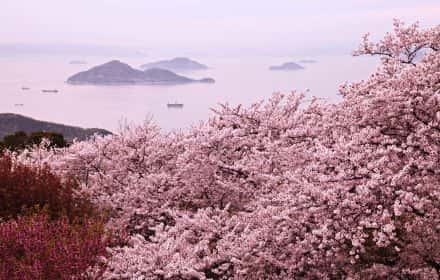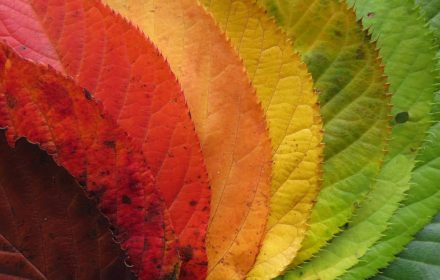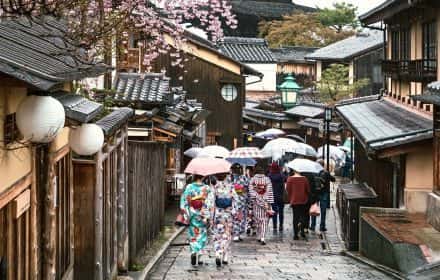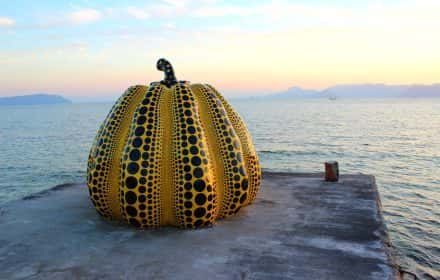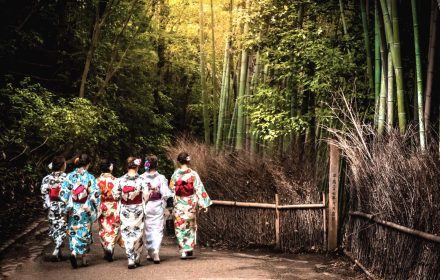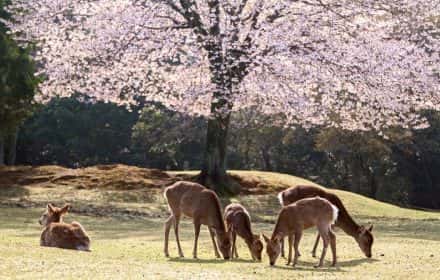This site uses affiliate links, meaning that if you make a purchase through our links, we may earn an affiliate commission.
I have traveled around the world and can tell you there is no place like Japan anywhere in the world. If you have not visited Japan, then you need to add Japan to your travel bucket list. You will be fascinated by its history, traditions, and culture. Check out my posts about Japan in Japan Travel Guide to get inspired!
The quote by Roman Coppola describes Japan in the best possible way: “Japan is the most intoxicating place for me. The Japanese culture fascinates me: the food, the dress, the manners, and the traditions. It’s the travel experience that has moved me the most.”
To celebrate Japan, Land of the Rising Sun, here is a list of famous, most profound, funny quotes about Japan, Japanese culture, nature, food, anime, and most insightful Japanese proverbs.
Autumn in Japan with Mount Fuji at Dawn / Quotes About Japan
- 1. Famous Quotes About Japan
- 2. Quotes About Japan And Nature
- 3. Quotes About Japanese Culture
- 4. Quotes and Captions and Japan and Religion
- 5. Best Quotes About Japan and Life
- 6. Famous Anime Quotes
- 7. Kyoto Quotes and Captions
- 8. Japanese Proverbs and Sayings
- 9. Quotes About Japan and Sakura (Cherry Blossoms)
- 10. Quotes About Travel to Japan
- 11. Tokyo Quotes and Captions
- 12. Japan Captions
- 13. Quotes About Japanese Women
- 14. Funny Quotes About Japan
- 15. Bushido - Quotes About the Code of Honor and Morals Developed by Samurai
- 16. Quotes About Japan and Food
- 17. Intrepid Scout's Favorite Quotes and Captions About Japan
Famous Quotes About Japan
1. “One glass of water doesn’t equal another. One may just appease the thirst, the other you may enjoy thoroughly. In Japan, people know about this difference.” — Jil Sander
2. “One thing living in Japan did for me was to make me feel that what is left out of a work of art is as important as, if not more important than, what is put in.” — Katherine Paterson
3. “Japan is the most intoxicating place for me. The Japanese culture fascinates me: the food, the dress, the manners and the traditions. It’s the travel experience that has moved me the most.” — Roman Coppola
4. “Japan’s very interesting. Some people think it copies things. I don’t think that anymore. I think what they do is reinvent things. They will get something that’s already been invented and study it until they thoroughly understand it. In some cases, they understand it better than the original inventor.” — Steve Jobs
5. “What do Japanese artisans, engineers, Zen philosophy, and cuisine have in common? Simplicity and attention to detail.” — Hector Garcia
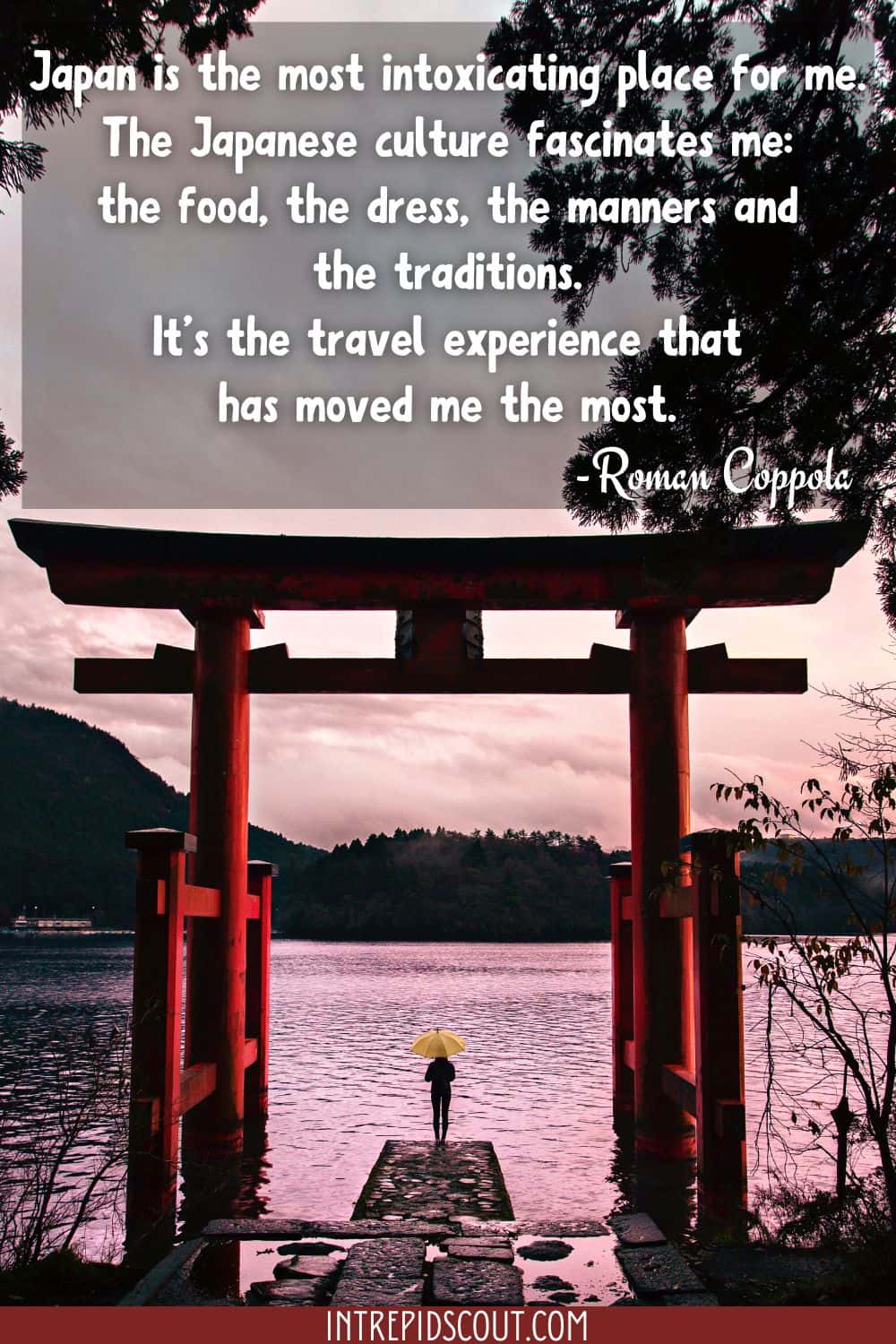
Hakone / You Might Like: One Day in Hakone on a Day Trip from Tokyo / Famous Quotes About Japan
6. “In Japanese, Ikigai is written by combining the symbols that mean “life” with “to be worthwhile.” — Hector Garcia
7. “There’s an ancient saying in Japan, that life is like walking from one side of infinite darkness to another, on a bridge of dreams. They say that we’re all crossing the bridge of dreams together. That there’s nothing more than that. Just us, on the bridge of dreams.” — Matthew Tobin Anderson
8. “The Japanese see self-assertion as immoral and self-sacrifice is the sensible course to take in Life.” — Akira Kurosawa
9. “In Japanese, we have a word for those feelings that are too deep for words: Yugen. Yugen gives us a profound sense of the beauty and mystery of the universe.” — Dr Qing Li
10. “The whole of Japan is a pure invention. There is no such country, there are no such people. The Japanese people are simply a mode of style, an exquisite fancy of art.” — Oscar Wilde
11. “Many Japanese people never really retire—they keep doing what they love for as long as their health allows.” — Hector Garcia
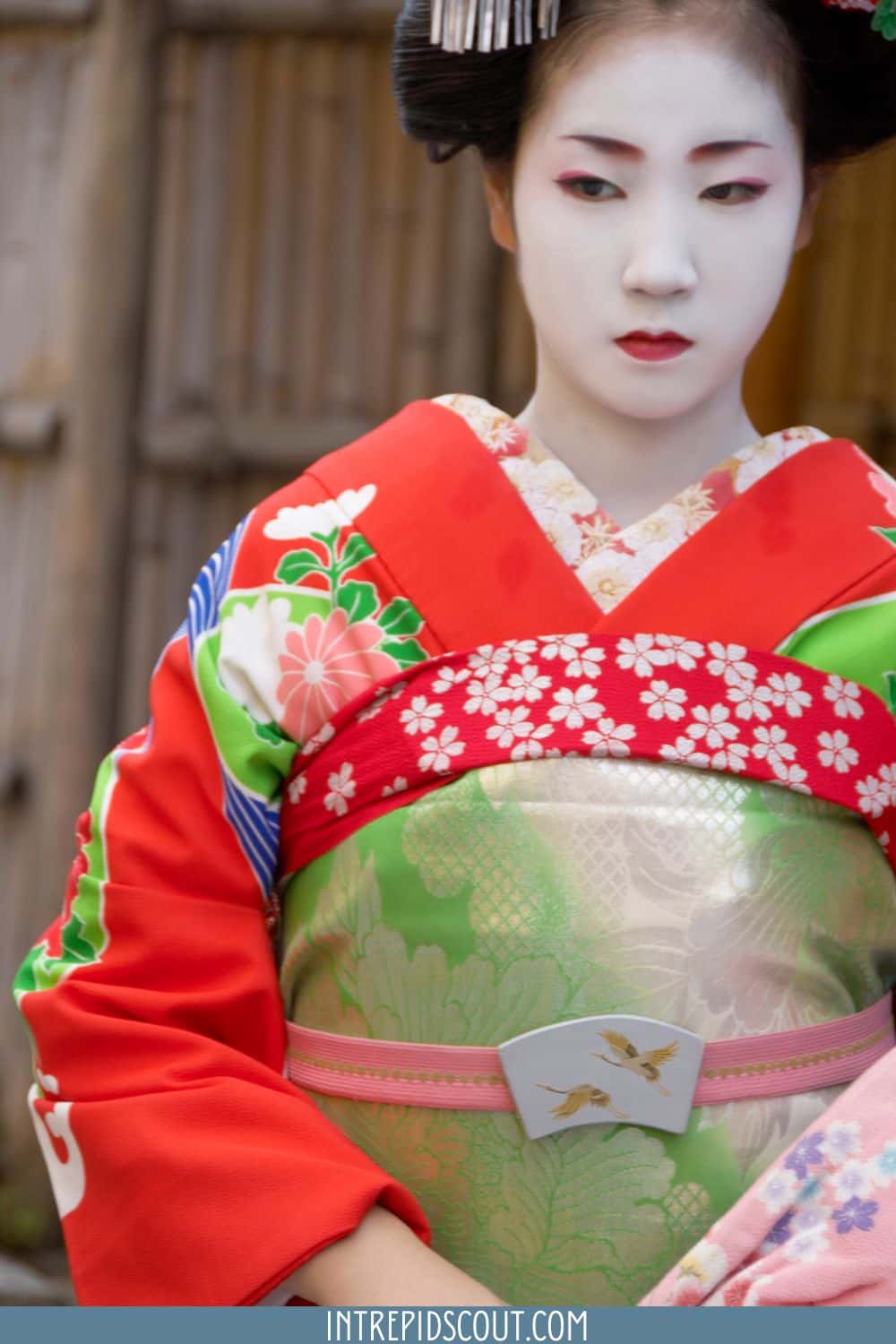
12. “In Japan, a number of time-honored everyday activities (such as making tea, arranging flowers, and writing) have traditionally been deeply examined by their proponents. Students study how to make tea, perform martial arts, or write with a brush in the most skillful way possible to express themselves with maximum efficiency and minimum strain. Through this efficient, adroit, and creative performance, they arrive at art. But if they continue to delve even more deeply into their art, they discover principles that are truly universal, principles relating to life itself. Then, the art of brush writing becomes shodo—the “Way of the brush”—while the art of arranging flowers is elevated to the status of kado—the “Way of flowers.” Through these Ways or Do forms, the Japanese have sought to realize the Way of living itself. They have approached the universal through the particular.” — H.E. Davey
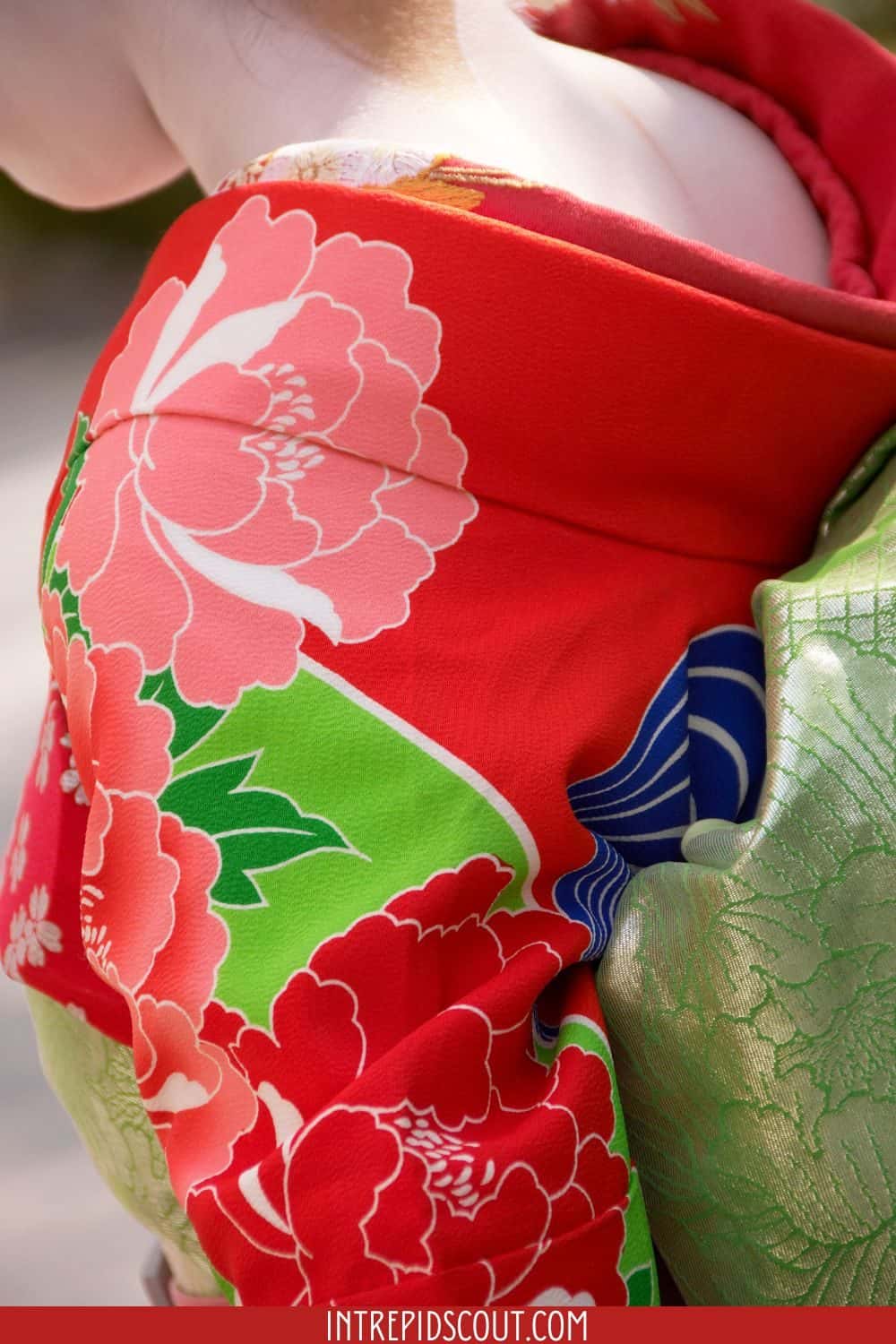
12. “In Japan, a number of time-honored everyday activities (such as making tea, arranging flowers, and writing) have traditionally been deeply examined by their proponents. Students study how to make tea, perform martial arts, or write with a brush in the most skillful way possible to express themselves with maximum efficiency and minimum strain. Through this efficient, adroit, and creative performance, they arrive at art. But if they continue to delve even more deeply into their art, they discover principles that are truly universal, principles relating to life itself. Then, the art of brush writing becomes shodo—the “Way of the brush”—while the art of arranging flowers is elevated to the status of kado—the “Way of flowers.” Through these Ways or Do forms, the Japanese have sought to realize the Way of living itself. They have approached the universal through the particular.” — H.E. Davey
13. “In Japan, and to some degree other Asian countries, people have historically focused mental strength in the hara (abdomen) as a way of realizing their full potential. Japan has traditionally viewed the hara as the vital center of humanity in a manner not dissimilar to the Western view of the heart or brain. I once read that years ago Japanese children were asked to point to the origin of thoughts and feelings. They inevitably pointed toward the abdominal region. When the same question was asked of American children, most pointed at their heads or hearts. Likewise, Japan and the West have commonly held differing views of what is physical power or physical health, with Japan emphasizing the strength of the waist and lower body and Western people admiring upper body power. (Consider the ideal of the sumo wrestler versus the V-shaped Western bodybuilder with a narrow waist and broad shoulders.)
However, East and West also hold similar viewpoints regarding the hara, and we’re perhaps not as dissimilar as some might imagine. For instance, hara ga nai hito describes a cowardly person, “a person with no hara.” Sounds similar to our saying that so-and-so “has no guts,” doesn’t it?” — H.E. Davey
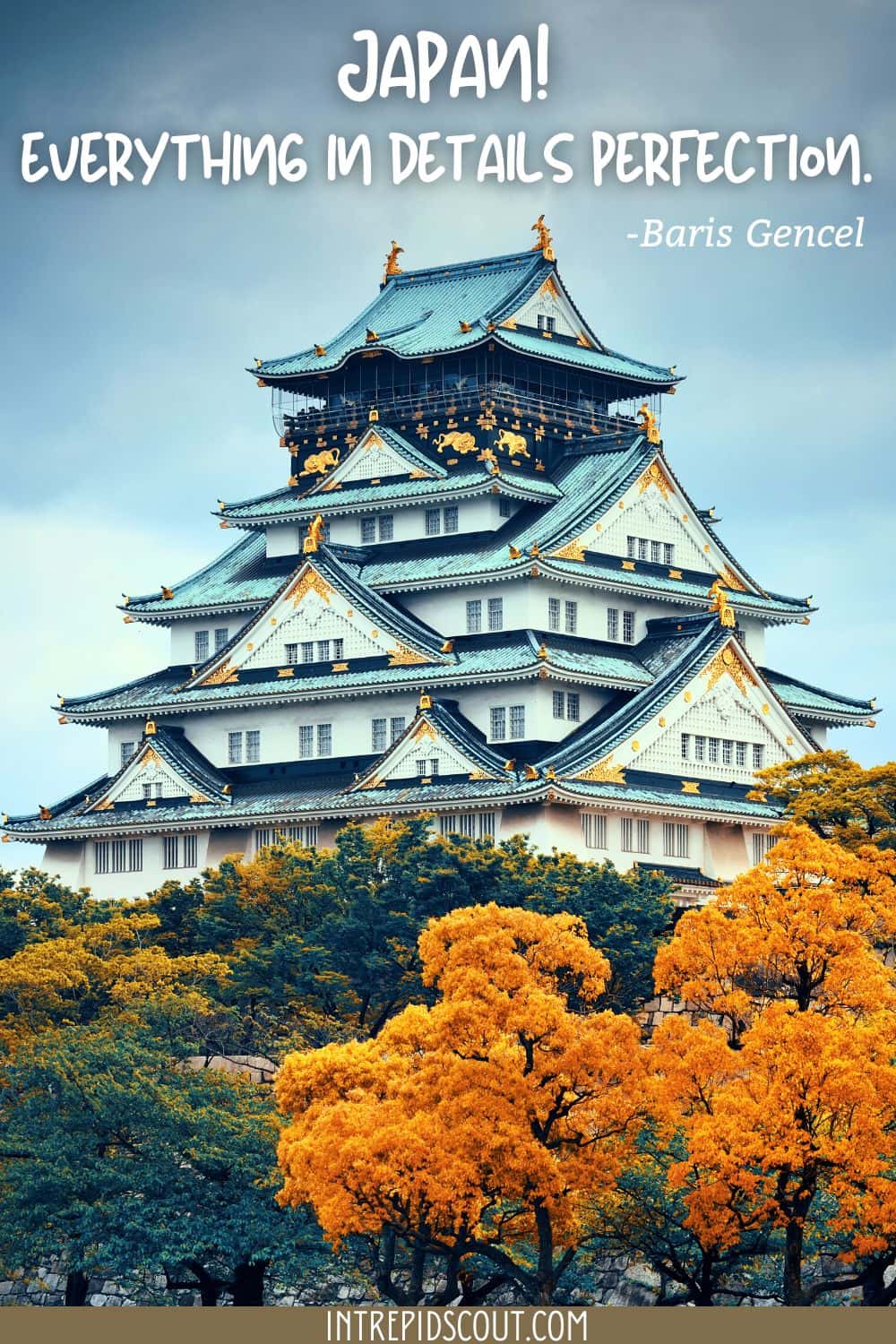
Osaka Castle / You Might Like: What to See at OSAKA CASTLE (5 Amazing Things You Can’t Miss) / Famous Quotes About Japan
14. “But if you ask what this spirit is;
They give that cough and say;
‘The Spirit of Japan is the Japanese Spirit,’
Then they walk away;
And when they’ve walked ten yards or so;
They clear their throats of phlegm;
And that clearing sound is the Japanese spirit;
Manifest in them.” — Natsume Sōseki
15. “We Orientals tend to seek our satisfactions in whatever surroundings we happen to find ourselves, to content ourselves with things as they are; and so darkness causes us no discontent, we resign ourselves to it as inevitable. If light is scarce, then light is scarce; we will immerse ourselves in the darkness and there discover its own particular beauty. But the progressive Westerner is determined always to better his lot. From candle to oil lamp, oil lamp to gaslight, gaslight to electric light—his quest for a brighter light never ceases, he spares no pains to eradicate even the minutest shadow.” — Junichirō Tanizaki
16. “One must learn, if one is to see the beauty in Japan, to like an extraordinarily restrained and delicate loveliness.” — Mary Ritter Beard
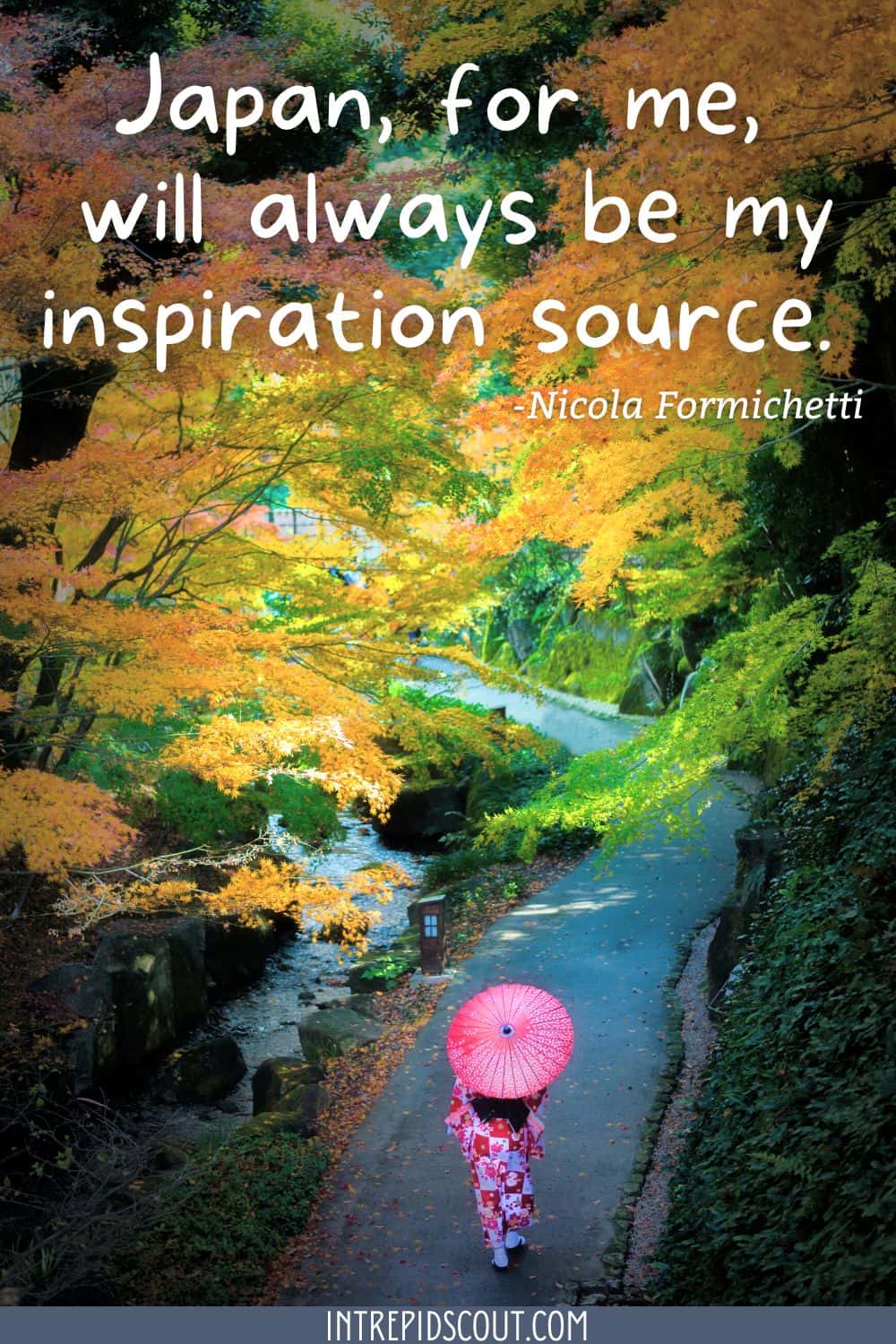
Quotes About Japan And Nature
17. “When you look at Japanese traditional architecture, you have to look at Japanese culture and its relationship with nature. You can actually live in a harmonious, close contact with nature – this very unique to Japan.” — Tadao Ando
18. “Above a certain size and level of prosperity, regional cities in Japan look alike. To discover what makes each one different, one has to sample the food and the sake, and stay long enough to see the patterns of life under the surface. Otherwise it can be hard to tell them apart. Wealth tends to smooth out the differences in the way people live. Life becomes standardized.
Only in nature, in the mountains and valleys beyond the hand of man, are the real differences, the real uniqueness, preserved. There is something about the air in Hokkaido, a kind of richness that will never change. For better or worse, the only thing that really changes is people.” — Miyuki Miyabe
19. “I love Mount Fuji and I think it is my love of the mountains in Japan that led me to seek other mountains around the world.” — Tamae Watanabe
20. “The Japanese are a forest civilization. Their culture, philosophy and religion are carved out of the forests that blanket the country – not to mention all manner of everyday things, from houses and shrines to walking sticks and spoons.” — Dr Qing Li
21. “Experience nature, and in doing so learn about yourself.” — Japanese Proverb
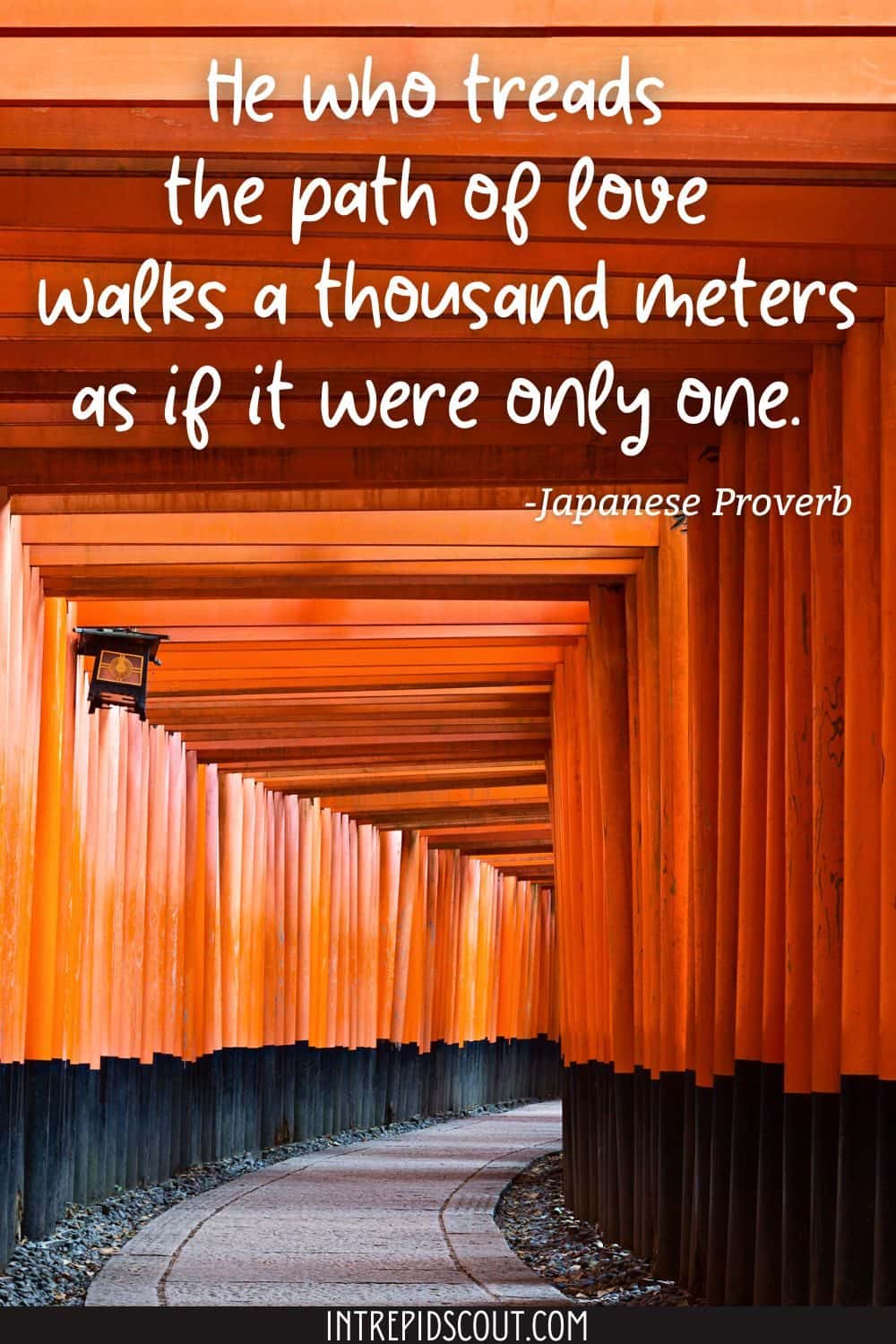
Fushimi Inari in Kyoto / You Might Like: Amazing FUSHIMI INARI TAISHA in Kyoto (8 Things to Know Before You Visit) / Quotes About Japan
22. “Japan, not only a mega-busy city that thrives on electronics and efficiency, actually has an almost sacred appreciation of nature. One must travel outside of Tokyo to truly experience the ‘old Japan’ and more importantly feel these aspects of Japanese culture.” — Apolo Ohno
23. “You know, when people familiar with the mountains enter the wilds, they often look for a branch that stands out, break it to mark their tracks. It’s useful on the way back. It’s called a shiori, a folded branch, just like the word for bookmark. It is written differently but is pronounced the same.” — Kanji Hanawa
24. “But like so many things in Japan, behind the façade lay another view. So it was only after I had hiked into the woods far from the bridge that I found a fluttering world of persimmon, ocher, scarlet, and cabernet secreted away in a mossy garden of curving stone paths. When it began to rain, the colors deepened and the leaves, shaped like a baby’s hands, spiraled down onto the plush green carpet and sleek dark rocks.” — Victoria Abbott Riccardi
25. “Beauty and health without medicine or cosmetics – no wonder onsen bathing is so popular. In Europe as well as Japan, hot springs are known as ‘the foundations of youth’ because of their abilities to rejuvenate and restore.” — Dr Qing Li
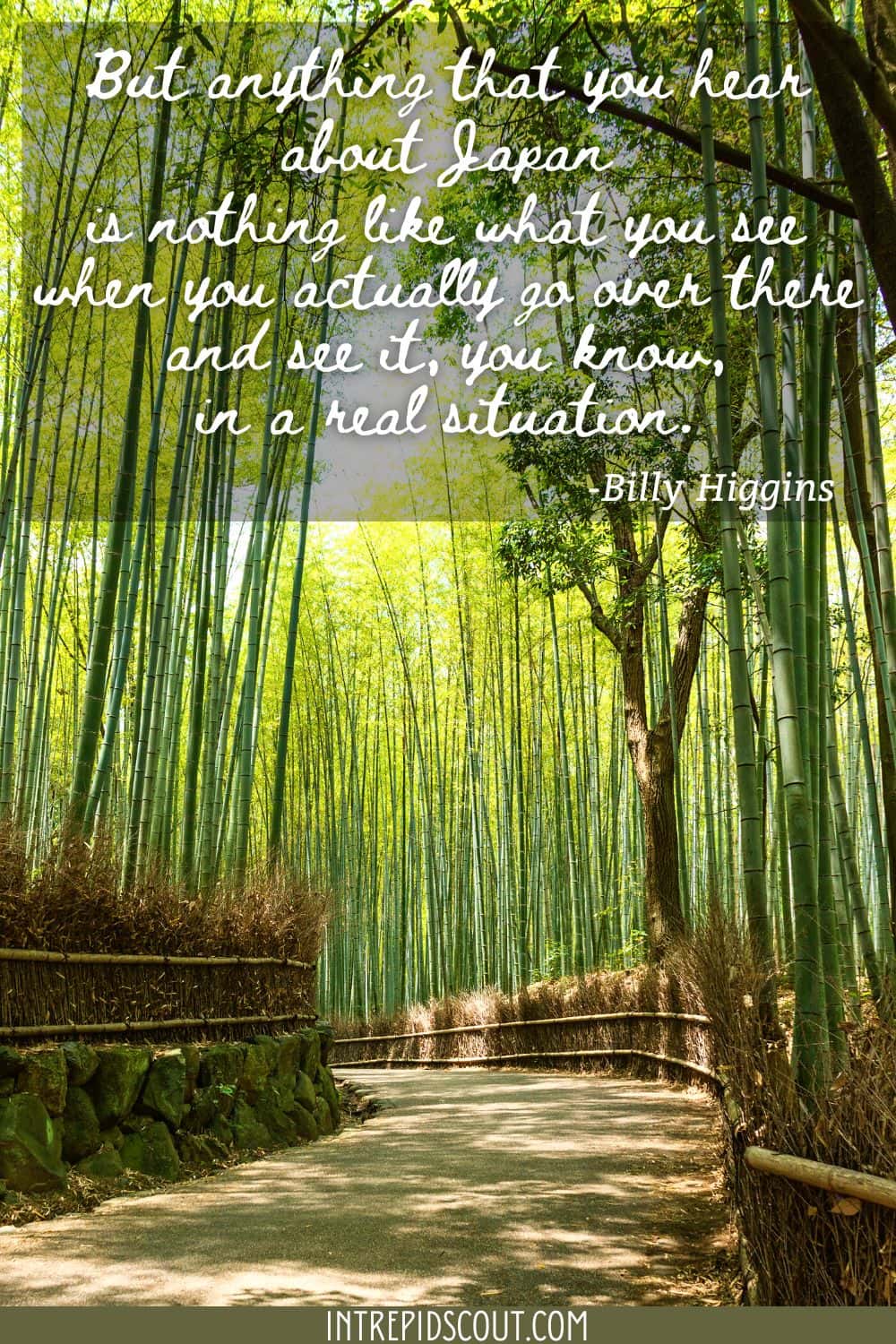
Arashiyama in Kyoto / You Might Like: 14 Amazing THINGS to DO in ARASHIYAMA, Kyoto (Map+Useful Tips) / Quotes About Japan and Nature
Quotes About Japanese Culture
26. “Japan likewise put her hopes of victory on a different basis from that prevalent in the United States. (…) Even when she was winning, her civilian statesmen, her High Command, and her soldiers repeated that this was no contest between armaments; it was pitting of our faith in things against their faith in spirit.” — Ruth Benedict
27. “In traditional Japanese Aesthetics, Wabi-Sabi is a world view centred on the acceptance of transience and imperfection. The Aesthetic is sometimes described as one of beauty that is imperfect, impermanent and incomplete.” — Unknown
28. “The neck is kind of what’s sexy in Japan, so you have to have the kimono a little bit back. It was just a whole different way of appealing to what was sexy.” — Lucy Liu
29. “Shinju in Japanese literally means “inside the heart.” More fully, it implies that if the heart were cut open, there would be found only devotion to one’s lover; thus, “revealing-the-heart death.” — Jack Seward
30. “The only difference between having an affair here and having an affair there was that the Americans have not seen ways ended up losing half of his estates over a woman he was infatuated just as much as the next tramp who would come his way, while Japanese men would only earn more respect from their subordinates through the possession of much younger women, as a sign of prowess and affluence, while their wives at home, as if there were rule books distributed nationally on the “proper” marriage etiquette for all young Japanese women to read before they enter into the matrimony, would turn a blind eye on their disloyalty quietly.” — Vann Chow
31. “Japan never considers time together as time wasted. Rather, it is time invested.” — Donald Richie
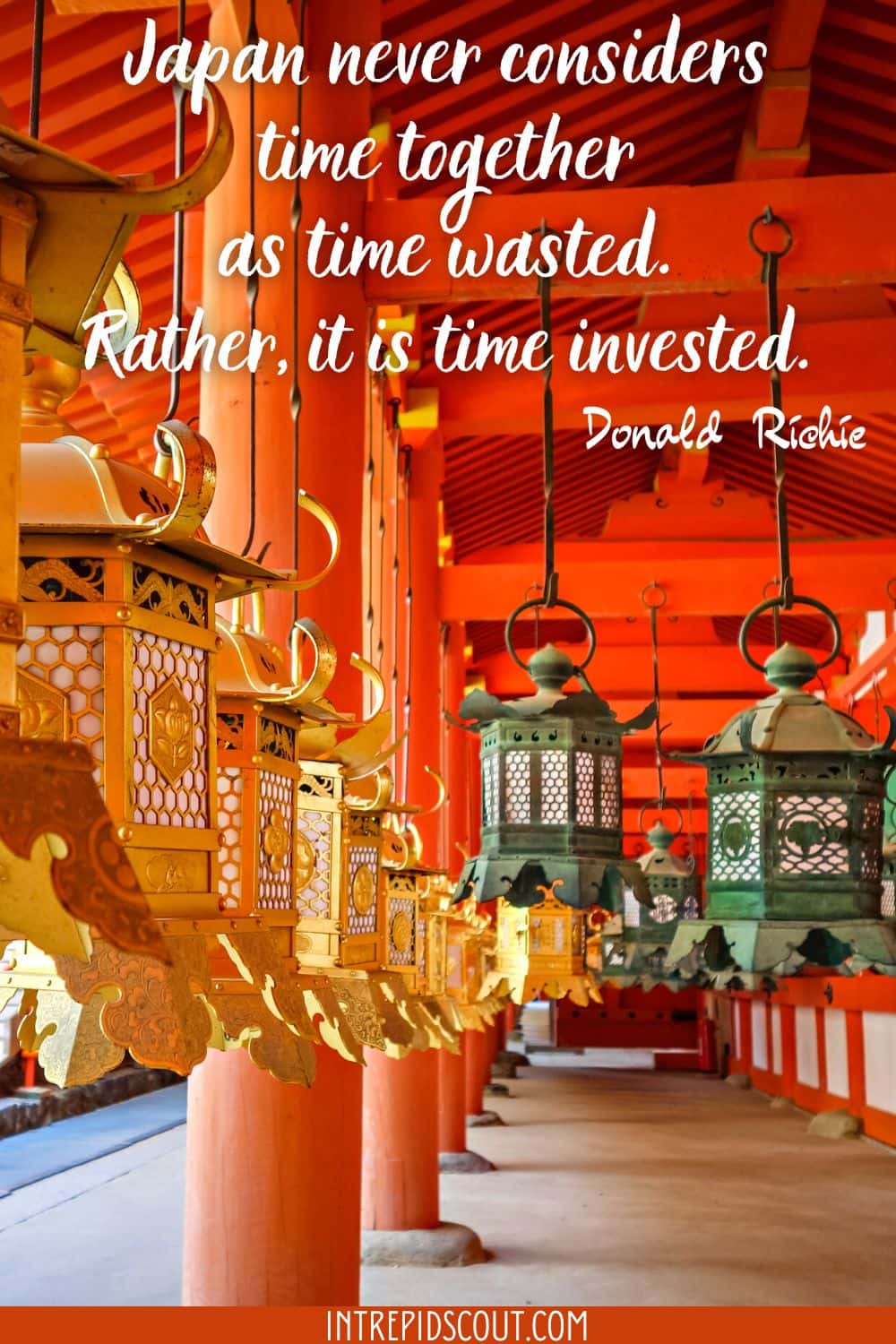
Kasuga Taisha in Nara / You Might Like: Stunning KASUGA TAISHA SHRINE in NARA (7 Best Things to See) / Quotes About Japan
32. “Three things matter in life – sumo, business, and war. Understand one, you know them all. But why should Geisha care? You spend your time plucking strings and dancing.” — Arthur Golden
33. “Why has pachinko swept Japan? It can hardly be the excitement of gambling, since the risks and rewards are so small. During the hours spent in front of a pachinko machine, there is an almost total lack of stimulation other than the occasional rush of ball bearings. There is no thought, no movement; you have no control over the flow of balls, apart from holding a little lever which shoots them up to the top of the machine; you sit there enveloped in a cloud of heavy cigarette smoke, semi-dazed by the racket of millions of ball bearings falling through machines around you. Pachinko verges on sensory deprivation. It is the ultimate mental numbing, the final victory of the educational system.” — Alex Kerr
34. “In Japanese culture, there is a belief that God is everywhere – In mountains, trees, rocks, even in our sympathy for robots or hello kitty toys.” — Ryuichi Sakamoto
35. “If you are a Westerner and you spend enough time in Japan—and you speak Japanese—you will eventually be told that you cannot truly understand the Japanese. Only the Japanese can understand themselves.” — Marie Mutsuki Mockett
36. “One of the things I discovered in Japan was from watching sumo wrestling. In the end, you can never tell who has won the fight, and who has lost because they do not show their emotion because it could embarrass the loser. It is unbelievable. That is why I try to teach my team politeness. It is only here in England that everybody pokes their tongue out when they win.” — Arsene Wenger
37. “Japanese are one of the most punctual people he had ever worked with. They could, he imagined, put the Germans to shame in their high expectation for timeliness.” – Vann Chow
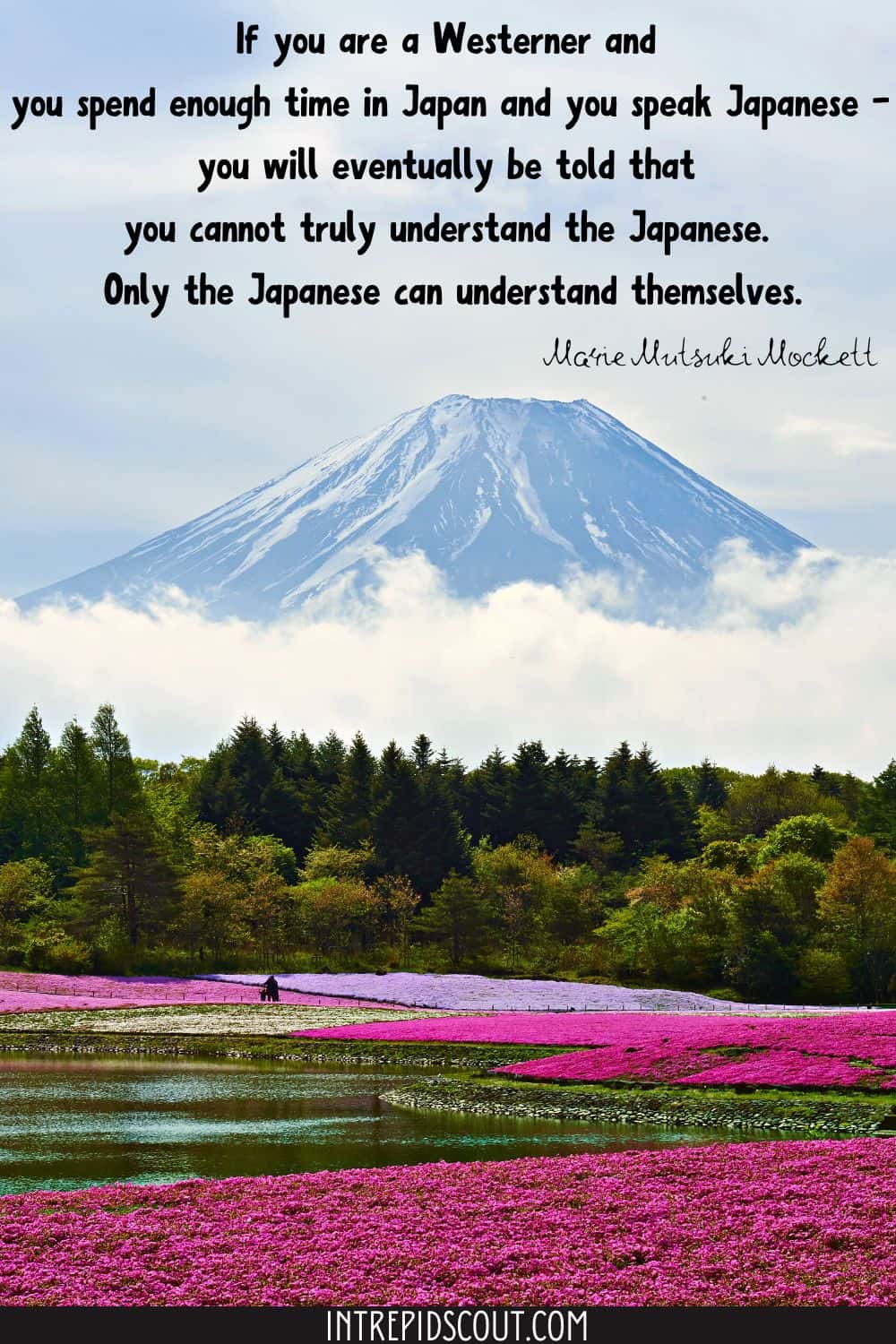
38. “It is not for Geisha to want. It is not for Geisha to feel. Geisha is an artist of the floating world. She dances. She sings. She entertains you. Whatever you want. The rest is shadows. The rest is secret.” — Arthur Golden
39. “Whereas in the west, individuality and drive are considered positive qualities, they have not seen the same way, in Japan. In that country, if you are too much of a rugged individualist, it might actually indicate that you are a weak, unreliable character and that you are selfish, in a childish, willful kind of way.” — Alexei Maxim Russell
40. “What they have done in Japan, which I find so inspirational, is they’ve brought the toilet out from behind the locked door. They’ve made it conversational. People go out and upgrade their toilet. They talk about it. They’ve sanitized it.” — Rose George
41. “There is an expression in Japanese that says that someone who makes things of poor quality is in fact worse than a thief because he doesn’t make things that will last or provide true satisfaction. A thief at least redistributes the wealth of a society.” — Andrew Juniper
42. “At this point, I came across one of the vending machines that only Japan has. I have to admit that I love the whimsical items sold in such appliances, like all sorts of junk food, beer cans, whisky bottles and even underwear. This particular machine sold both whisky and underwear, which truly is a bizarre combination, or maybe not, considering all the underwear were female panties. It was, therefore, my theory that older men would come by and buy the whisky, and then when they were drunk and young women passed by, the men would then offer them panties as gifts for sexual favours. Ya, it all made perfect sense to me.” ― Andrew James Pritchard
43. “When doing business in Japan, process, manners, and how you work on something is more important than the final results.” — Hector Garcia
44. “In Japan, and to some degree other Asian countries, people have historically focused mental strength in the hara (abdomen) as a way of realizing their full potential. Japan has traditionally viewed the hara as the vital center of humanity in a manner not dissimilar to the Western view of the heart or brain. I once read that years ago Japanese children were asked to point to the origin of thoughts and feelings. They inevitably pointed toward the abdominal region. When the same question was asked of American children, most pointed at their heads or hearts. Likewise, Japan and the West have commonly held differing views of what is physical power or physical health, with Japan emphasizing the strength of the waist and lower body and Western people admiring upper body power. (Consider the ideal of the sumo wrestler versus the V-shaped Western bodybuilder with a narrow waist and broad shoulders.)
However, East and West also hold similar viewpoints regarding the hara, and we’re perhaps not as dissimilar as some might imagine. For instance, hara ga nai hito describes a cowardly person, “a person with no hara.” Sounds similar to our saying that so-and-so “has no guts,” doesn’t it?” – H.E. Davey
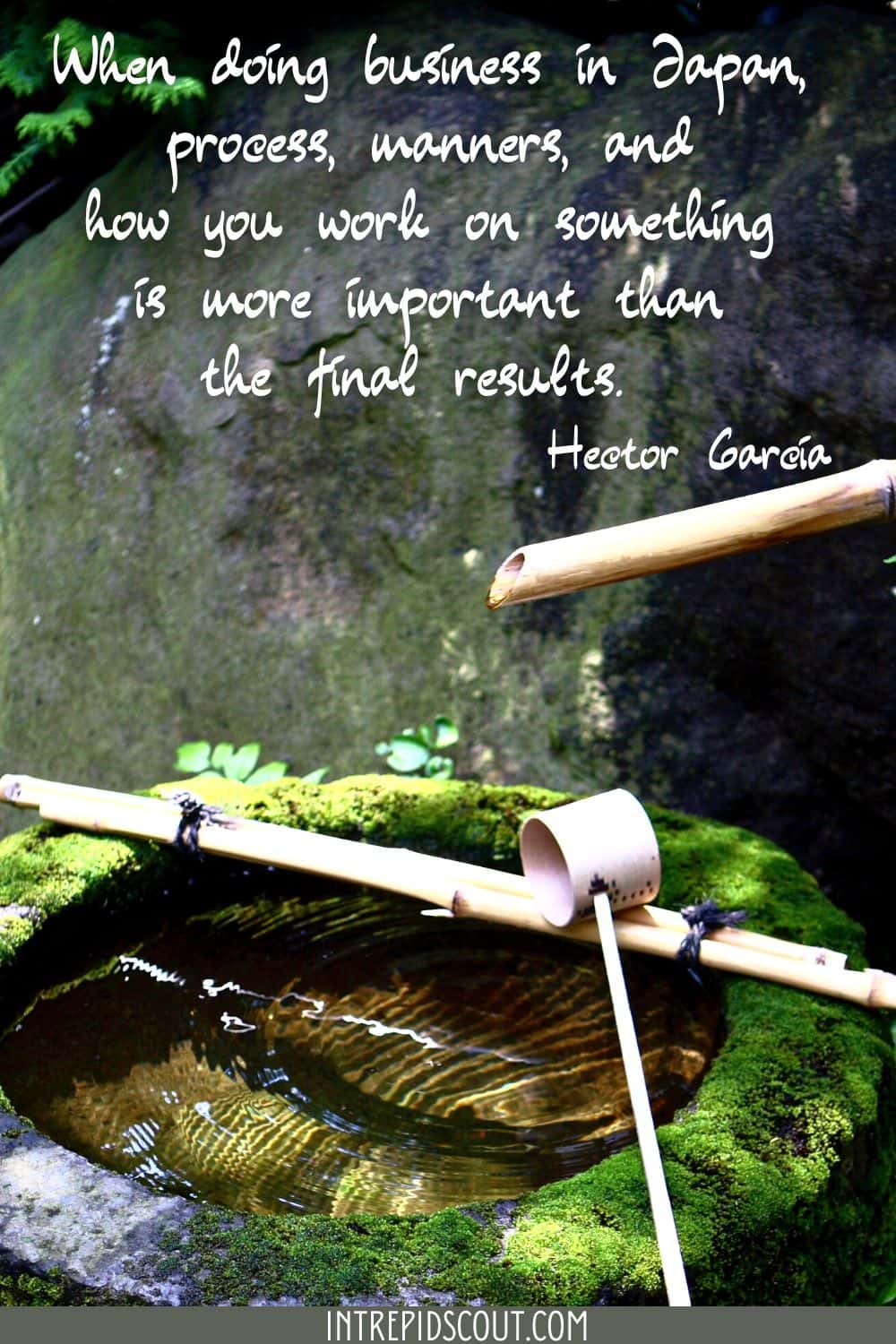
45. “Bathing just once in this hot spring in Shimane prefecture in Tamatsukuri will clear your skin, and continued bathing will cure all your aches and pains. Given such positive results without exception since long ago, people call it the water of the gods.” — Izumi no Kuni Fudoki
46. “In Japan, food filters into every aspect of the culture.” — Bee Wilson
47. “In Japan, we have the phrase, “Shoshin,” which means “beginner’s mind.” Our “original mind” includes everything within itself. It is always rich and sufficient within itself. This does not mean a closed mind, but actually an empty mind and a ready mind. If your mind is empty, it is always ready for anything. It is open to everything. In the beginner’s mind, there are many possibilities; in the expert’s mind there are few.” — Shunryu Suzuki
48. “It’s a saying they have, that a man has a false heart in his mouth for the world to see, another in his breast to show to his special friends and his family, and the real one, the true one, the secret one, which is never known to anyone except to himself alone, hidden only God knows where.” — James Clavell
49. “There’s nothing in Chinese culture that is equivalent of the geisha. It’s so different, so special to Japan.” — Zhang Ziyi
50. “Japan is quite weird because they wait for you to say something before they respond. You can literally hear a pin drop, they don’t make a sound until you say something to the crowd.” — Kelly Jones
51. “It is often said that the Japanese are extremely clean at home, or inside any house or office, but dirty and untidy outside. ‘Go and look at a railway station,’ I was told, ‘and you’ll be horrified.’ I went and was horrified; horrified by the cleanliness of the place.” — George Mikes
52. “Although there is no precise word for it in Japanese, a sort of “vicarious seppuku” was practiced during the Sengoku Jidai (The Era of Warfare) with the aim of saving the lives of many by the sacrifice of one life, often that of the most responsible person. For example, when Hideyoshi was warring with Mori Motonari, he decided to try to effect a reconciliation with the latter. At that time, Hideyoshi had under siege one of Mori’s castles, which was commanded by Shimizu Muneharu. Hideyoshi offered to spare the rest of the garrison if Lord Mori would have Shimizu commit seppuku, to which Mori agreed.
Connected to this episode is a moving example of junshi: On the eve of Shimizu’s seppuku, his favorite vassal Shirai sent a request that Shimizu visit his room. When Shimizu arrived, Shirai apologized for having his master visit his humble quarters and explained that he had wanted to reassure his master that seppuku was not difficult and that he, Shimizu, should not be concerned about what he would have to do on the morrow. So saying, Shirai bared his abdomen to show that he himself had completed the act of seppuku only a moment before Shimizu’s arrival. Shimizu gave Shirai his deepest thanks for his loyal devotion and assisted him in kaishaku, i.e., he beheaded him with his sword.” — Jack Seward
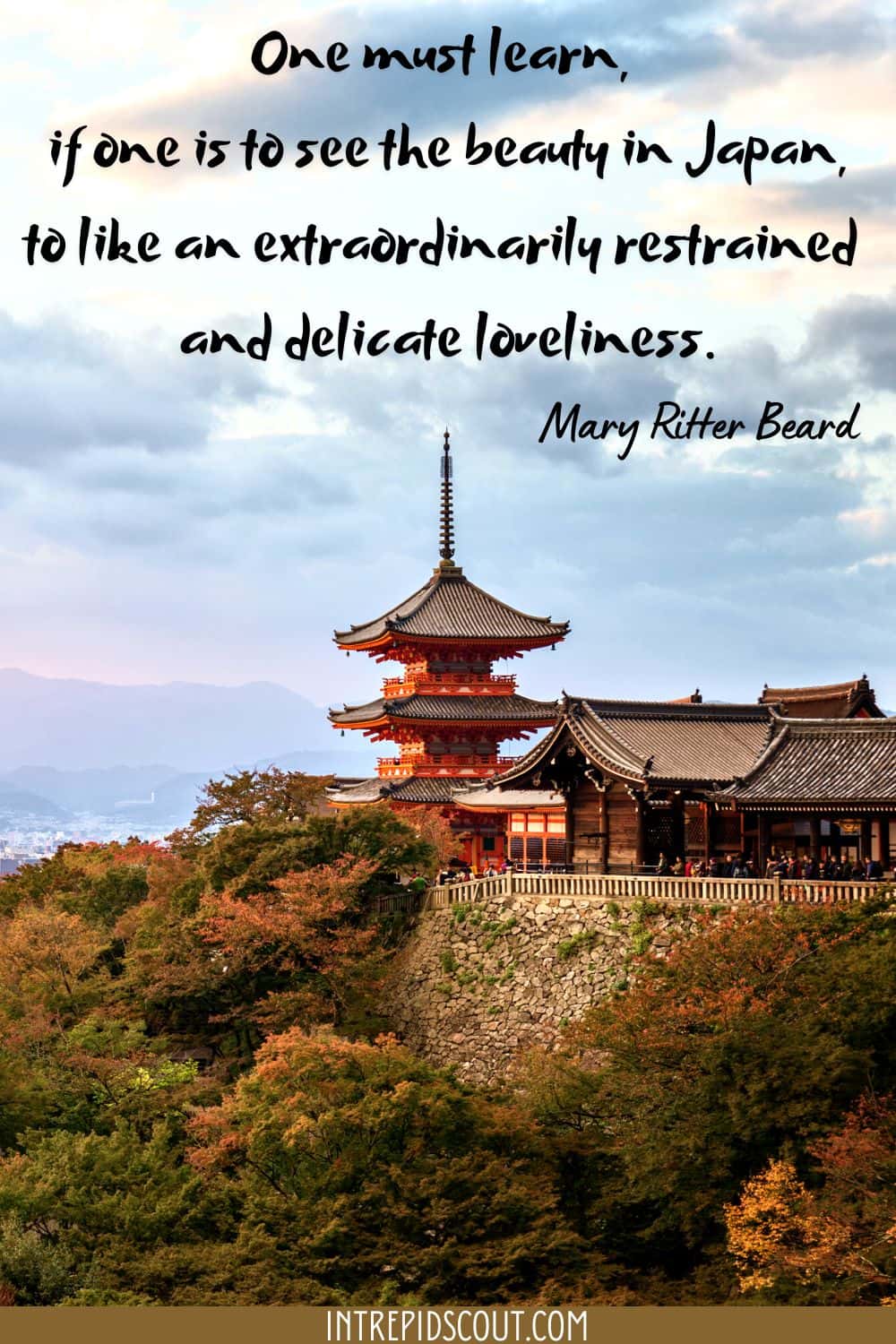
Kiyomizudera in Kyoto / You Might Like: 8 THINGS You Can’t Miss – Perfect 2 DAYS in KYOTO / Quotes About Japan
53. “In Paris the cashiers sit rather than stand. They run your goods over a scanner, tally up the price, and then ask you for exact change. The story they give is that there aren’t enough euros to go around. “The entire EU is short on coins.”
And I say, “Really?” because there are plenty of them in Germany. I’m never asked for exact change in Spain or Holland or Italy, so I think the real problem lies with the Parisian cashiers, who are, in a word, lazy. Here in Tokyo they’re not just hard working but almost violently cheerful. Down at the Peacock, the change flows like tap water. The women behind the registers bow to you, and I don’t mean that they lower their heads a little, the way you might if passing someone on the street. These cashiers press their hands together and bend from the waist. Then they say what sounds to me like “We, the people of this store, worship you as we might a god.” — David Sedaris
54. “Japan is a startling clash of the deeply traditional and the spiritual. The intensely current and the superficial. It’s ancient, but futuristic. Conservative, yet hedonistic. Sleek skyscrapers graze the clouds like trees seeking sun in a man-made rainforest. Their concrete foundations often fertilized by the bodies of locals run afoul of the yakuza. It’s a homogenous island nation with a quaint surface and a Twin Peaks underbelly. The polite, insular, and eerily innocuous, living symbiotically with the perverse, extroverted, and bizarre. Fashion-forward and fashion-retarded. You could make similar generalizations about most cultures of course, but Japan’s beautiful contrasts were better than most.” — Parker Choi
55. “In Japanese swordsmanship, it is not uncommon to speak of a unity of mind, body, and sword.” — H.E. Davey
56. “Do you remember my friend Fumiko Kobayashi? She loaned me a book by a university professor named Taki Sugiyama Lebra, Japanese Patterns of Behaviour, and she writes that death, particularly voluntary death, is surrounded in this country by a heroic, romantic, aesthetic and emotional aura. She says we often find it hard to communicate and use suicide to make our ideas, or beliefs, or sufferings known. I don’t know whether I believe that or not.” — James Trager
57. “After listening to a lot of these stories, I began to think that American loneliness is a completely different creature from anything we experience in this country, and it made me glad I was born Japanese. The type of loneliness where you need to keep struggling to accept a situation is fundamentally different from the sort you know you’ll get through if you just hang in there.” — Ryū Murakami
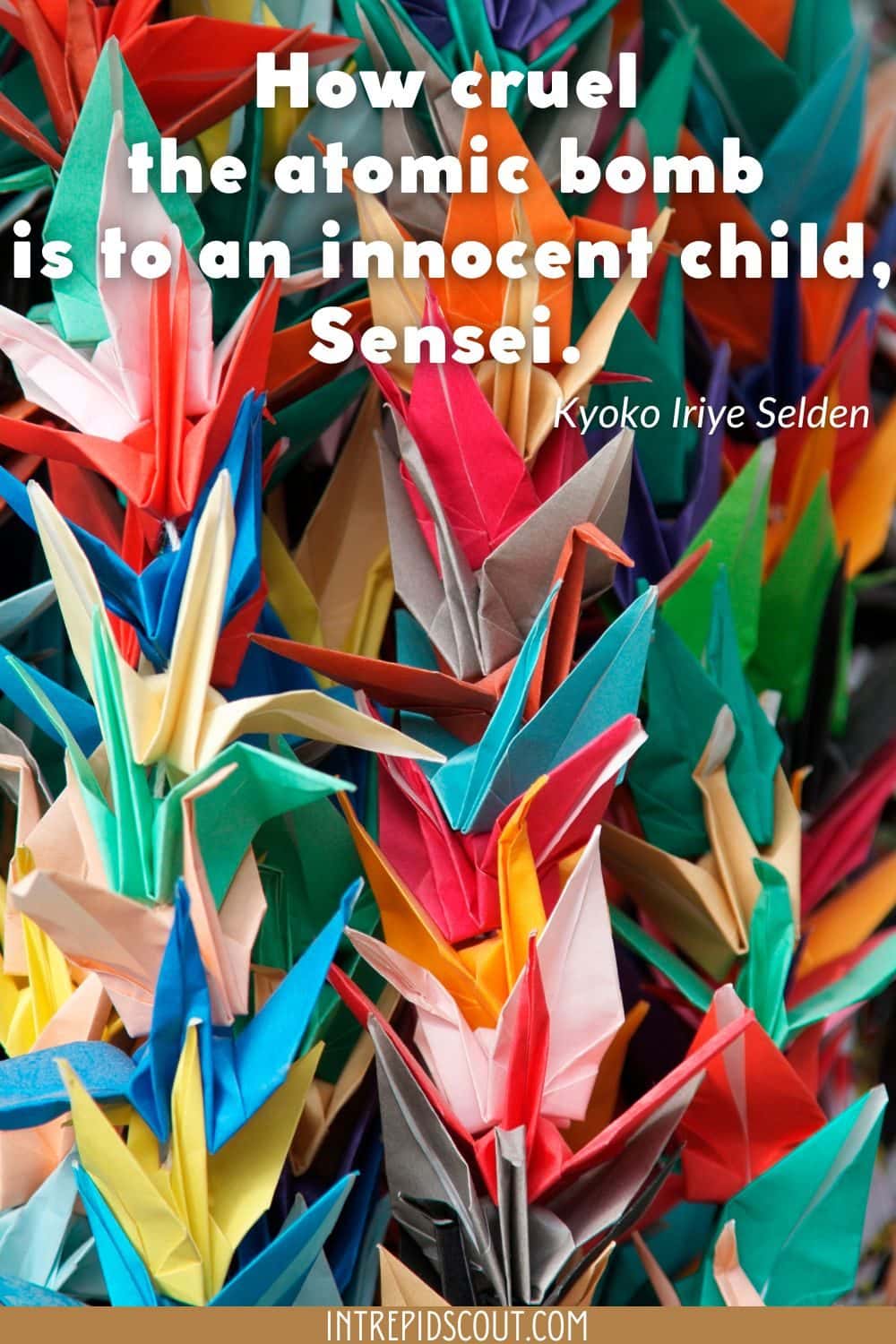
Paper Cranes in Hiroshima / You Might Like: Perfect ONE DAY in HIROSHIMA (5 Things You Can’t Miss+Useful Tips) / Quotes About Japan
Quotes and Captions and Japan and Religion
58. “The main religions in Japan – Confucianism, Buddhism, and Shintoism – are all ones in which the rituals are more important than absolute rules.” — Hector Garcia
59. “The attitude toward food has also been affected by the two great religions that the Japanese follow. The majority of Japanese participate in two religions: Shinto and Buddhism. Shinto was the sole religion of the Japanese until the sixth century. It is a religion that relies heavily on ideas of purity, as well as on the presentation of food offerings to the deities. Buddhism, which complements Shinto and deals largely with the afterlife, has two ideas that affect food choice: simplicity and a reluctance to take life. These two religious orientations, which all Japanese share to a certain degree, reinforce one another in the realm of food.” — Michael Ashkenazi
60. “I am not a new age person, but I do believe in meditation, and for that reason, I have always liked the Buddhist religion. When I have been to Japan, I have been to Buddhist temples and meditated, and I found that rewarding.” — Clint Eastwood
Best Quotes About Japan and Life
61. “I love Japan. I love the collision of the modern and ancient worlds coming together in that place. It’s so high-tech and cool.” — John Lasseter
62. “If your computer speaks English, it was probably made in Japan.” — Alan Perlis
63. “The Dojo system in Japan is very unique. It prepared me not only for wrestling in the states and around the world, but it also prepared me for how to handle myself as an adult in the real world.” — Finn Balor.
64. “One thing living in Japan did for me was to make me feel that what is left out of a work of art is as important as, if not more important than, what is put in.” — Katherine Paterson
65. “Maitake mushrooms are known in Japan as ‘the dancing mushroom.’ According to a Japanese legend, a group of Buddhist nuns and woodcutters met on a mountain trail, where they discovered a fruiting of maitake mushrooms emerging from the forest floor. Rejoicing at their discovery of this delicious mushroom, they danced to celebrate.” — Paul Stamets
66. “The Japanese have two words: “uchi” meaning inside and “soto” meaning outside. Uchi refers to their close friends, the people in their inner circle. Soto refers to anyone who is outside that circle. And how they relate and communicate to the two are drastically different. To the soto, they are still polite and they might be outgoing, on the surface, but they will keep them far away, until they are considered considerate and trustworthy enough to slip their way into the uchi category. Once you are uchi, the Japanese version of friendship is entire universes beyond the average American friendship! Uchi friends are for life. Uchi friends represent a sacred duty. A Japanese friend, who has become an uchi friend, is the one who will come to your aid, in your time of need, when all your western “friends” have turned their back and walked away.” — Alexei Maxim Russell
67. “If it has not been invented in Japan, then it has not been invented anywhere else.” — Amelia Danver
68. “The method of producing comics in Japan is very hectic, but it’s also rewarding because it’s possible to do both the story and art all by yourself. In this way, it’s possible to bring out one’s individuality. If this idea appeals to you, I call on you to try drawing your own manga.” — Akira Toriyama
69. “The recipe to an unhappy life in Japan is to want to be Japanese if you are not. Anyone who wants to penetrate the country is setting itself up for tears and disappointment.” — Pico Iyer
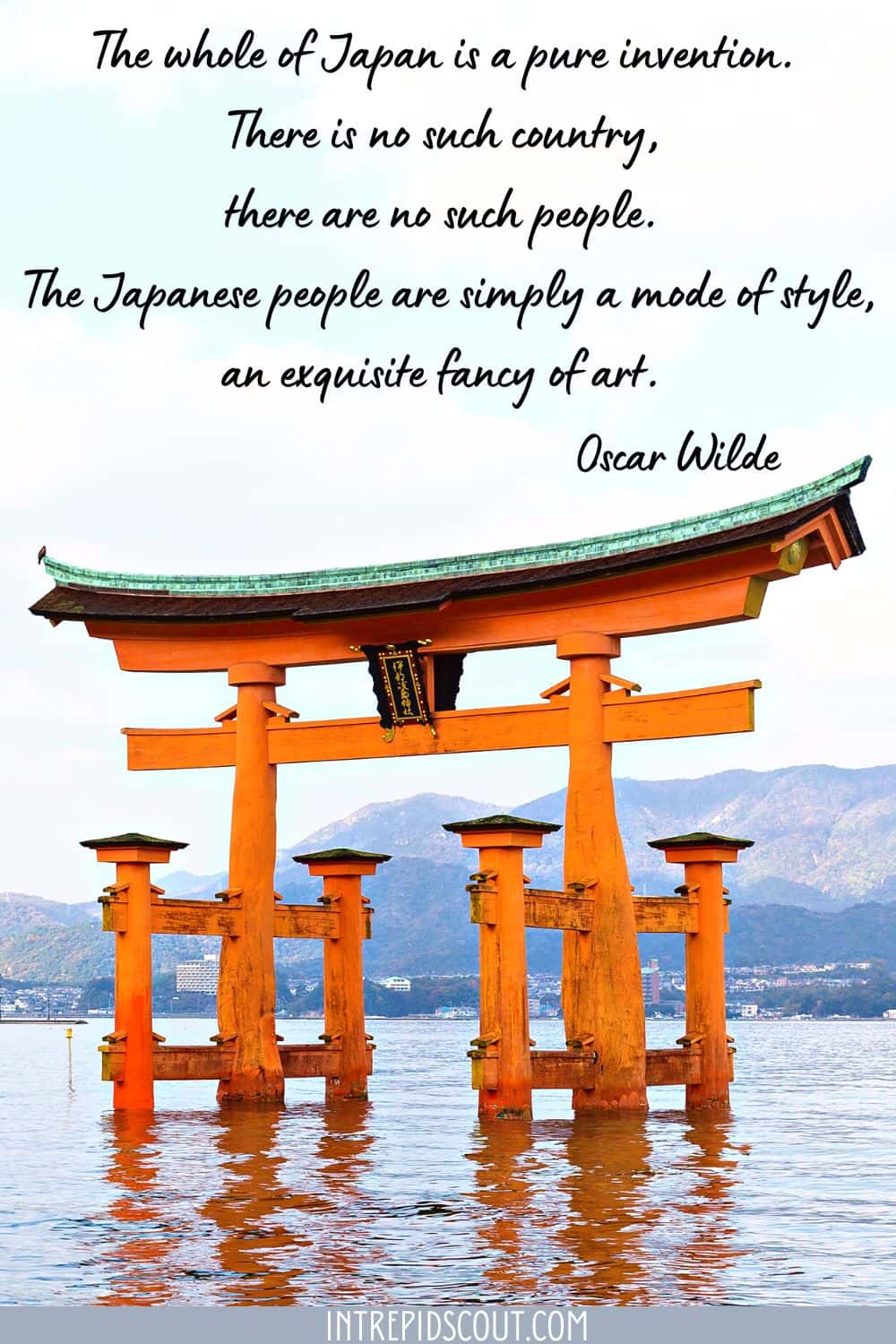
Miyajima / You Might Like: Perfect DAY TRIP to MIYAJIMA from Kyoto, Osaka, or Hiroshima (9 Things to Do) / Quotes About Japan
70. “Japan knows the horror of war and has suffered as no other nation under the cloud of nuclear disaster. Certainly, Japan can stand strong for a world of peace.” — Martin Luther King Jr
71. “One widespread stereotype about people in Japan is that they’re exceptionally dedicated and hardworking, even though some Japanese people say they look like they’re working harder than they really are. There is no doubt, though, about their ability to be completely absorbed in a task, or about their perseverance when there is a problem to be solved. One of the first words one learns when starting Japanese lessons is ganbaru, which means “to persevere” or “to stay firm by doing one’s best.” Japanese people often apply themselves to even the most basic tasks with an intensity that borders on obsession. We see this in all kinds of contexts, from the “retirees” taking meticulous care of their rice fields in the mountains of Nagano to the college students working the weekend shift in convenience stores known as kobinis. If you go to Japan, you’ll experience this attention to detail firsthand in almost every transaction.” — Hector Garcia Puigcerver
72. “Listen, Ono, Japan is no longer a backward country of peasant farmers. We are now a mighty nation, capable of matching any of the Western nations. In the Asian hemisphere, Japan stands like a giant amidst cripples and dwarfs.” — Kazuo Ishiguro
73. “I loved Japan. I used to write a lot about it when I was a child. And I always wanted to go. And it was delightful. I absolutely loved it. What a smashing place.” — Billy Connolly
74. “I miss riding those fast trains in Japan. Cause I’d never seen a train that fasts in my life.” — Ike Turner
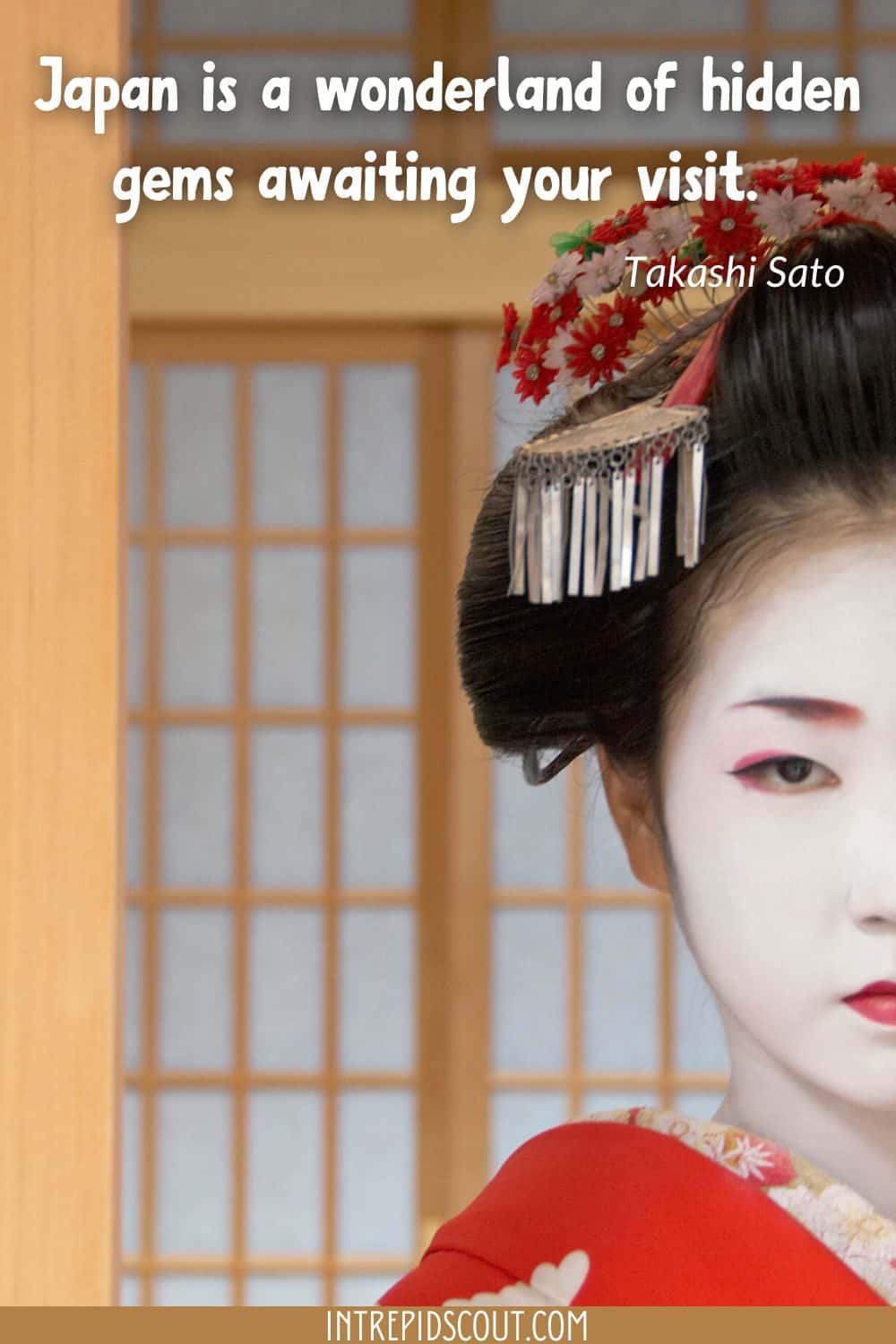
Maiko / You Might Like: Perfect ONE DAY in KANAZAWA – 7 Things to Do (BEST TRIP from Tokyo, Kyoto, or Osaka) / Quotes About Japan
75. “This may seem to labour the obvious, but in Japan, one meets intelligent people who claim that ‘logic’ is something invented in the West to allow Westerners to win discussions. Indeed, the belief is widespread that the Japanese can as happily do without logic now as they supposedly have for centuries past.” — Karel Van Wolferen
76. “A complete back tattoo, stretching from the collar of the neck down to the tailbone can take one hundred hours. Such extensive tattooing, then, became a test of strength, and the gamblers eagerly adopted the practice to show the world their courage, toughness, and masculinity. It showed, at the same time, another, more humble purpose – as a self-inflicted wound that would permanently distinguish the outcasts from the rest of the world. The tattooing marks the yakuza as misfits, forever unable or unwilling to adapt themselves to Japanese society.” — David E. Kaplan
77. “News from Japan doesn’t travel and hardly ever gets reported abroad. It is almost as if Japan’s winds do not travel far.” — Kanji Hanawa
78. “The method (of learning Japanese) recommended by experts is to be born as a Japanese baby and raised by a Japanese family, in Japan. And even then it’s not easy.” – Dave Barry
79. “Japan! everything in details perfection.” — Baris Gencel
80. “Japan learned from the bombings of Hiroshima and Nagasaki that the tragedy wrought by nuclear weapons must never be repeated and that humanity and nuclear weapons cannot coexist.” — Daisaku Ikeda
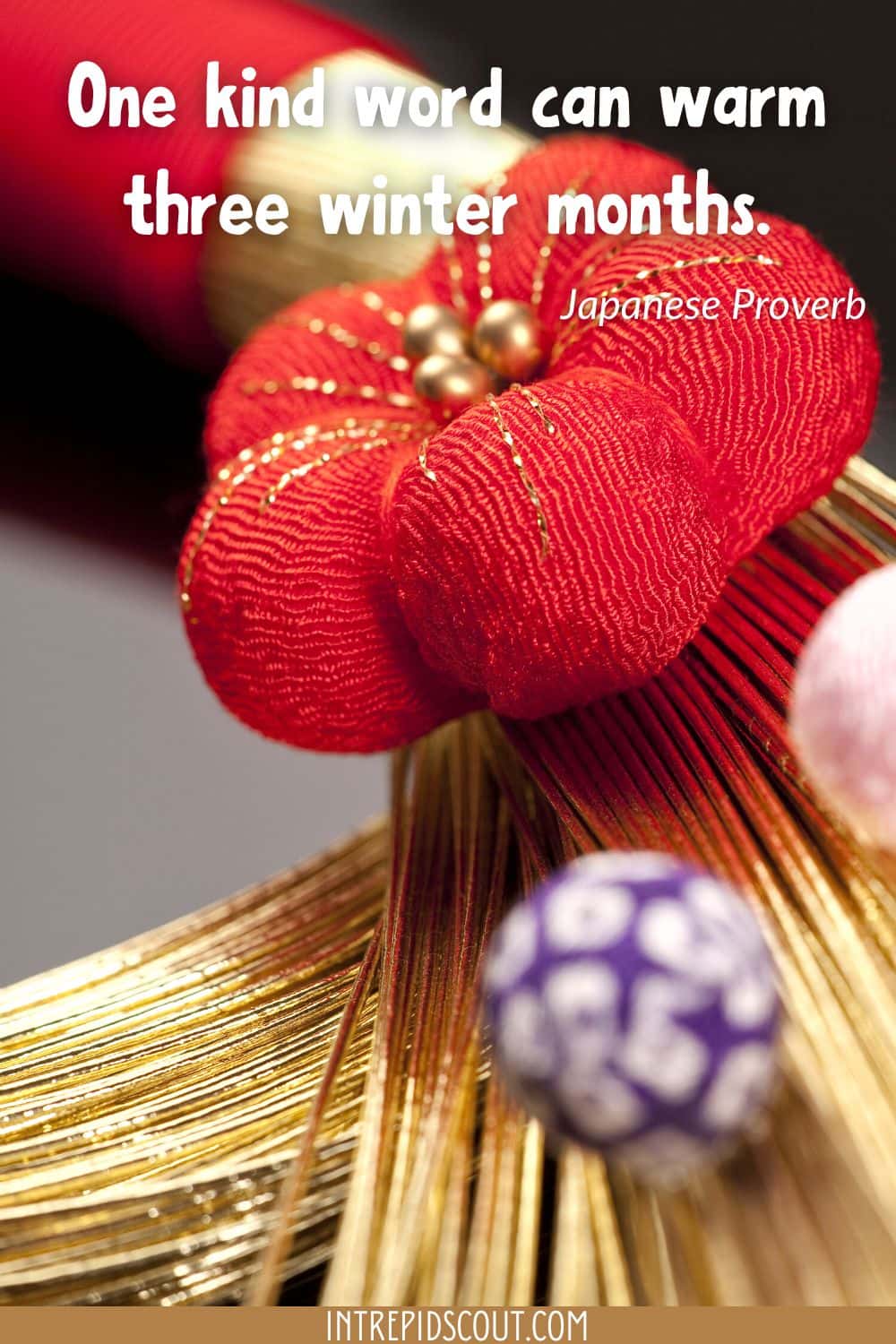
Famous Anime Quotes
81. Chotto matte — Wait a moment
82. Chotto — Hold on
83. Shinji rarenai — Unbelievable
84. Nigette — Run for your life
85. Naruhodo — I see
86. Daijobu kana — Are you alright?
87. Ikuzo — Let’s go
88. Zettai akera menai — I will not give up
89. Tasukete kudasai — Please help me
90. Shikkari shite – Hang in there
91. Ittai douiu imi — What does it mean? What is going on?
92. Omae wa mou shindeiru – You are already dead
Kyoto Quotes and Captions
93. “I loved the quiet places in Kyoto, the places that held the world within a windless moment. Inside the temples, Nature held her breath. All longing was put to sleep in the stillness, and all was distilled into a clean simplicity. The smell of woodsmoke, the drift of incense; a procession of monks in black-and-gold robes, one of them giggling in a voice yet unbroken; a touch of autumn in the air, a sense of gathering rain.” — Pico Iyer
94. “The culture’s reverence for nature accentuates Kyoto’s innate beauty. Designs on fabric, pottery, lacquer, and folding screens depict swirling water, budding branches, and birds in flight. Delicate woodcuts and scrolls celebrate the moonlight, rain, and snow. Elegant restaurant dishes arrive with edible garnishes of seasonal flora.” — Victoria Abbott Riccardi
95. “I lose my breath, find it again. I don’t want to break this spell. I’m completely besotted. In love with Kyoto, with Japan. We come to the end, to the palace gates as they open… It’s beautiful. Truly beautiful. A golden crown.” — Emiko Jean
96. “Fall is the time to view the changing colors of the leaves. Momijigari is the Japanese word for leaf-peeping. Many Kyoto temples and parks hold night illuminations with the colourful trees lit up beautifully.” — Abby Denson
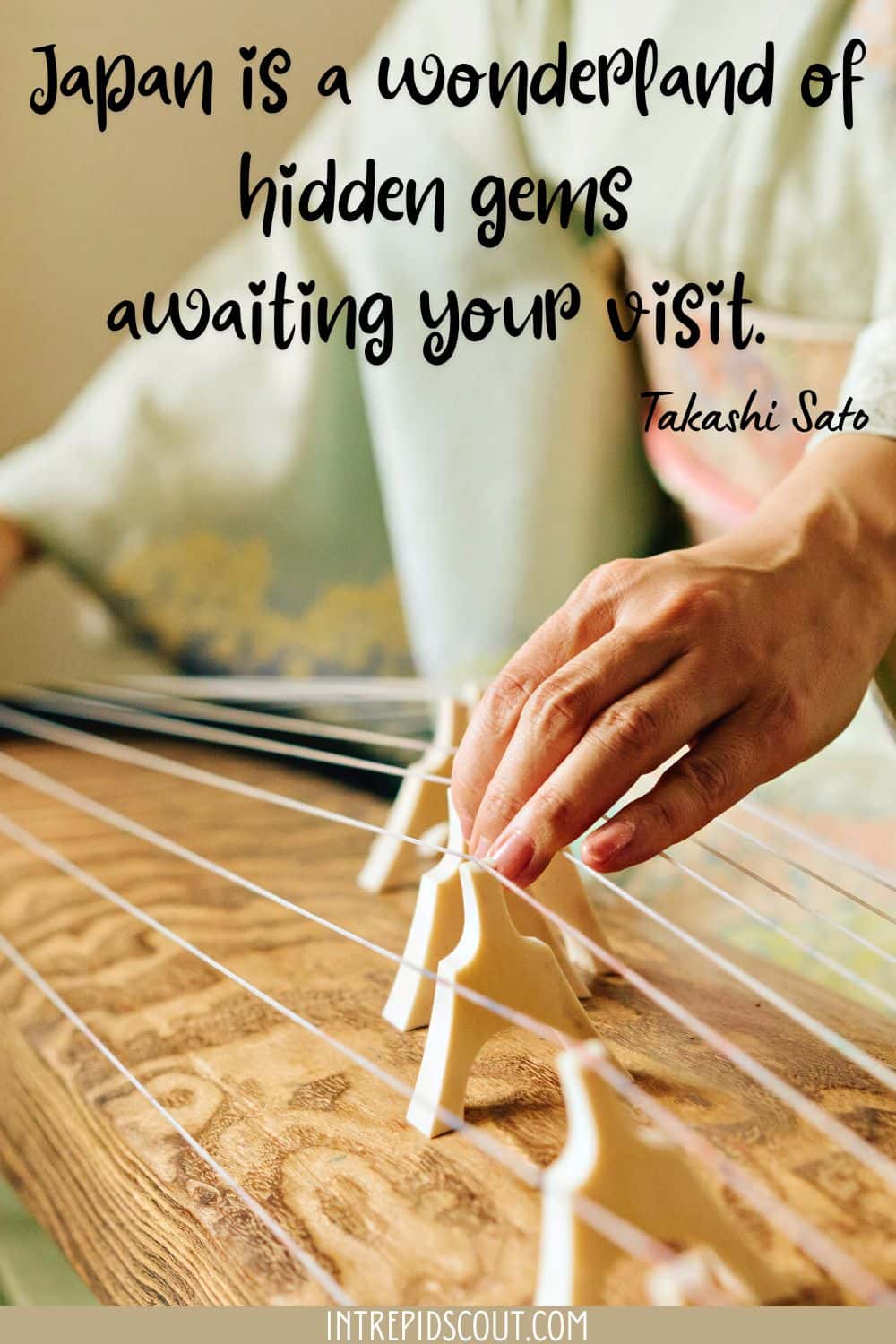
Japanese Proverbs and Sayings
97. “Ten people, ten colors.”
98. “The wise never marry. And when they marry they become otherwise.”
99. “The prime of your life does not come twice.”
100. “One kind word can warm three winter months.”
101. “Even a fool has one talent.”
102. “There are hardships and there are delights.”
103. “One cannot quarrel without an opponent.”
104. “There’s no accounting for taste. To each his own.”
105. “To continue and preserve is power.”
106. “A bee to a crying face.”
107. “To overcome a desperate situation, make a complete turn in one sudden burst.”
108. “Everyone makes mistakes. Nobody’s perfect.”
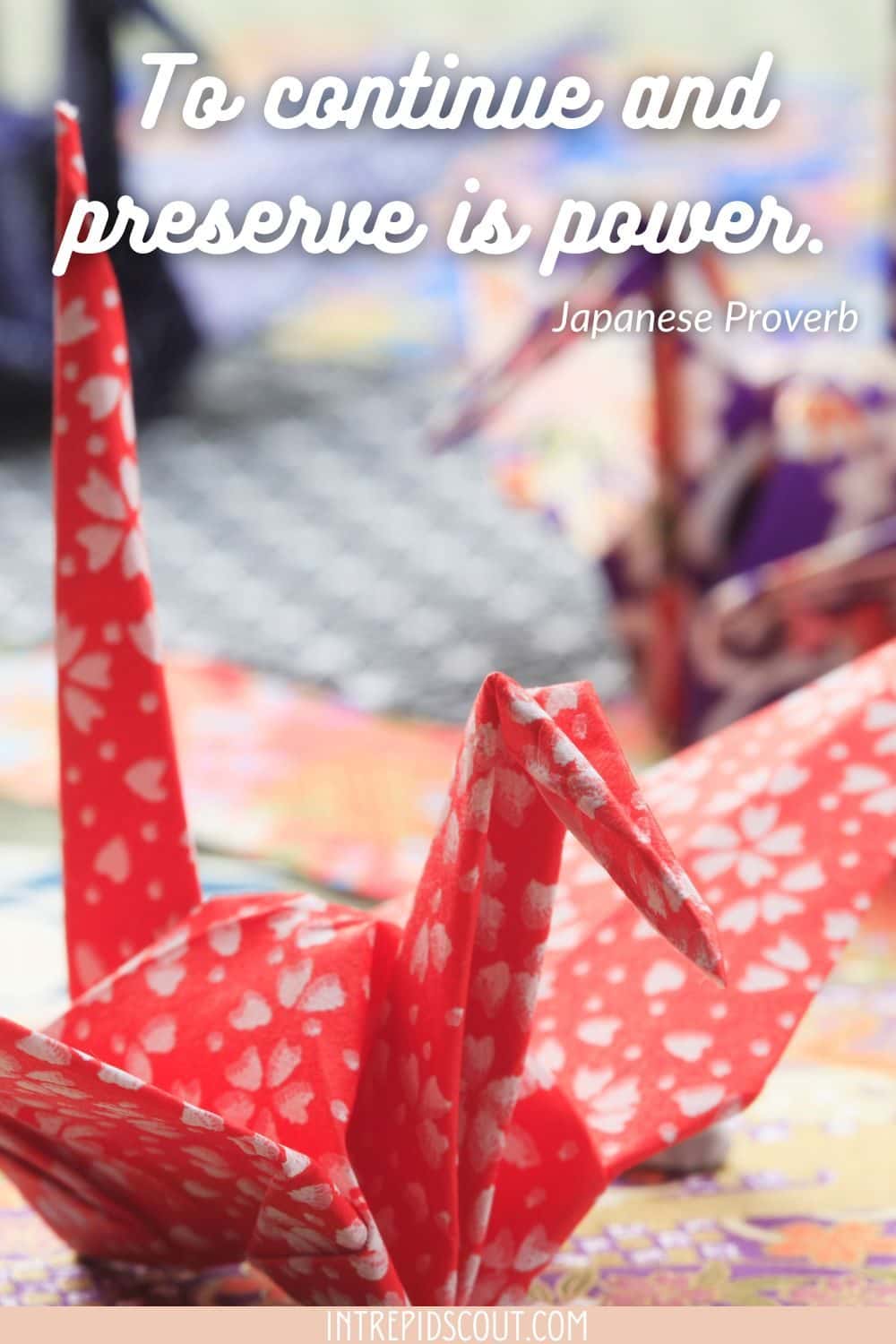
109. “Be not afraid of going slowly, be afraid only of standing still.”
110. “People judge things by their own experience, not knowing of the wide world outside.”
111. “Wherever you live, you come to love it.”
112. “Fall down seven times, get up eight times.”
113. “One stone, two birds.”
114. “Overturned water doesn’t return to the tray.”
115. “A frog in a well does not know the great ocean.”
116. “Who chases two rabbits catches neither.”
117. “Even seabream is not delicious when eaten in loneliness.”
118. “Even monkeys fall from trees.”
119. “Fear is only as deep as the mind allows.”
120. “Poke a bush, a snake comes out.”
121. “A coin to a cat.”
122. “A sutra in a horse’s ear.”
123. “One cannot quarrel without an opponent.”
124. “Time flies like an arrow.”
125. “Cover your head, and not cover your bottom.”
126. “Repentance never comes first.”
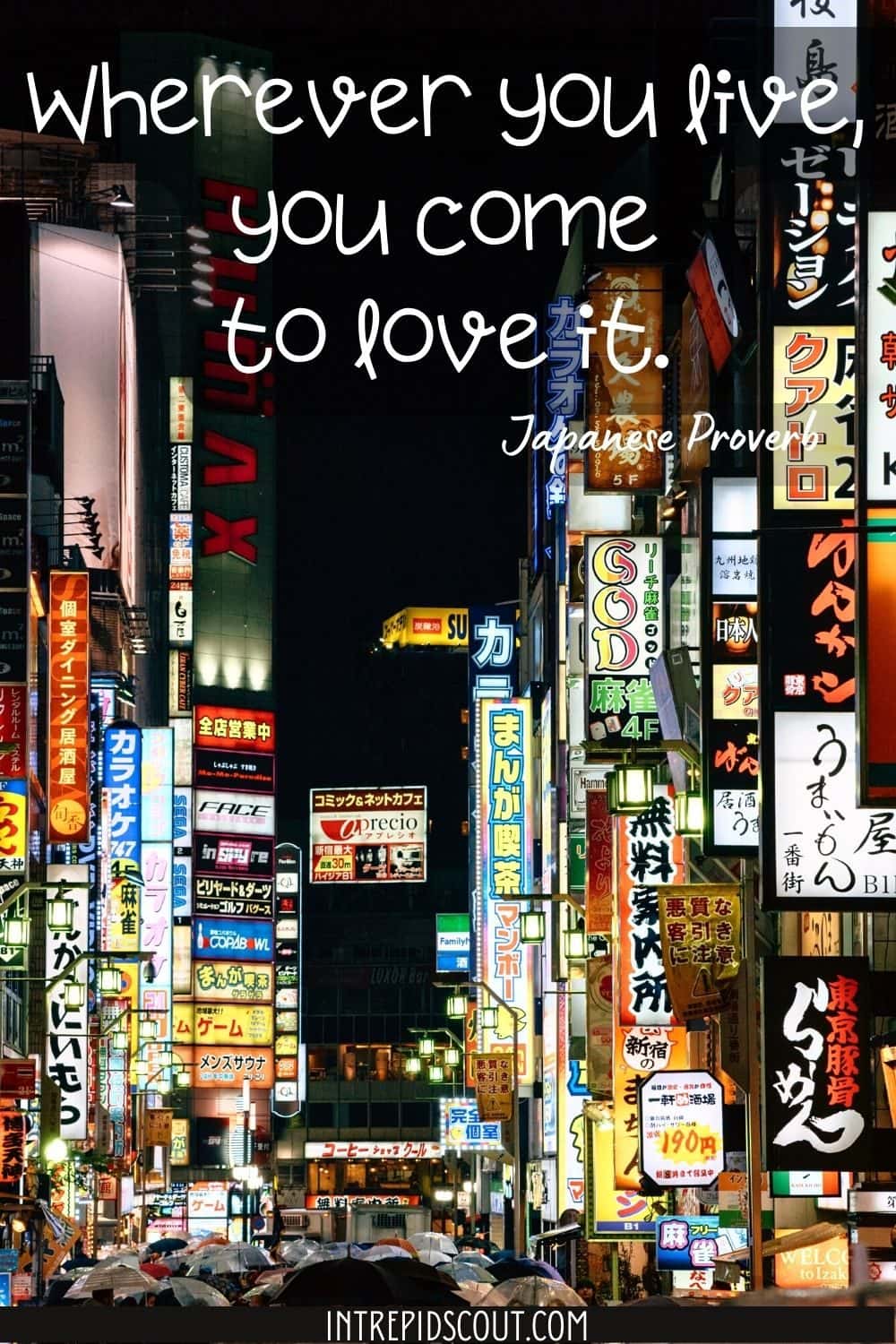
127. “Country is in ruins, and there are still mountains and rivers.”
128. “Let what is past flow away downstream.”
129. “Virtue is not knowing but doing.”
130. “The neighbor’s lawn is green.”
131. “The smart hawk hides its talons.”
132. “Even when our sleeves brush together it is our karma.”
133. “The eyes speak as much as the mouth.”
134. “Once dead the good and the bad are covered by the same moss.”
135. “Experience nature, and in doing so learn about yourself.”
136. “Luck exists in the leftovers.”
137. “Cover the ears and steal the bell.”
138. “A samurai, even when he has not eaten, uses his toothpick.”
139. “The presence of fools, makes wise people stand out.”
140. “To go in the right ear and out the left.”
141. “Love without friendship is like a shadow without the sun.”
142. “He who treads the path of love walks a thousand meters as if it were only one.”
143. “With the first glass, a man drinks wine, with the second glass the wine drinks the wine, with the third glass the wine drinks the man.”
144. “Not speaking is the flower.”
145. “It is the same life whether we spend it crying or laughing.”
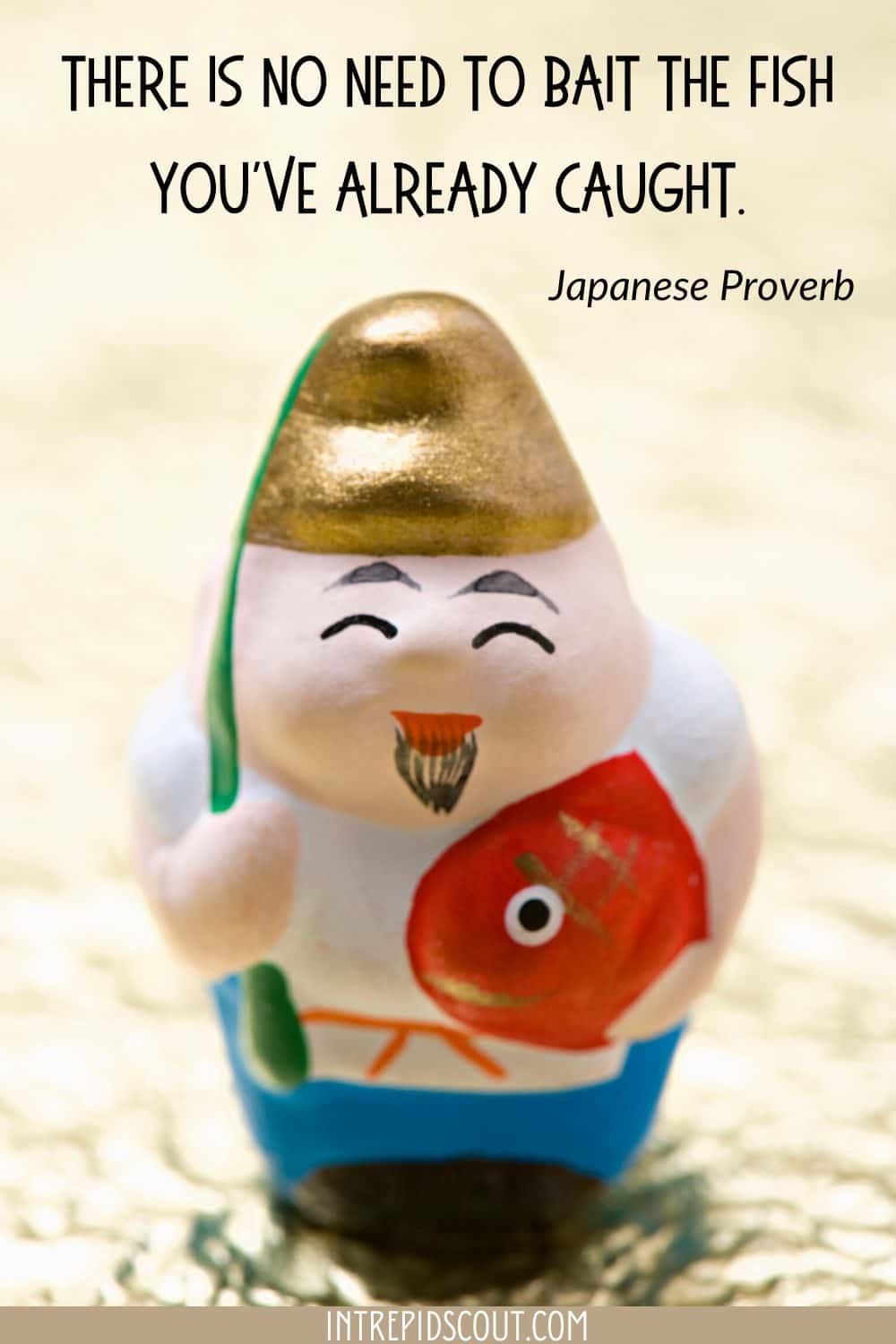
146. “One kind word can warm three winter months.”
147. “Rained on ground hardens.”
148. “Cold tea and cold rice are bearable, but cold looks and cold words are not.”
149. “Entering the village, obey the village.”
150. “Concentrate on the first steps rather than the entire journey.”
151. “The prime of your life does not come twice.”
152. “Even a fool has one talent.”
153. “A doubtful mind creates devils in the dark.”
154. “There is no need to bait the fish you’ve already caught.”
155. “The eyes are the mirror of the soul.”
156. “Talk about things of tomorrow and the mice inside the ceiling laugh.”
157. “What one likes, one will do well at.”
158. “A wise man does not lose his way, a brave man does not fear.”
159. “Touch red pigment, become red.”
160. “Good things, many devils.”
161. “If you do not enter the tiger’s cave, you will not catch its cub.”
162. “Feed a dog for three days and it is grateful for three years. Feed a cat for three years and it forgets after three days.”
163. “Half an hour in a spring evening is worth a thousand gold pieces.”
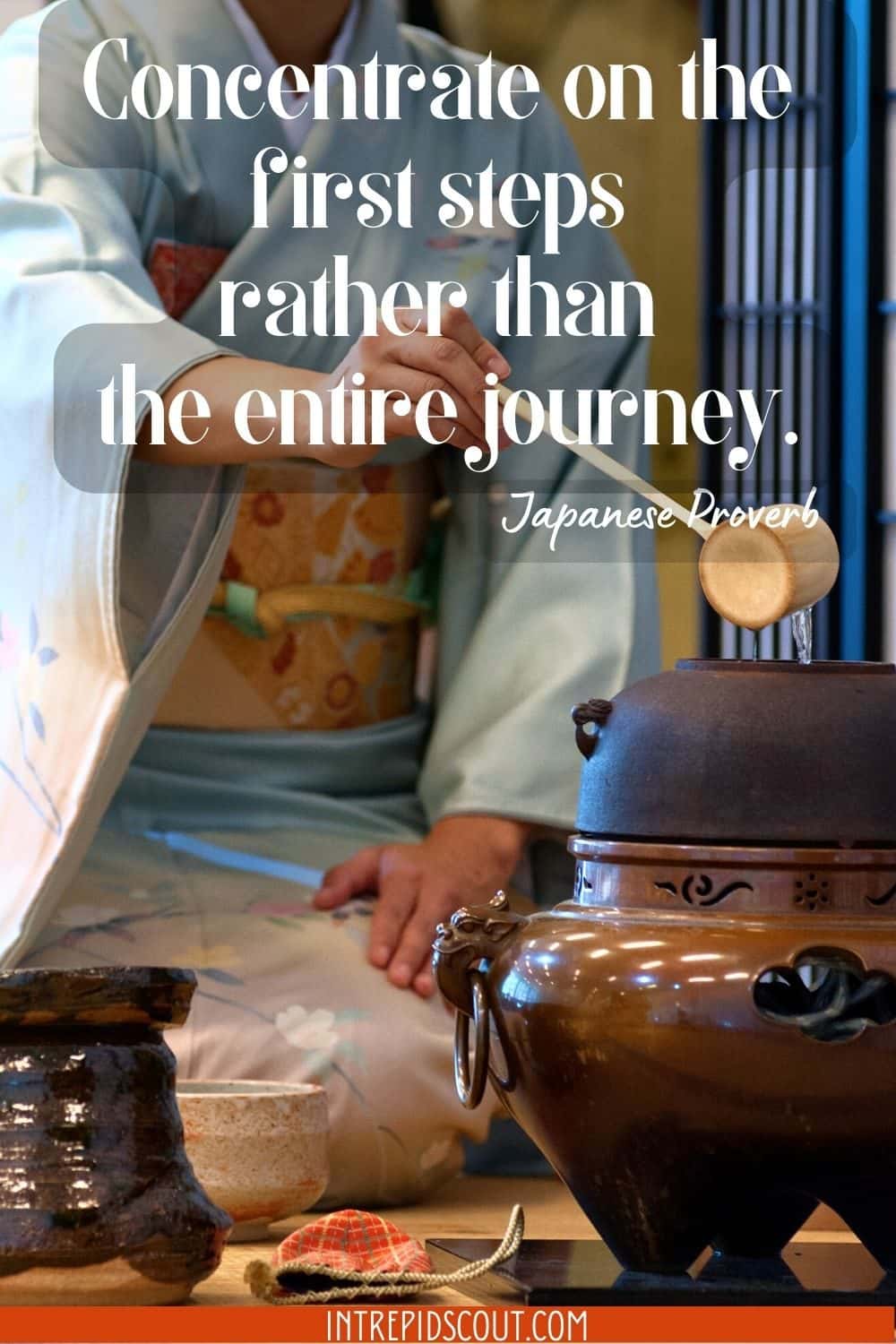
Japanese Tea Ceremony / You Might Like: Japanese Tea Ceremony / Japanese Proverbs
Quotes About Japan and Sakura (Cherry Blossoms)
164. “What a strange thing! To be alive beneath cherry blossoms.” — Kobayashi Issa
165. “Donated by Japan, cherry blossoms grace the paths where a wall once stood in Berlin. Walls divide. Flowers unite.” — Khang Kijarro Nguyen
166. “In the cherry blossom’s shade, there’s no such thing as a stranger.” — Kobayashi Issa
167. “Japan is the only country I know where a flower can bring an entire nation to a state of near-sexual excitement.” — Karin Muller
168. “Four years to the day after Fairchild’s 1908 gift of the trees to Washington’s schools, on March 27, 1912, Mrs. Taft broke dirt during the private ceremony in West Potomac Park near the banks of the Potomac River. The wife of the Japanese ambassador was invited to plant the second tree. Eliza Scidmore and David Fairchild took shovels not long after. The 3,020 trees were more than could fit around the tidal basin. Gardeners planted extras on the White House grounds, in Rock Creek Park, and near the corner of Seventeenth and B streets close to the new headquarters of the American Red Cross. It took only two springs for the trees to become universally adored, at least enough for the American government to feel the itch to reciprocate. No American tree could rival the delicate glamour of the sakura, but officials decided to offer Japan the next best thing, a shipment of flowering dogwoods, native to the United States, with bright white blooms.
Meanwhile, the cherry blossoms in Washington would endure over one hundred years, each tree replaced by clones and cuttings every quarter century to keep them spry. As the trees grew, so did a cottage industry around them: an elite group of gardeners, a team to manage their public relations, and weather-monitoring officials to forecast “peak bloom”—an occasion around which tourists would be encouraged to plan their visits. Eventually, cuttings from the original Washington, D.C, trees would also make their way to other American cities with hospitable climates. Denver, Colorado; Birmingham, Alabama; Saint Paul, Minnesota.” — Daniel Stone
169. “I put my phone away and stare out the window at Japan’s countryside, watching the scenery zip by at 320 kilometers per hour. Mount Fuji has come and gone, as have laundry on metal merry-go-racks, houses plastered with party signs, weathered baseball diamonds, an ostrich farm, and now, miles of rice paddy fields tended by people wearing conical hats and straw coats. Japan is dressed in her best this morning, sunny and breezy, with few clouds in the sky as accessories. It’s the first official day of spring. Cherry blossoms have disappeared in twists of wind or trampled into the ground. Takenoko, bamboo season, will begin soon.” — Emiko Jean
You Might Also Like:
165 Beautiful CHERRY BLOSSOM QUOTES and CAPTIONS for Instagram
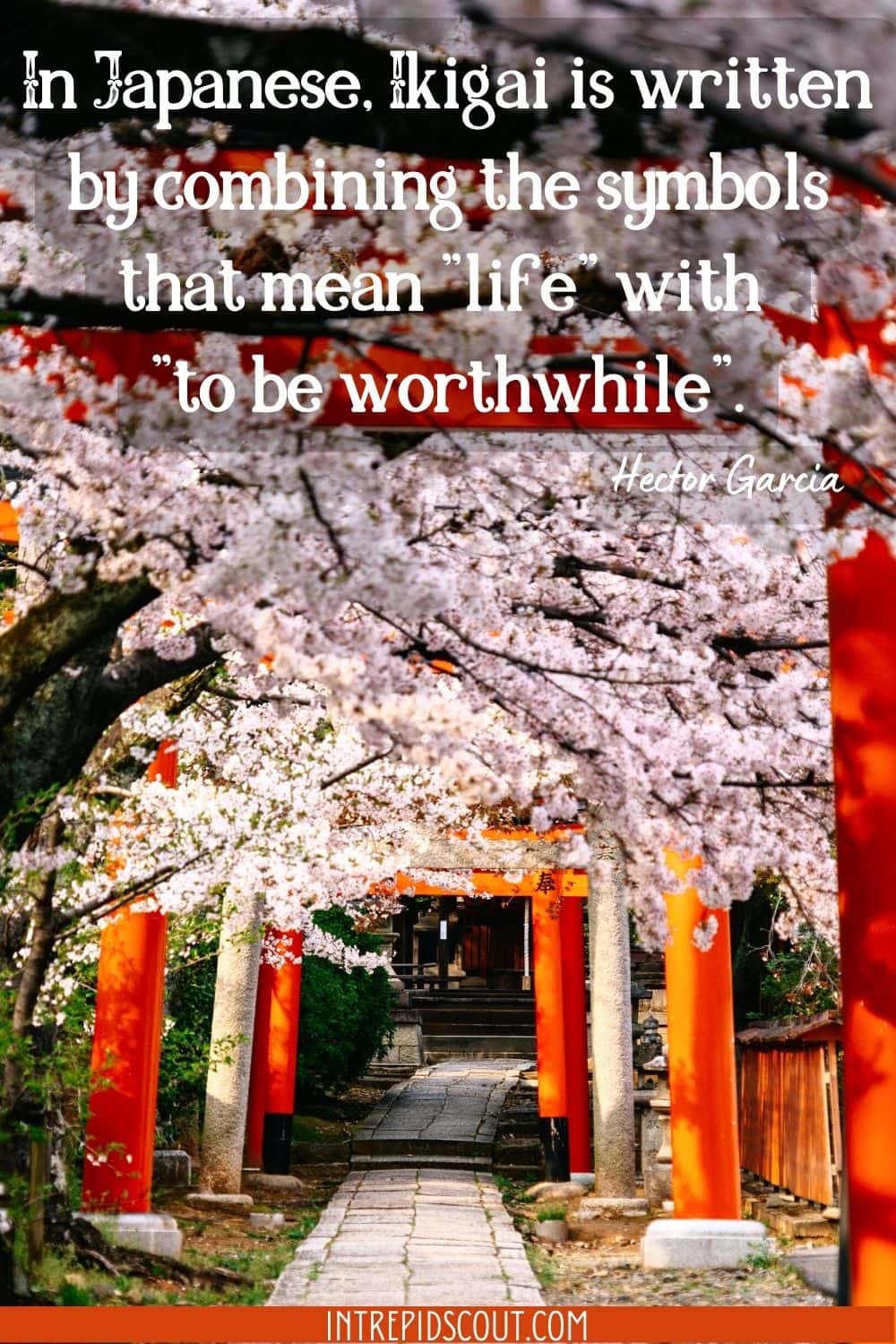
Quotes About Travel to Japan
170. “If you go to Japan, you have to take the train and go visit different capital cities. Just sticking to one city would be a shame, considering how easy it is to get around. Tokyo, Osaka, and Kyoto all have different vibes and sights.” — Ronny Chieng
171. “I loved the quiet places in Kyoto, the places that held the world within a windless moment. Inside the temples, Nature held her breath. All longing was put to sleep in the stillness, and all was distilled into a clean simplicity. The smell of woodsmoke, the drift of incense; a procession of monks in black-and-gold robes, one of them giggling in a voice yet unbroken; a touch of autumn in the air, a sense of gathering rain.” — Pico Iyer
172. “I love Mount Fuji and I think it is my love of the mountains in Japan that led me to seek other mountains around the world.” — Tamae Watanabe
173. “I have visited Japan several times and have always been shown wonderful hospitality.” — Stephen Hawking
174. “Japan, for me, will always be my inspiration source.” — Nicola Formichetti
175. “But anything that you hear about Japan is nothing like what you see when you actually go over there and see it, you know, in a real situation.” — Billy Higgins
176. “Japan is a wonderland of hidden gems awaiting your visit.” — Takashi Sato
177. “I actually enjoyed getting lost in Japan’s backroads, finding myself in a wasabi farm.” — Travis Rice
178. “Who needs drugs when you have Takeshi’s Castle?” ― Craig Charles
179. “Japan is a sort of a hobby of mine, and I can get around Japan with ease.” — Dick Cavett
180. “I’ve been to Japan so many times, but I still constantly stumble across things that are so foreign to me.” — Travis Rice
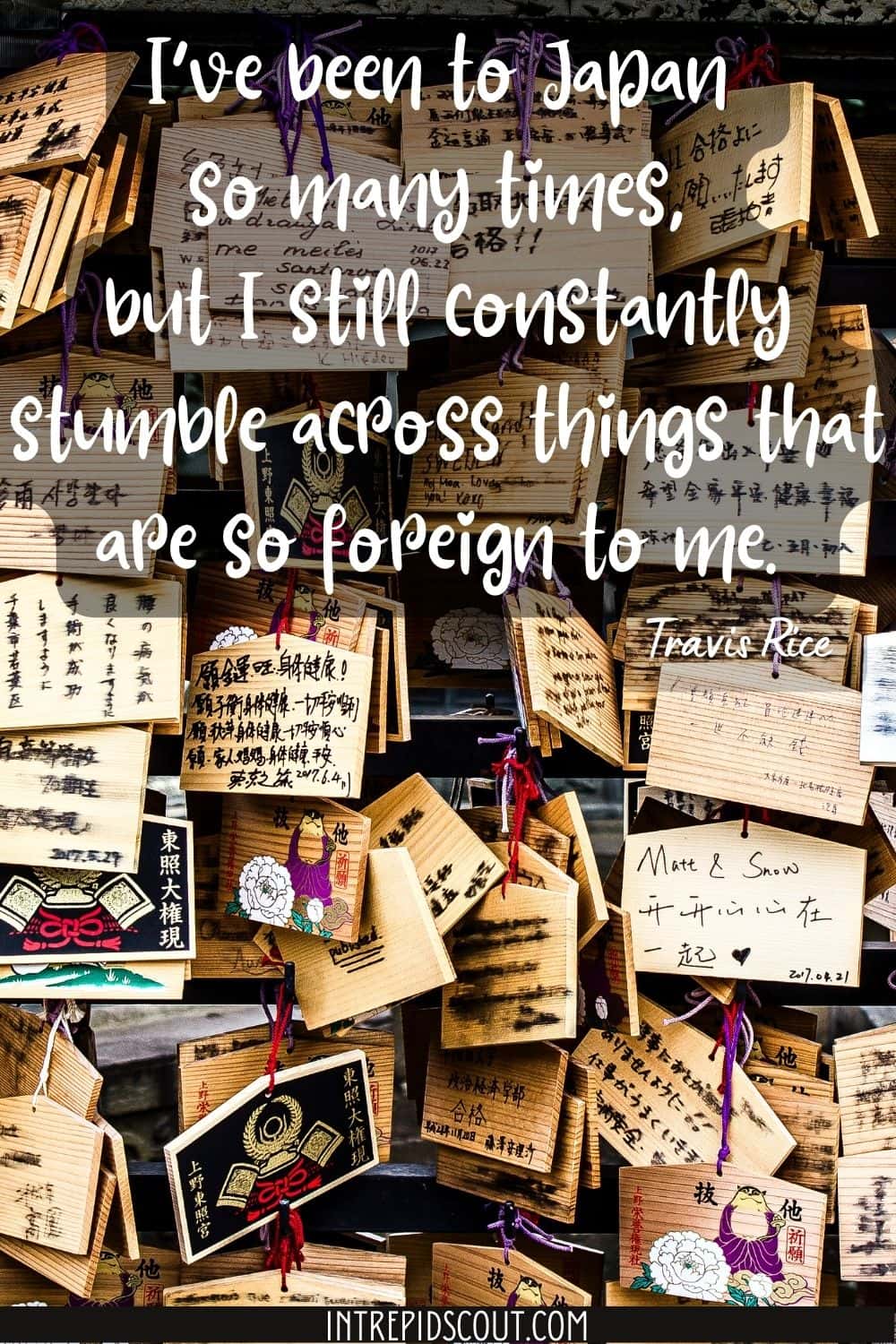
Tokyo Quotes and Captions
181. “Here in Tokyo, they’re not just hard-working but almost violently cheerful. Down at the Peacock, the change flows like tap water. The women behind the registers bow to you, and I don’t mean that they lower their heads a little, the way you might if passing someone on the street. These cashiers press their hands together and bend from the waist. Then they say what sounds to me like, “We, the people of this store, worship you as we might a god.” – David Sedaris
182. “Lost in Tokyo.”
183. “I sometimes wonder why the Japanese went to all the trouble of franchising a Disneyland in the suburbs when the capital itself is in many ways so superior a version.” – Donald Ritchie
184. “The best city for fashion is Tokyo. You see styles there you won’t see in London, Paris, Milan or New York.” – Tommy Hilfiger
185. “Japanese addresses typically involve three numbers separated by dashes (e.g., 3-35-31). The first of these is the sub-area where the house or building is located, the second is the block it is on, and the third is the building number. And when these numbers are added together, the sum equals the percentage chance that you are never going to find the building you’re looking for.” — Tim Anderson
186. “Maybe vagueness has been good for me. The word means two different things in Tokyo and Osaka, you know. In Tokyo it means stupidity, but in Osaka they talk about vagueness in a painting and in a game of Go.” – Yasunari Kawabata
187. “Keep calm and love Tokyo.”
Don't Have Time to Read It Now?
Why Not Save Quotes About Japan to Your Pinterest Board!
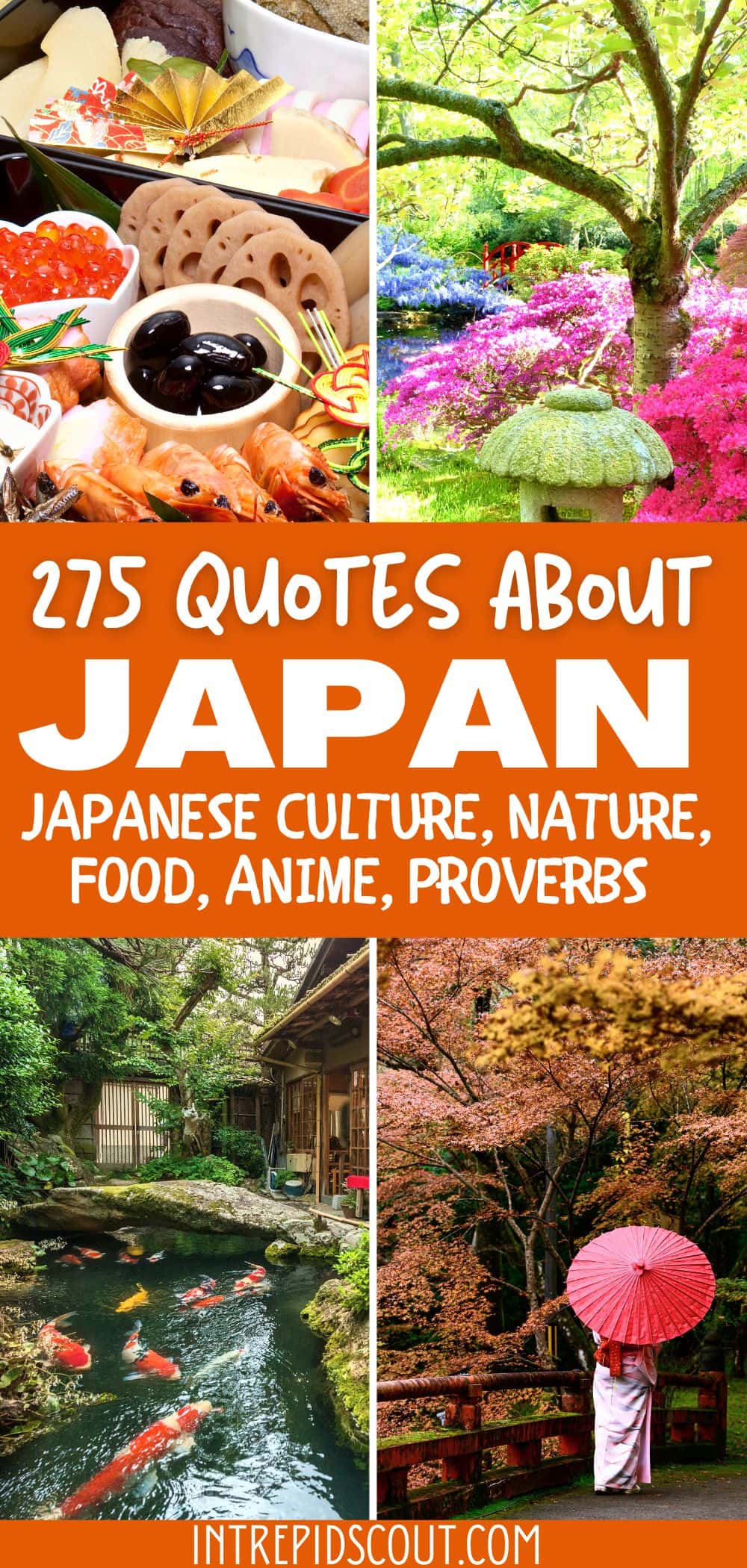
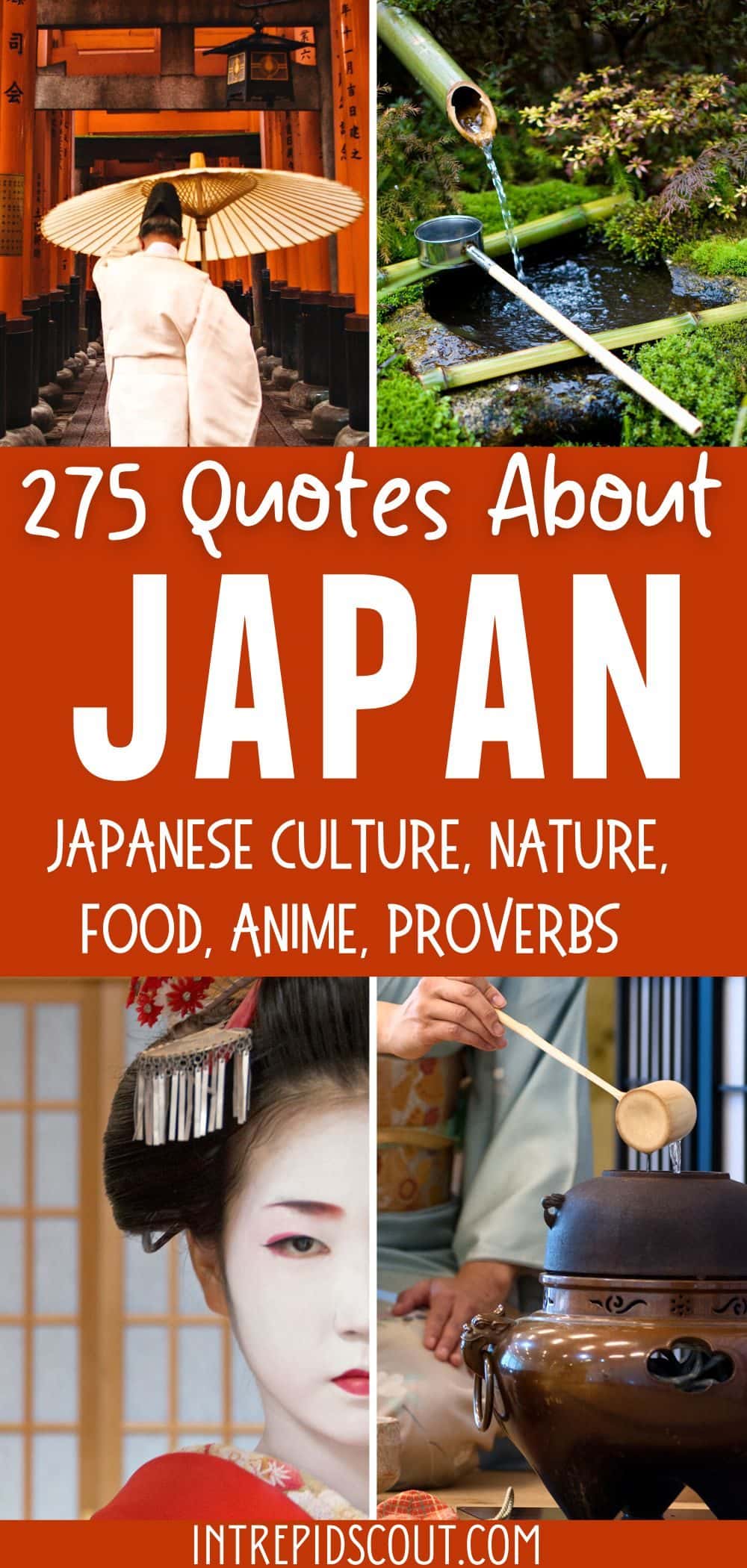
188. “Living right in the heart of Tokyo itself is quite like living in the mountains – in the midst of so many people, one hardly sees anyone.” — Yūko Tsushima
189. “It is useless to even try to answer the question I’ve been asked at least once a week over the past three years: ‘Okay, which are, hands down, the three best resturaunts in Tokyo?’… asking this question about Tokyo is like asking which three websites are the best on the internet.” — Jonas Cramby
190. “I can’t seem to get the beauty of Tokyo off my mind.”
191. “Japan, not only a mega-busy city that thrives on electronics and efficiency, actually has an almost sacred appreciation of nature. One must travel outside of Tokyo to truly experience the ‘old Japan’ and more importantly feel these aspects of Japanese culture.” — Apolo Ohno
192. “Celebrating Valentine’s Day is like falling in love with Tokyo all over again.” — Anthony T. Hincks
193. “I love Tokyo. If I had to eat only in one city for the rest of my life, Tokyo would be it. Most chefs I know would agree with me.” — Anthony Bourdain
194. “If Japan is enigmatic, then Tokyo is the heart of that riddle, its rhythm and essence so utterly alluring that it demands to be explored. It has a depth that keeps travellers in a constant state of rapture and delight. Whatever your vice, Tokyo has you covered.” — Michael Ryan, Luke Burgess
195. “Tokyo is too close up to see, sometimes. There are no distances and everything is above your head – dentists, kindergartens, dance studios. Even the roads and walkways are up on murky stilts. An evil-twin Venice with all the water drained away.” — David Mitchell
196. “There are so many more people in Tokyo than in New York, but it’s pristine. It’s so organized, and yet the address system is in complete chaos.” — Nick Wooster
197. “Tokyo was an origami city folded over and over until something was made of virtually nothing.” — Christopher Barzak
Cherry Blossoms in Tokyo / Quotes About Japan
198. “But Tokyo offers cat cafes, a commercial solution to the problem of wanting to commune with cats but being unwilling or unable to have one at home.
Iris’s favorite cat cafe is Nekorobi, in the Ikebukuro neighborhood. When I first heard about cat cafes, I imagined something like Starbucks with a cat on your lap. Wrong. Nekorobi is what you’d get if you asked a cat-obsessed kid to draw a floorplan of her dream apartment: a bathroom, a drink vending machine(free with admission), a snack table, video games, and about ten cats and their attendant toys, scratching posts, beds, and climbing structures. Oh, and the furniture is in the beanbag chic style.
Considering all the attention they get, the cats were amazingly friendly, and I’d never seen such a variety of cat breeds up close. (Nor have I ever spent more than ten seconds thinking about cat breeds.) My favorite was a light gray cat with soft fur, which curled up and slept near me while I sat on a beanbag and read a book. Iris made the rounds, drinking a bottomless cup of the vitamin-fortified soda C.C. Lemon and making sure to give equal time to each cat, including the flat-faced feline that looked like it had beaned with a skillet in old-timey cartoon fashion.” — Matthew Amster-Burton
199. “I always had a sense that I would fall in love with Tokyo. In retrospect I guess it’s not that surprising. I was of the generation that had grown up in the ’80s when Japan was ascendant (born aloft by a bubble whose burst crippled its economy for decades), and I’d fed on a steady diet of anime and samurai films.” – Junot Diaz
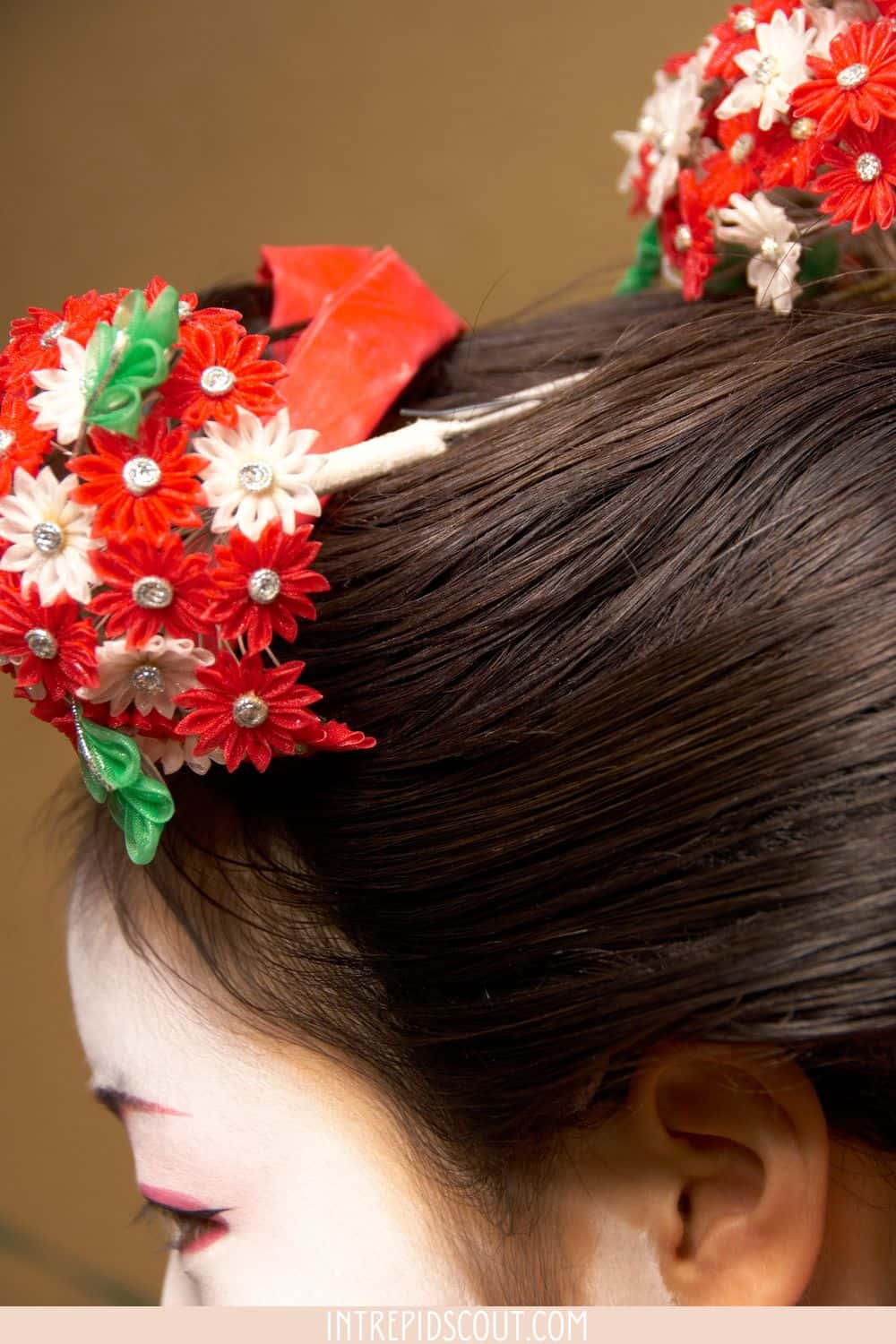
Quotes About Japan
200. “Tokyo – still – offers the most tightly integrated infrastructure, where smooth, technology-driven experiences take place when engaging in everyday actions, such as verifying personal identity, paying for goods, and buying tickets.” — Jan Chipchase
201. “Shibuya is a great place to start your trip, as it offers you a taste of every stereotype you could hope to see in Tokyo.” – Brian Flynn
202. “Tokyo is a very safe city. At night it becomes quiet the way New York never does.” — Rick Kennedy
203. “If you go to Tokyo, I think it becomes very obvious that there’s this almost seamless mixture of popular culture and Japanese traditional culture.” — Kazuo Ishiguro
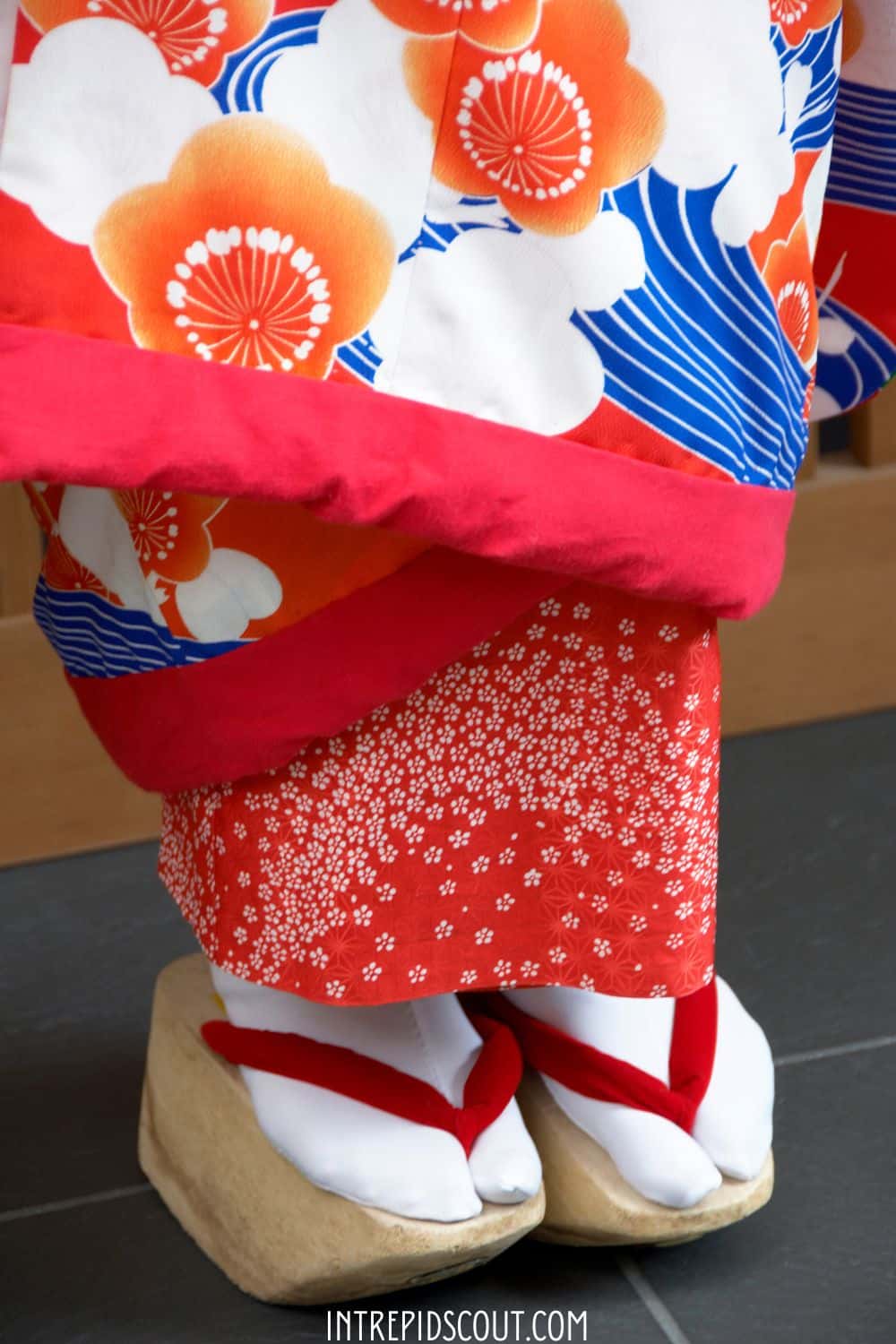
Quotes About Japan
204. “Working in Tokyo has convinced me that, contrary to what people think, it is actually one of the world’s most beautiful cities.” — Tadao Ando
205. “Japan, and Tokyo in particular has been my muse for decades. Every trip brings a little more depth to my understanding of this complex, multi-layered city. But it is enormous, and spatially in can be confusing, particularly when you travel mostly underground. A more manageable way of comprehending Tokyo is to think of it as a number of smaller cities merged into one – Shibuya, Shinjuku, Ikebukuro, Ginza…Each one has its own feel, its own personality.” — Michael Ryan, Luke Burgess
206. “Tokyo is a very safe city. At night it becomes quiet the way New York never does.” — Rick Kennedy
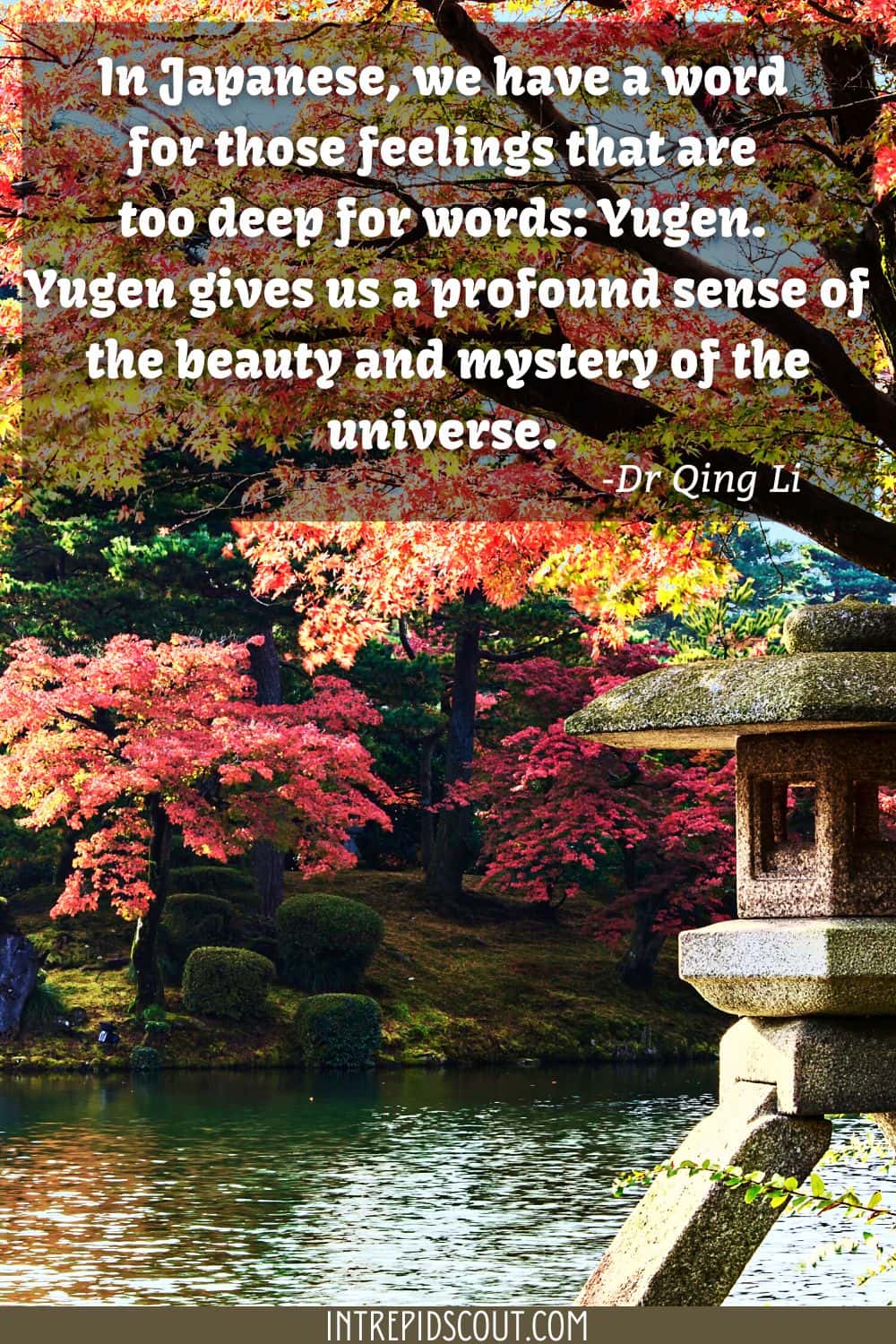
Kenrokuen Garden in Kanazawa / You Might Like: Guide to KENROKUEN GARDEN in KANAZAWA (Japan’s Top-Ranked Garden) / Quotes About Japan
Japan Captions
207. “Short and sweet? How very Japanese of you.”
208. “You, me, and a cup of Japanese tea.”
209. “Doing this sweet thing called exploring Japan.”
210. “Finding paradise in the streets of Japan.”
211. “I wish you could taste this picture from Japan.”
212. “Happiness is going on a sushi date in Japan.”
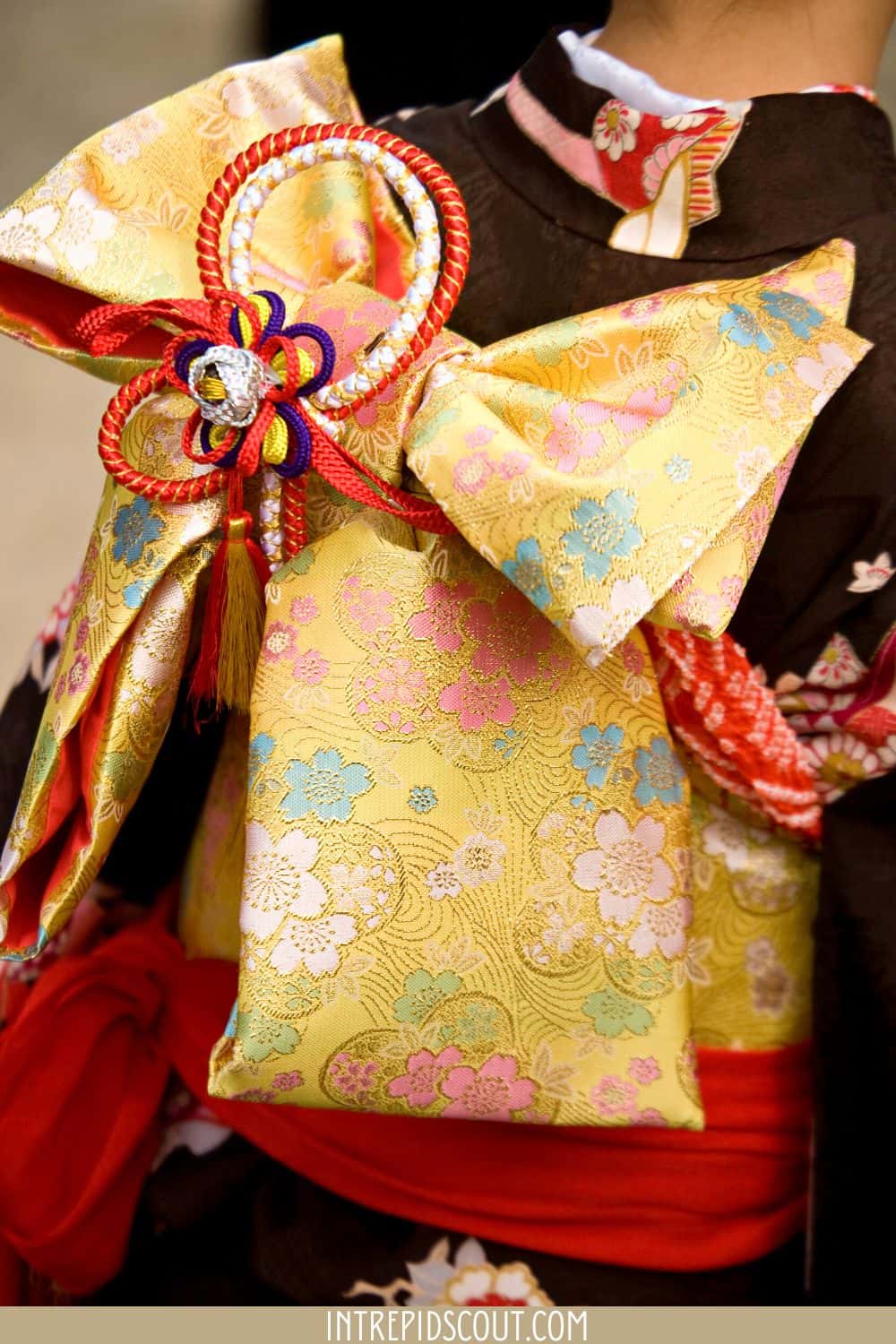
Quotes About Japan
Quotes About Japanese Women
213. “Psychologically, Japanese women depend largely on each other. In their sex-segregated society, they could be criticized for living in a female ghetto, and yet they have what some American feminists are trying to build, a ”women’s culture” with its own customs, values and even language.” — Kittredge Cherry
214. “In a direct confrontation, the Japanese women might yield like blades of grass and spring back just as quickly. One of them compared this flexibility to the Vietcong guerrillas.” ― Kittredge Cherry
215. “When Japanese women encouraged men to bask in public glory, it reminded me of the way you would indulge a child with a sweet-bean treat.” — Kittredge Cherry
216. “These ideas fit the experience of these Japanese women who often talked about searching for or trying to develop “self” (jibun). Cultivating or polishing self by doing tea ceremony or being a good mother, for example, had a good connotation for the Japanese because it meant that you were trying to go beyond your narrow self and connect self with the larger world beyond social norms. But developing self in the new way these women used it meant to develop self according to just what you want to do or in a way that enhances your own possibilities in the world. Would others see choosing a life for self as selfish? These women had to maintain some ambiguity because they were wandering into dangerous territory when they wanted to travel just to enjoy themselves, or keep working and not marry. In a society that honored the cultivation of a larger self, would they themselves someday suffer for having chosen the self-centered way?” — Nancy Ross Rosenberger
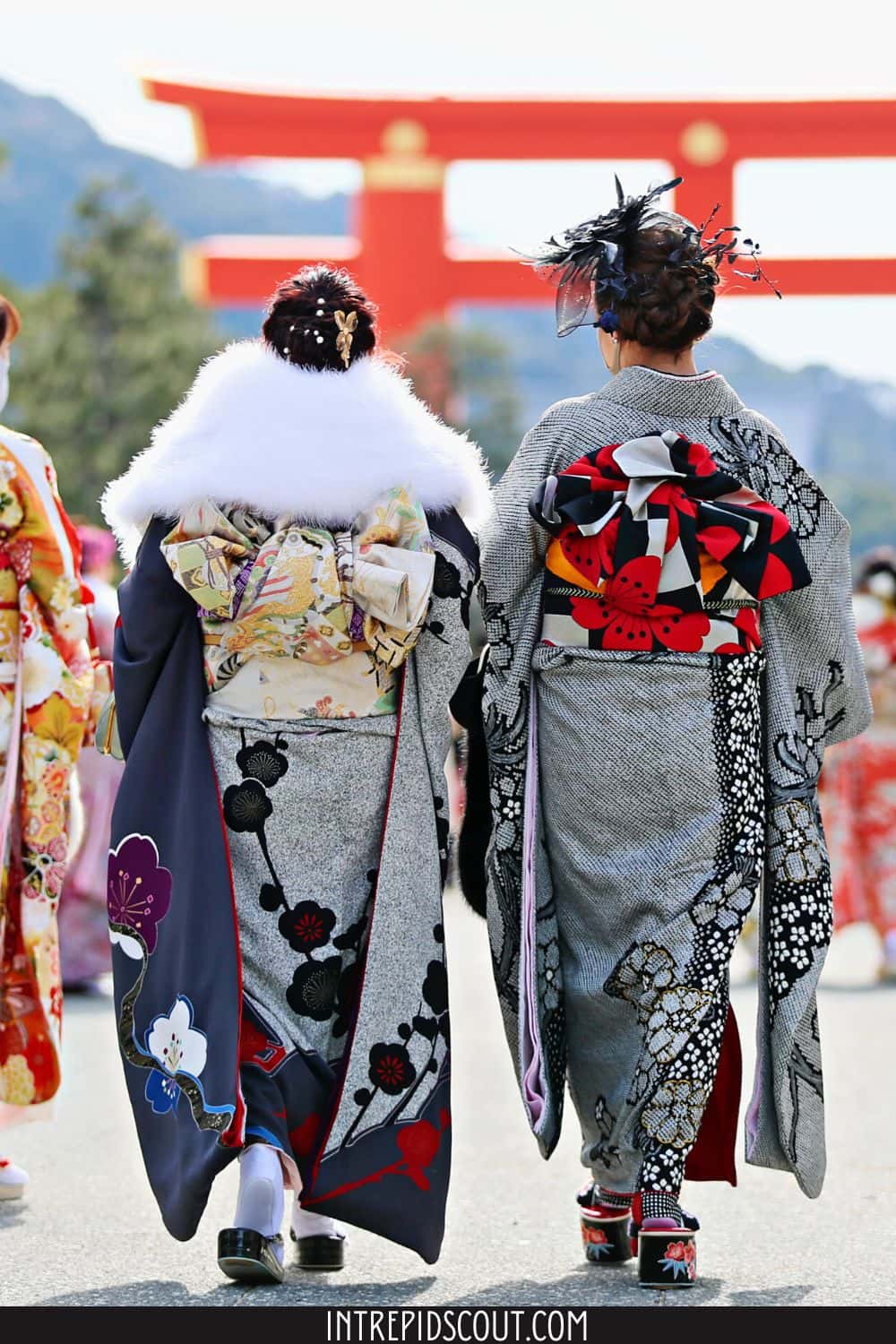
Funny Quotes About Japan
217. “Why has Japan had so many conflicts and wars? Because they have lots of animes.”
218. “Of course, my Christmas is (so much more) gorgeous and romantic (than Germany’s)!! And unlike the rest of the world, we leave wine behind for Santa Claus! So Santa-san is delivering gifts to children while driving under the influence . . . ?” — Hidekaz Himaruya
219. “Have you heard what Japan have instead of alphabet soup? Times new ramen.”
220. “I’ve never really wanted to go to Japan. Simply because I don’t like eating fish. And I know that’s very popular out there in Africa.” — Britney Spears
221. “One of the reasons Japanese culture is so intriguing (and confounding) to westerners is not that it seems so foreign, but that it seems so familiar—at least at first. The packaging registers with our sensibilities, but the actual content does not. Innocent-looking anime characters sprout sudden porno appendages; morning chat shows digress into screaming fits; and musicians that dress like goth metalheads sound like fourth-tier Orlando boy-band members. Shinsaibashi has that same bewildering familiarity. Just as I convince myself that it’s another noisy mall, I’m nearly run down by a drunken bi- cyclist, and then accosted by a fuzzy store mascot.” — Brian Raftery
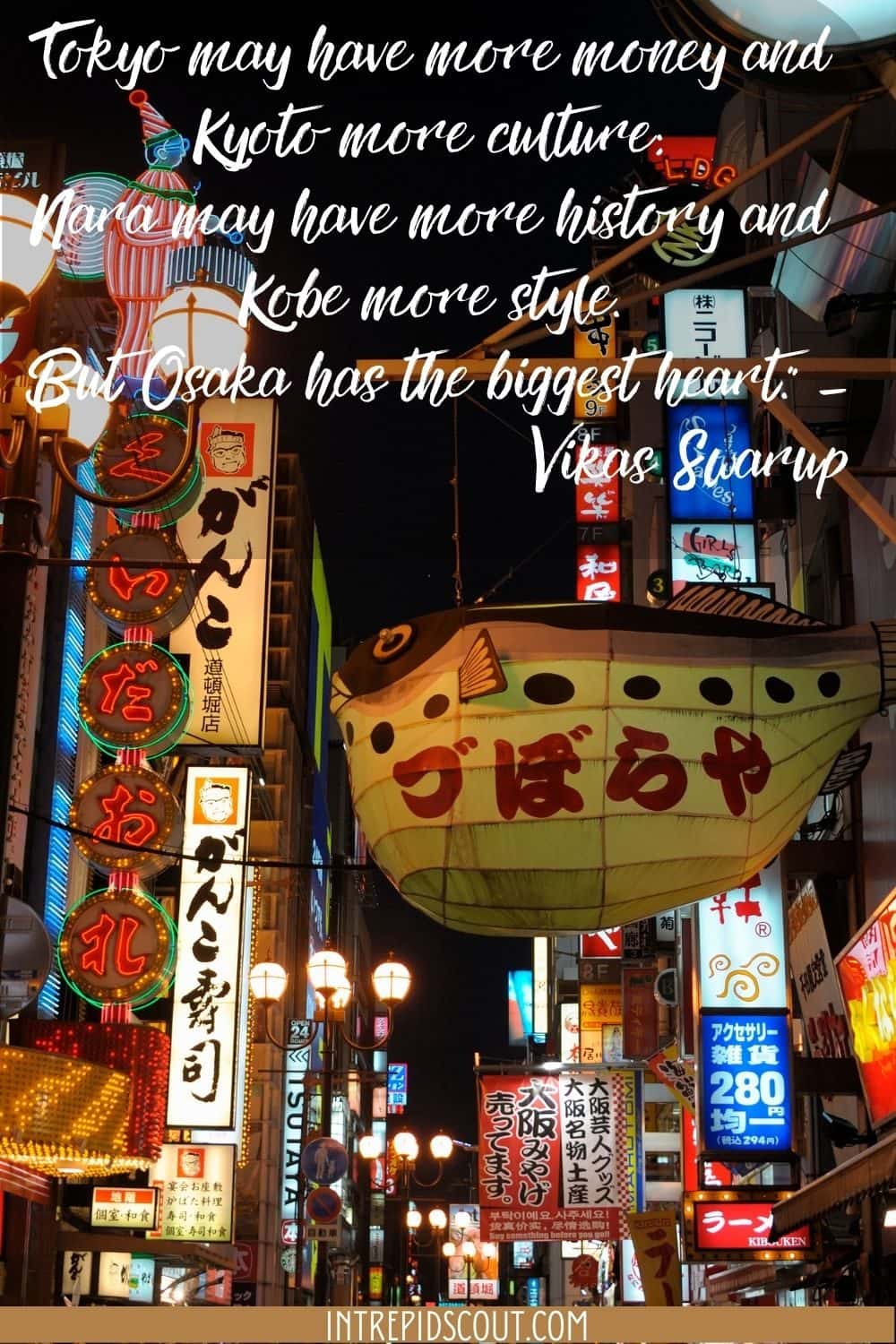
Osaka / You Might Also Like: WHAT to DO in SHINSEKAI Osaka (6 Amazing Things You Can’t Miss) / Quotes About Japan
Bushido - Quotes About the Code of Honor and Morals Developed by Samurai
222. “The discipline of strength instills resistance without complaint, and also teaches courtesy. It demands that we not ruin the pleasure or serenity of others through the expression of our own sadness or pain.” — Inazo Nitobe
223. “It is the very mind itself that leads the mind astray – of the mind, do not be mindless.” — Takuan Soho
224. “A warrior is worthless unless he rises above others and stands strong in the midst of a storm.” — Yamamoto Tsunetomo
225. “This is the substance of the Way of the Samurai: if by setting one’s heart right every morning and evening, one is able to live as though his body were already dead, he gains freedom in the Way. His whole life will be without blame, and he will succeed in his calling.” — Yamamoto Tsunetomo
226. “I’m not a fighter, but in my mind I’m fighting every day. ‘What’s new? What am I doing?’ I’m fighting myself. My soul is samurai. My roots aren’t samurai, but my soul is.” — Masaharu Morimoto
227. “The undisturbed mind is like the calm body water reflecting the brilliance of the moon. Empty the mind and you will realize the undisturbed mind.” — Yagyu Jubei Mitsuyoshi
228. “As a samurai, I must strengthen my character; as a human being I must perfect my spirit.” — Yamaoka Tesshu
229. “The Samurai is the first to suffer anxiety for human society, and he is the last to seek personal pleasure.” — Morihei Ueshiba
230. “Honour may not win power, but it wins respect. And respect earns power.” — Ishida Mitsunari
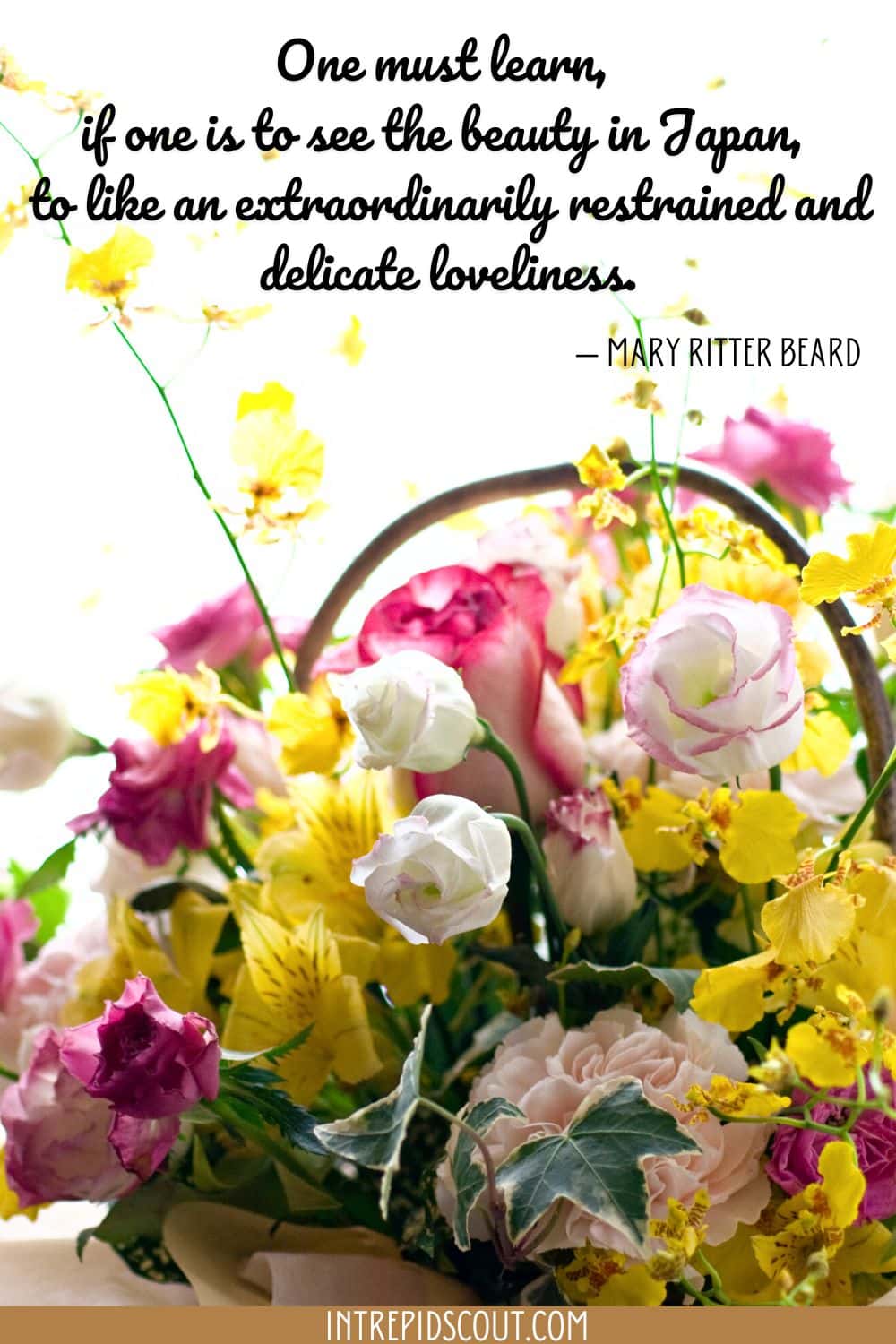
Quotes About Japan
231. “The art of peace does not rely on weapons or brute force to succeed; instead, we put ourselves in tune with the universe, maintain peace in our own realms, nurture life, and prevent death and destruction. The true meaning of the term samurai is one who serves and adheres to the power of love.” — Morihei Ueshiba
232. “It is good to face challenges in your youth. He who has never suffered will not sufficiently temper his character.” — Yamamoto Tsunetomo
233. “The Samurai always has to rise and move on, because new challenges will come.” — Lyoto Machida
234. “Get beyond love and grief: exist for the good of Man.” — Miyamoto Musashi
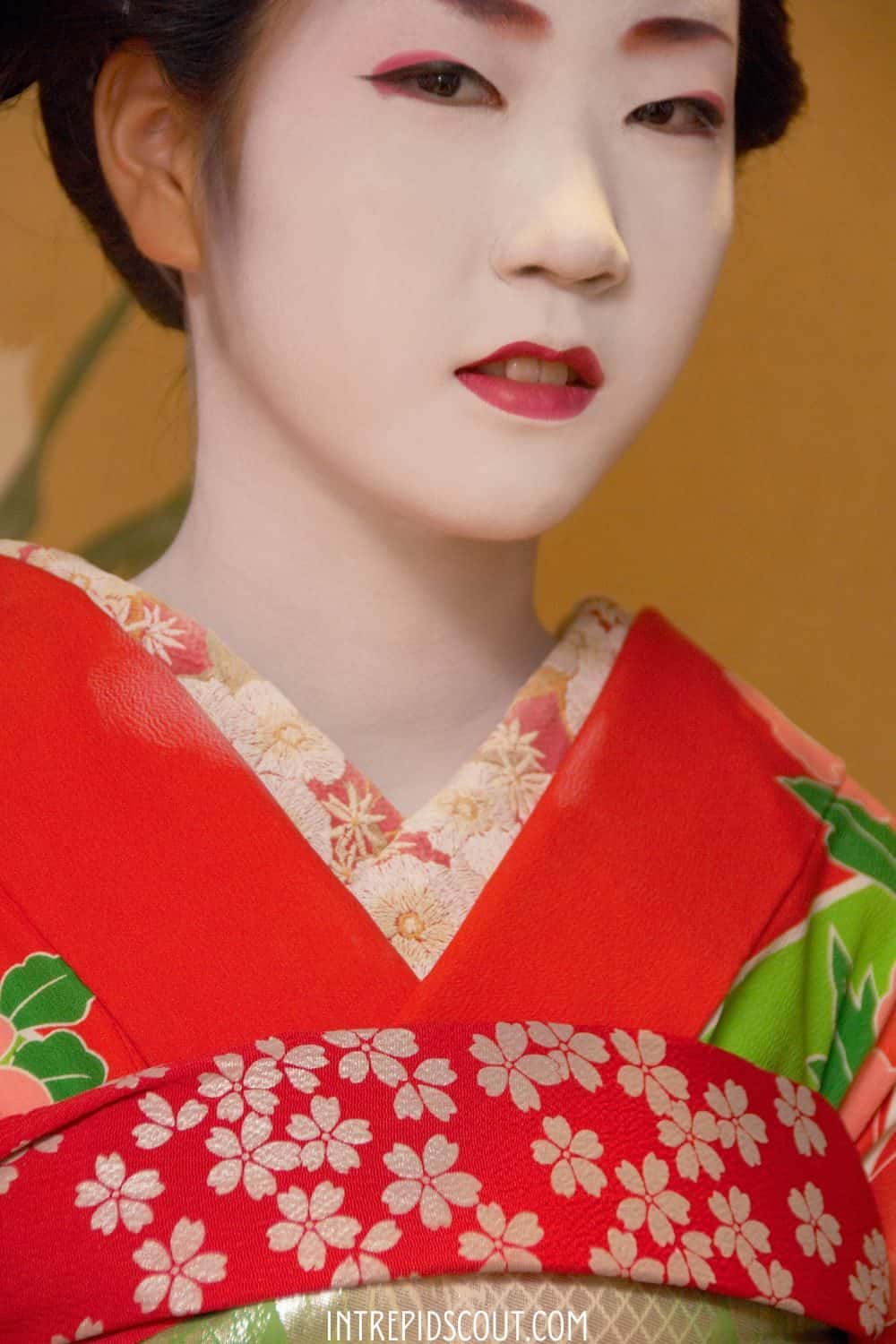
235. “It is a wretched thing that the young men of today are so contriving and so proud of their material possessions. Men with contriving hearts are lacking in duty. Lacking in duty, they will have no self-respect.” — Yamamoto Tsunetomo
236. “Everyone feels fear. What a samurai or warrior is, is what you do when you feel fear.” — Enson Inoue
237. “Today is victory over yourself of yesterday; tomorrow is your victory over lesser men.” — Miyamoto Mushashi
238. “I know nothing about surpassing others. I only know how to outdo myself.” — Bushido
239. “When you give advice, you should first discern whether or not the other person is willing to accept it.” — Bushido
240. “If you embark on an uncharted path, infinite secrets will appear at the end.” — Bushido
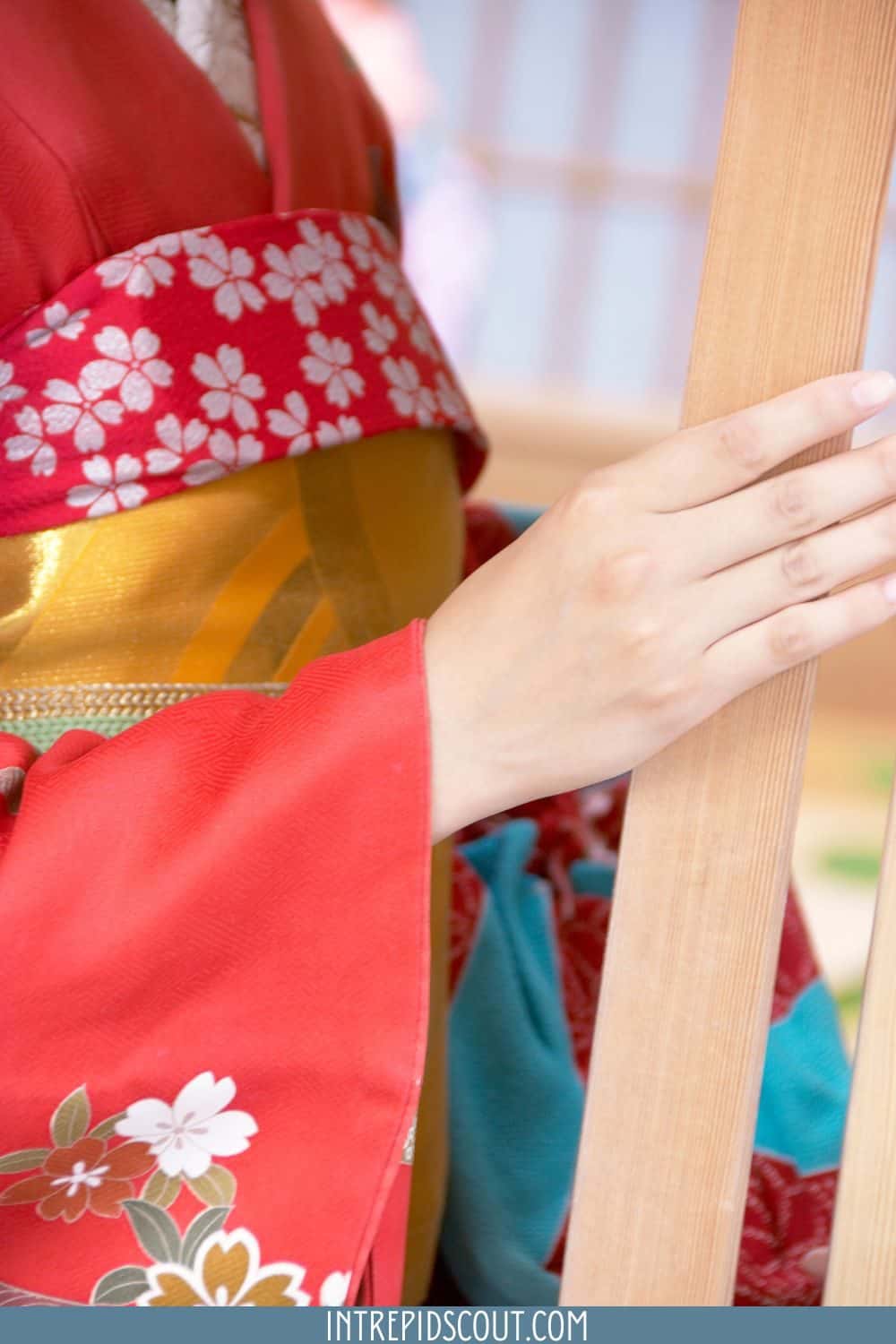
Naga-machi Buke Yashiki District located in Kanazawa is the only samurai district still in existence in Japan.
To Find Out More About It, Make Sure to Read: Perfect ONE DAY in KANAZAWA – 7 Things to Do (BEST TRIP from Tokyo, Kyoto, or Osaka)
Quotes About Japan and Food
241. “In Japan, food filters into every aspect of the culture.” — Bee Wilson
242. “Dairy Chiko, in the basement of Nakano Broadway, is a surrealist ice cream shop known for octuple-decker soft-serve cones. You can also order a smaller cone with less than one billion calories, but the draw at Dairy Chiko is watching how other people eat their towering cones of vanilla, yuzu, milk tea, matcha, ramune, orange, strawberry, and chocolate (flavors may vary). Walking while eating is taboo in Japan, and Dairy Chiko has no seating area, so people loiter near the stand, two to a cone, drawing spoons up the sides of the ice cream, trying to forestall the inevitable. Old ladies, meanwhile, usually order a small matcha cone and eat it with a spoon, avoiding the shame of a green milk mustache. Near Dairy Chiko is a cafe with a public seating area and a very angry-looking drawing of an eight-layer cone with the international NO symbol superimposed on it.” — Matthew Amster-Burton
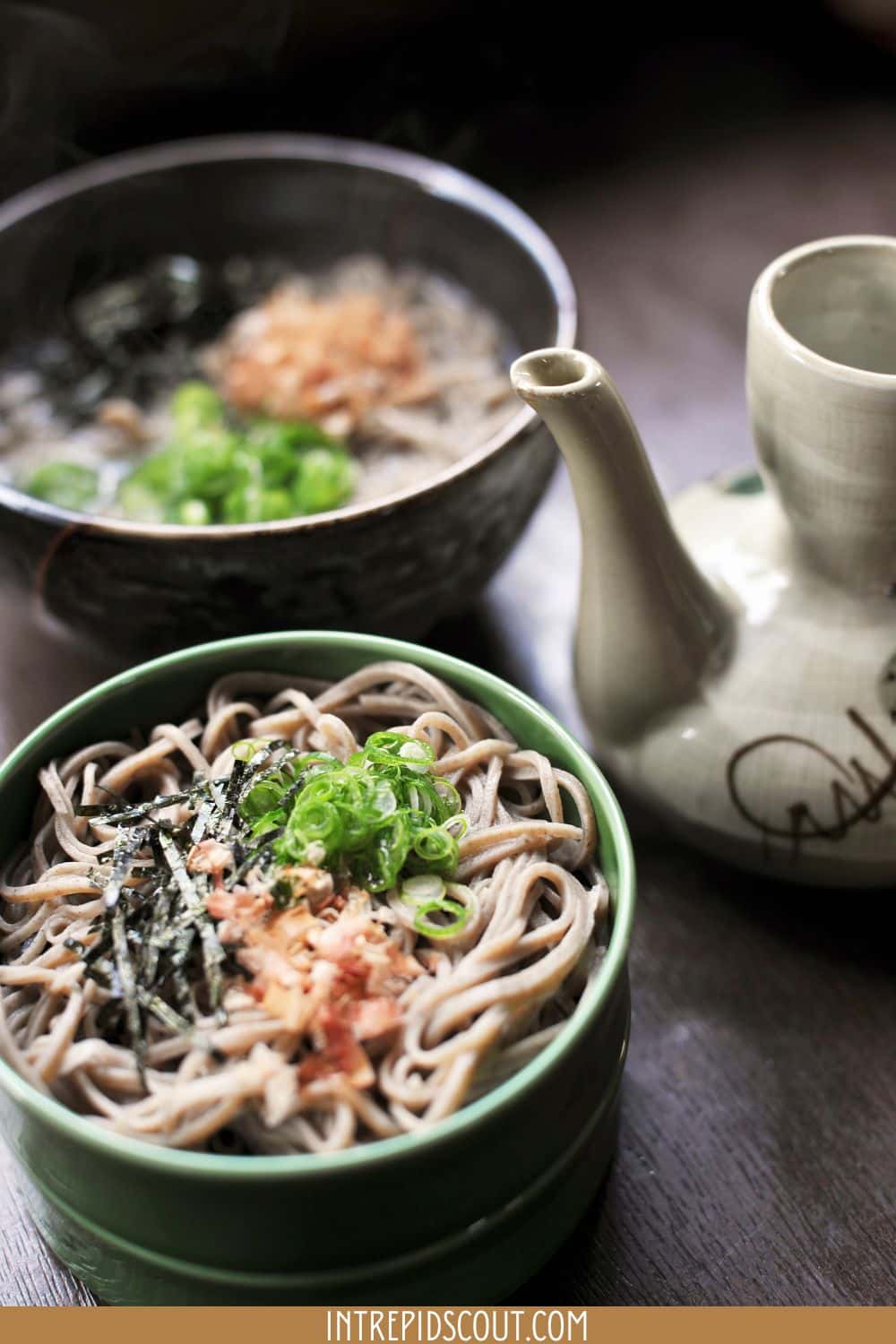
243. “Like families all over Japan, that morning we tucked into a special New Year’s breakfast soup called ozoni. Although recipes vary from region to region, they all contain mochi because the pounded rice dumplings symbolize the breaking of “bread” with the New Year’s deity Toshigami-sama. The rest of the ingredients in the soup, aside from the dashi base, vary according to what is fresh and regionally available. So around Hiroshima, for example, cooks add oysters, prawns, and saltwater eel caught from the nearby Inland Sea to their ozoni, while natives of Tokyo toss in nubbins of chicken, sliced fish cake, and spinach-like greens. For those living in Kyoto, the ozoni always includes lots of sweet white miso.” — Victoria Abbott Riccardi
244. “I was not prepared for the feel of the noodles in my mouth, or the purity of the taste. I had been in Japan for almost a month, but I had never experienced anything like this. The noodles quivered as if they were alive, and leapt into my mouth where they vibrated as if playing inaudible music.” — Ruth Reichl
245. “There are signs that the Japanese themselves consider their excellent cuisine as an essential part of what it means to be Japanese.” — Bee Wilson
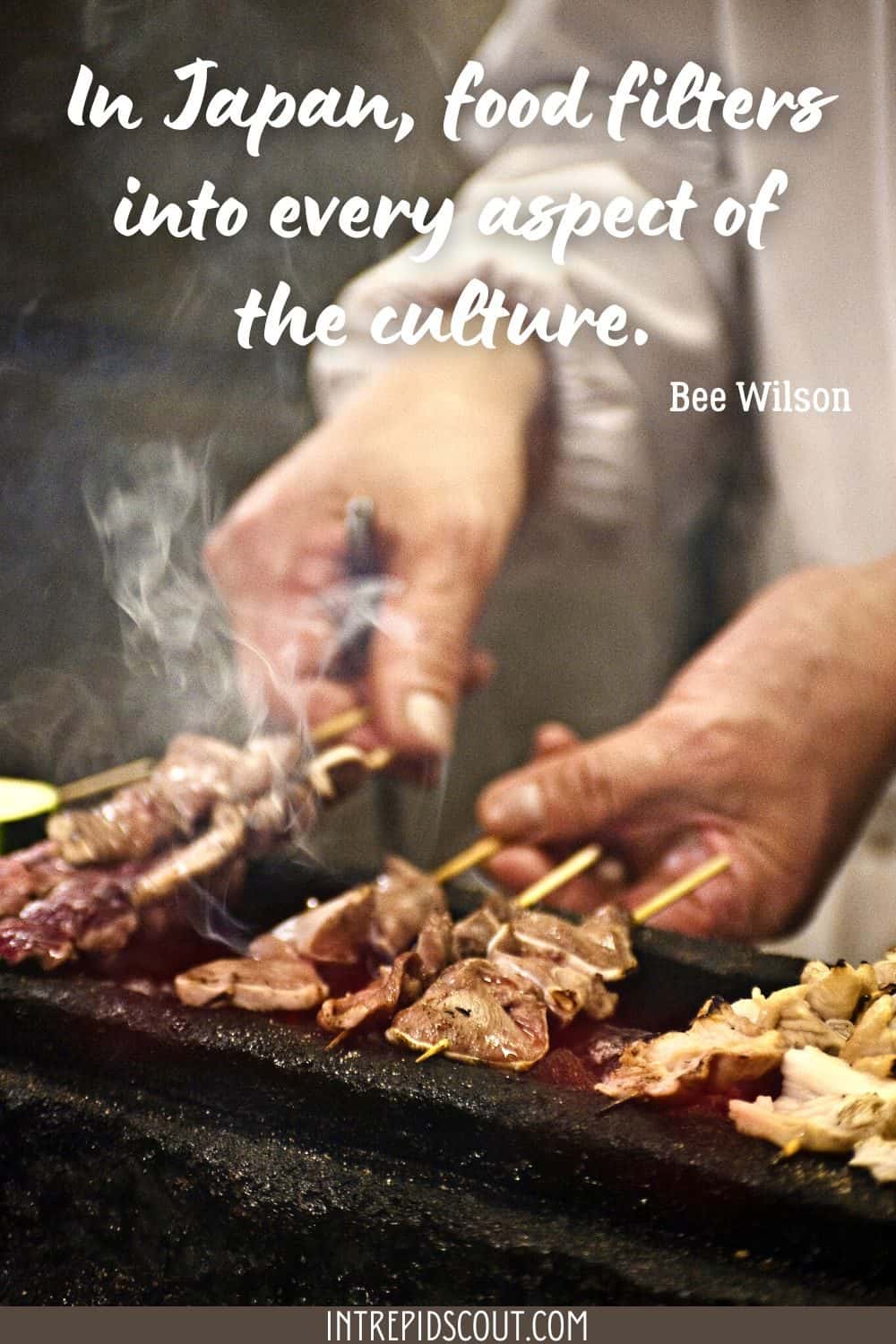
Yakitori / Quotes About Japan and Food
246. “You’ll find that a lot of traditional sweets will include Anko – sweet red bean – and they are quite delicious. My favourite is Taiyaki – a fish-shaped sweet pancake, typically filled with Anko, but often with other fillings like chocolate, custard, or green tea cream. When they’re fresh and warm they are so amazing.” — Abby Denson
247. “Japan isn’t meat-crazed in the same way as the USA, but when the Japanese want meat, they want it as marbled as the Parthenon. The most popular topping for ramen is pork belly, streaked with fat, rolled up like pancetta and braised for hours in pork broth until fall-apart tender, then sliced into a perfect round.” — Matthew Amster-Burton
248. “Maitake Mushrooms are known in Japan as the dancing mushroom. According to a Japanese legend, a group of Buddhist nuns and woodcutters met on a mountain trail, where they discovered a fruiting of maitake mushrooms emerging from the forest floor. Rejoicing at their discovery of this delicious mushroom, they danced to celebrate.” — Paul Stamets
249. “The green sponge turned out to be fu (wheat gluten), a high-protein Buddhist staple food often flavored with herbs and spices. The pink-and-yellow cigarette lighters turned out to be yogurts. The lime-green yo-yos were rice taffy cakes bulging with sweet white bean paste.
As for the vermilion-colored mollusks, they were a kind of cockle called blood clams (or arc shell) and, according to Tomiko, “delicious as sushi.” The jumbo green sprouts came from the daikon radishes and were “tasty in salads.” And the pebbly-skinned yellow fruit was yuzu, an aromatic citrus with a lemony pine flavor that was “wonderful in soup.” — Victoria Abbott Riccardi
250. “Japan has somehow managed to achieve the ideal attitude to eating: an obsession with culinary pleasure that is actually conducive to health.” — Bee Wilson
251. “My husband and I went to Japan for our honeymoon, and you look at, like the presentation of the food, and it’s ridiculous. It looks like a Mondrian painting or something. Everything looks like a bunch of little hello kitty erasers when you eat a little bento box in Japan. It is so precise and beautiful and processed and neat.” – Ali Wong
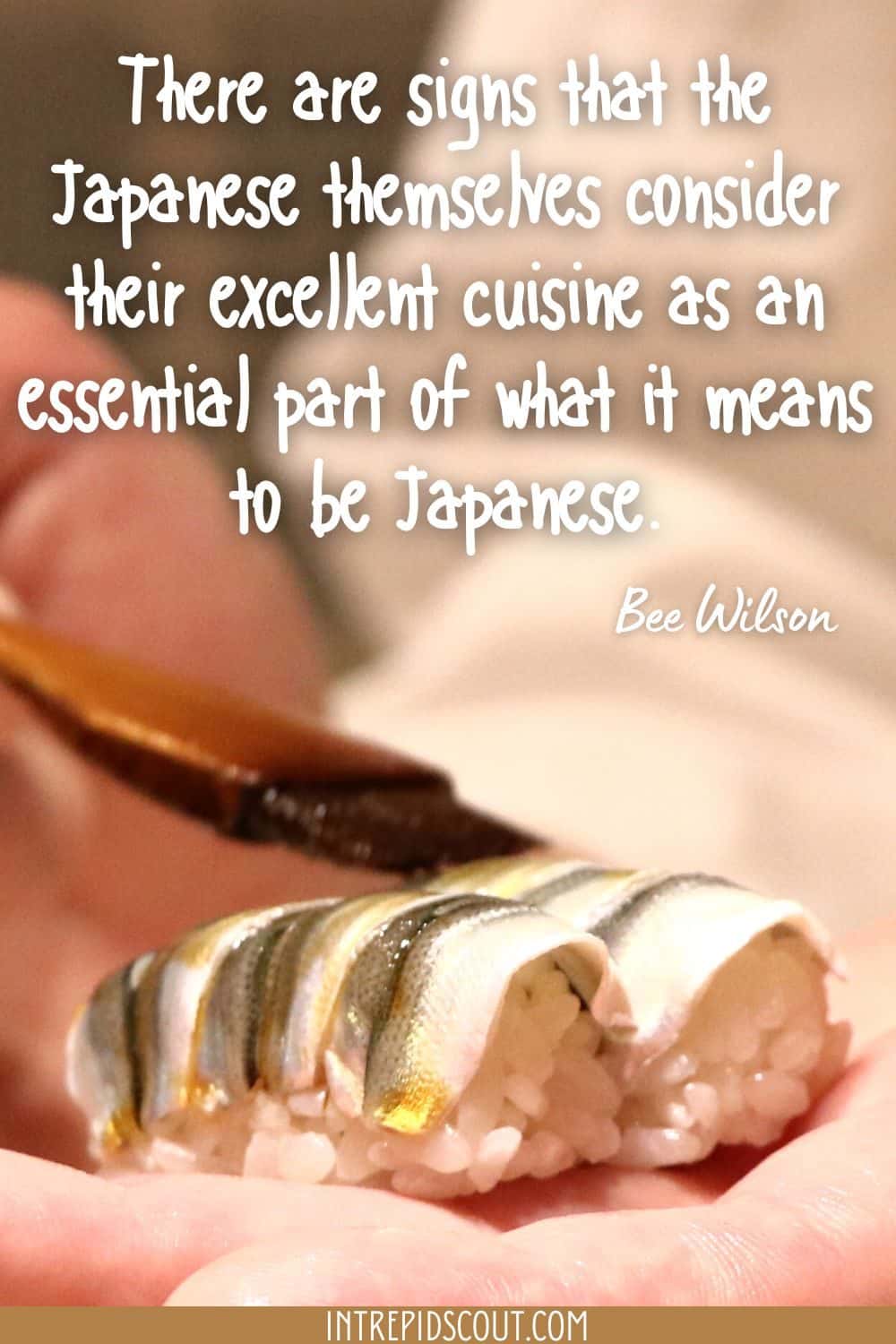
252. “Of all the countries Fairchild had visited, Japan struck him as the most advanced on matters of horticulture. He learned about Japanese miniature gardens, the art of Japanese papermaking, and the superior qualities of Japanese fruits and vegetables that didn’t grow anywhere else in the world. Wealthy people introduced him to foods of affluence, like raw fish, seaweed, and a bean cheese they called tofu. He thought it impossible to eat with two narrow sticks held in one hand, but after a few tries, he got the feel for it.
It was in Japan that Fairchild picked up a yellow plum known as a loquat and an asparagus-like vegetable called udo. And a so-called puckerless persimmon that turned sweet in sake wine casks. One of the most unrecognized discoveries of Fairchild, a man drawn to edible fruits and vegetables, was zoysia grass, a rich green lawn specimen attractive for the thickness of its blades and its slow growth, which meant it required infrequent cutting.
And then there was wasabi, a plant growing along streambeds in the mountains near Osaka. It had edible leaves, but wasabi’s stronger quality was its bitter root’s uncanny ability to burn one’s nose. Wasabi only lasted in America until farmers realized that its close relative the horseradish root grew faster and larger and was more pungent than the delicate wasabi (which tends to stay pungent only fifteen minutes after it’s cut). Small American farms still grow Fairchild’s wasabi, but most of the accompaniment to modern sushi is in fact horseradish—mashed, colored, and called something it’s not.” — Daniel Stone
253. “Japan shows the extent to which food habits evolve.” — Bee Wilson

Omurice / Quotes About Japan and Food
254. “I often look ridiculous in Japan. There’s really no way to eat in Japan, particularly kaiseki in a traditional ryokan, without offending the Japanese horribly. Every gesture, every movement is just so atrociously wrong, and the more I try, the more hilarious it is.” — Anthony Bourdain
255. “Almost the only places in the world that have lower obesity averages than Japan are countries such as Ethiopia or North Korea where there is widespread hunger and food itself is scarce.” — Bee Wilson
256. “Finally, let’s talk about those Kit Kat bars. There is no flavor that can be embodied in Kit Kat form and sold in Japanese stores. Green tea. Black tea. Miso. Cherry blossom. Soy sauce. Toasted soybean powder (kinako). Chile. Orange. Melon. Only a few are available at any given time, and right now, evil geniuses at Nestlé are coming up with new flavors. I’d like to suggest okonomiyaki flavor, which would consist of a bag of assorted flavors (ginger, squid, mountain yam, egg) that could be combined in the proportions of your choice, just like a real okonomiyaki. Sauce and Kewpie mayo optional.
We bought a SkyTree orange Kit Kat, was a regular orange Kit Kat in a preposterously long box, and the Yubari melon Kit Kat, which tasted exactly like melon, was sold in a fancy gift box, and cost $200. Two-thirds of that is true.” — Matthew Amster-Burton
257. “Changing the way you eat is hard, but it can be done. Look at Japan.” — Bee Wilson
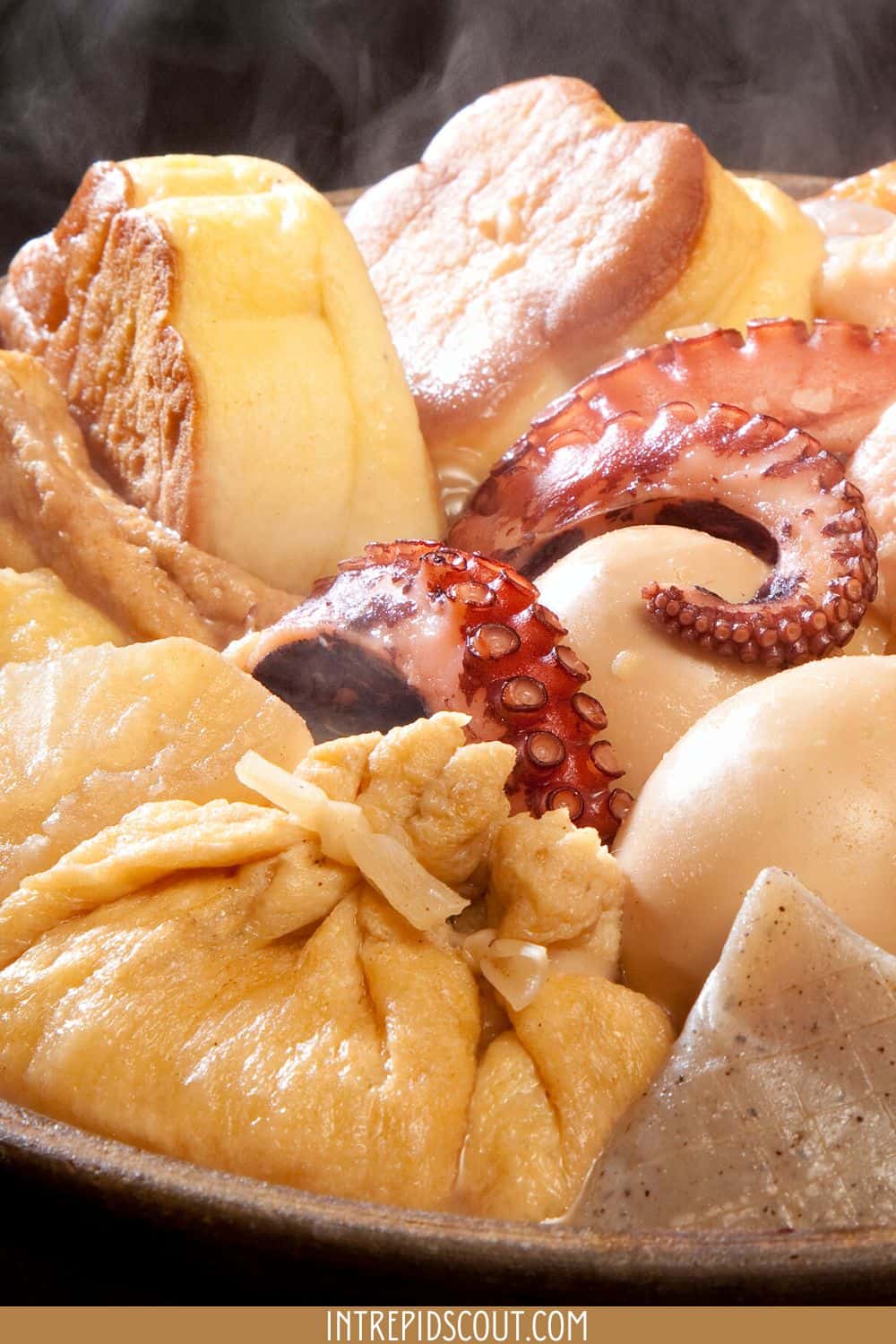
Oden / Quotes About Japan and Food
258. “True, there’s an aisle devoted to foreign foods, and then there are familiar foods that have been through the Japanese filter and emerged a little bit mutated. Take breakfast cereal. You’ll find familiar American brands such as Kellogg’s, but often without English words anywhere on the box. One of the most popular Kellogg’s cereals in Japan is Brown Rice Flakes. They’re quite good, and the back-of-the-box recipes include cold tofu salad and the savory pancake okonomiyaki, each topped with a flurry of crispy rice flakes. Iris and I got mildly addicted to a Japanese brand of dark chocolate cornflakes, the only chocolate cereal I’ve ever eaten that actually tastes like chocolate. (Believe me, I’ve tried them all.).” — Matthew Amster-Burton
259. “I’ve long been a fan of Hi-Chew, the Japanese fruit chews, for their resilient texture and uncannily accurate fruit flavors: sour cherry, apple, grape, pickled plum, and especially mango, which is closer to the flavor of an actual tropical mango than most imported mangoes.” — Matthew Amster-Burton
260. “No, Ramen is not good for you. But in Japan, our favourite thing to do after drinking all night, especially in Sapporo where it is freezing cold, is to go to the Ramen place at two, three in the morning.” — Cary Fukunaga

Oyako Don / Quotes About Japan and Food
261. “Rice paddies climb the hillsides in wet, verdant staircases, dense woodlands trade space with geometric farmscapes, tiny Shinto shrines sprout like mushrooms in Noto forests. Villages seem to materialize from nowhere- wedged into valleys, perched atop hills, finessed into coastal corners. Pull over, climb out of your car, breathe deep for a taste of the finest air that will ever enter your lungs: green as a high mountain, salty and sweet, with just a whisper of decay in the finish.
Noto gained its reputation as the Kingdom of Fermentation because of this air. For most of its history, Noto was cut off from the rest of Japan, forced into a subsistence model that in many ways endures today. That was possible not only because of the bounty of Noto’s fertile environment of trees, grasslands, fresh water, and sea, but because the air is rich with humidity that encourages the growth of healthy bacteria, the building blocks of fermentation.” — Matt Goulding
262. “Japan has somehow managed to achieve the ideal attitude to eating: an obsession with culinary pleasure that is actually conductive to health.” — Bee Wilson
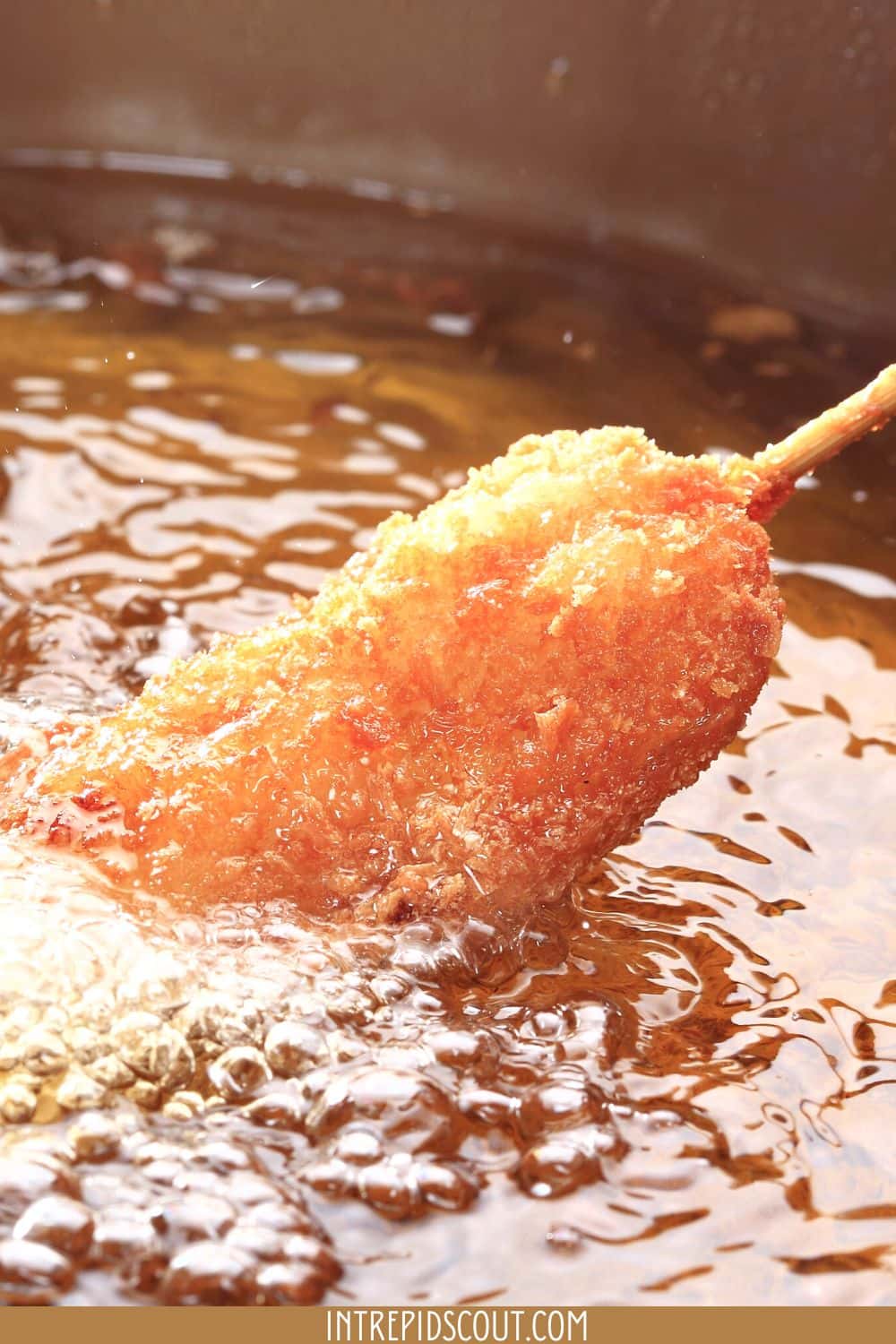
Kushikatsu / Quotes About Japan and Food
263. “The attitude toward food has also been affected by the two great religions that the Japanese follow. The majority of Japanese participate in two religions: Shinto and Buddhism. Shinto was the sole religion of the Japanese until the sixth century. It is a religion that relies heavily on ideas of purity, as well as on the presentation of food offerings to the deities. Buddhism, which complements Shinto and deals largely with the afterlife, has two ideas that affect food choice: simplicity and a reluctance to take life. These two religious orientations, which all Japanese share to a certain degree, reinforce one another in the realm of food.” — Michael Ashkenazi
264. “We were in Japan once where they had 30 kinds of green tea. I thought there was one.” — Billy Corgan
265. “Gyokuro is one of the highest quality (and most expensive) green teas in Japan. The major difference between the processes of growing gyokuro and regular green tea is that the gyokuro bushes are shaded with clod or reed screens for several weeks before harvesting, which gives the leaves a sweeter flavor and more intensely green color.” — Tetsu Kariya
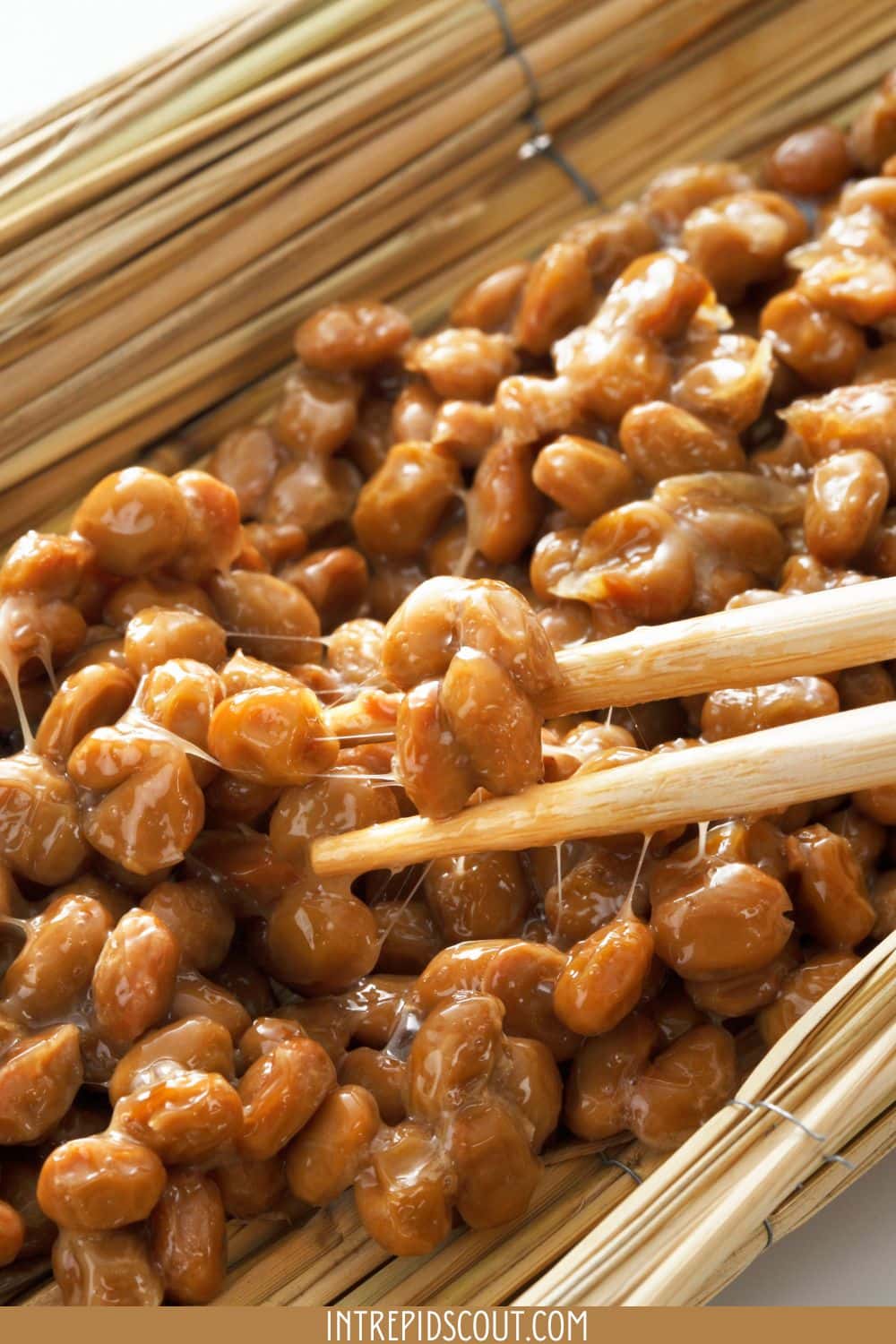
Natto / Quotes About Japan and Food
266. “The Japanese must be doing something right in the way they eat, given that they live longer on average than people form any other nation.” — Bee Wilson
267. “There was also a peculiarly Japanese adaptation of things foreign. I first noticed this one rainy November evening when I stopped by Rub-a-Dub, a funky reggae watering hole located near the Pontocho, the city’s former red-light district now known for its restaurants, bars, and geisha teahouses. After ordering one of the bar’s famous daiquiris, I anticipated receiving an American-style rum-in-your-face daiquiri with an explosive citrus pucker. Instead, I was handed a delicate fruity drink that tasted more like a melted lime Popsicle. Over time I noticed other items had been similarly adapted. McDonald’s offered hamburgers with sliced pineapple and ham to satisfy Japanese women’s notorious sweet tooth. “Authentic” Italian restaurants topped their tomato-seafood linguini with thin strands of nori seaweed, instead of grated Parmesan. And slim triangles of “real” New York-style chizu-keki (cheesu-cakey) in dessert shops tasted like cream cheese-sweetened air.” — Victoria Abbott Riccardi
268. “Umami is the savoury meatiness in seaweed and miso and soy sauce. It is, to a large extent, the concept that enables Japanese cuisine to be healthy and attractive at the same time.” — Bee Wilson
269. “The concept of “delicious” was born in Japan in 1908 when a chemist called Ikeda discovered a “fifth taste” called umami that was neither bitter nor salty nor sweet nor sour but something more wonderful and compelling than any of these.” — Bee Wilson
270. “Noodles arrived in Japan with Buddhist monks from China in the Middle Ages, but until the twentieth century they tended to be made from buckwheat, or a mix of wheat and rice.” — Bee Wilson
271. “Japanese cuisine did not change all at once but in stages.” — Bee Wilson
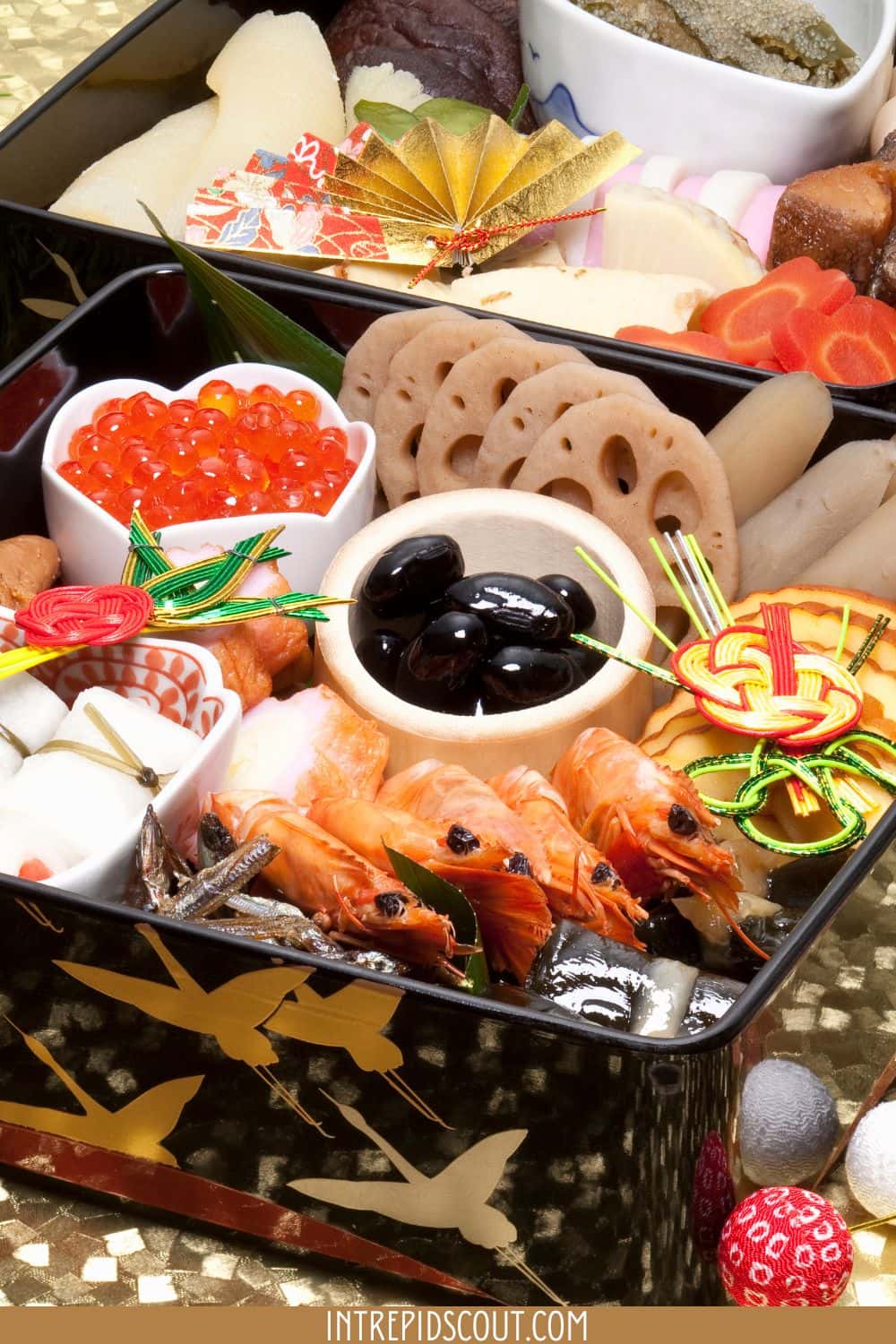
Osechi Ryori / Quotes About Japan and Food
272. “The real game, as I soon discover, is donburi. Donburi, often shortened to don, means “bowl,” and the name encapsulates a vast array of rice bowls topped with delicious stuff: oyakodon (chicken and egg), unadon (grilled eel), tendon (tempura). As nice as meat and tempura and eel can be, the donburi of yours and mine and every sensible person’s dreams is topped with a rainbow bounty of raw fish. Warm rice, cool fish, a dab of wasabi, a splash of soy- sushi, without the pageantry and without the price tag.
At Kikuyo Shokudo Honten you will find more than three dozen varieties of seafood dons, including a kaleidoscopic combination of uni, salmon, ikura (salmon roe), quail eggs, and avocado. I opt for what I’ve come to call the Hokkaido Superhero’s Special: scallops, salmon roe, hairy crab, and uni. It’s ridiculous hyperbole to call a simple plate of food life changing, but as the tiny briny eggs pop and the sweet scallops dissolve and the uni melts like ocean Velveeta, I feel some tectonic shift taking place just below my surface.” — Matt Goulding
273. “Changing the way you eat is hard, but it can be done. Look at Japan.” — Bee Wilson
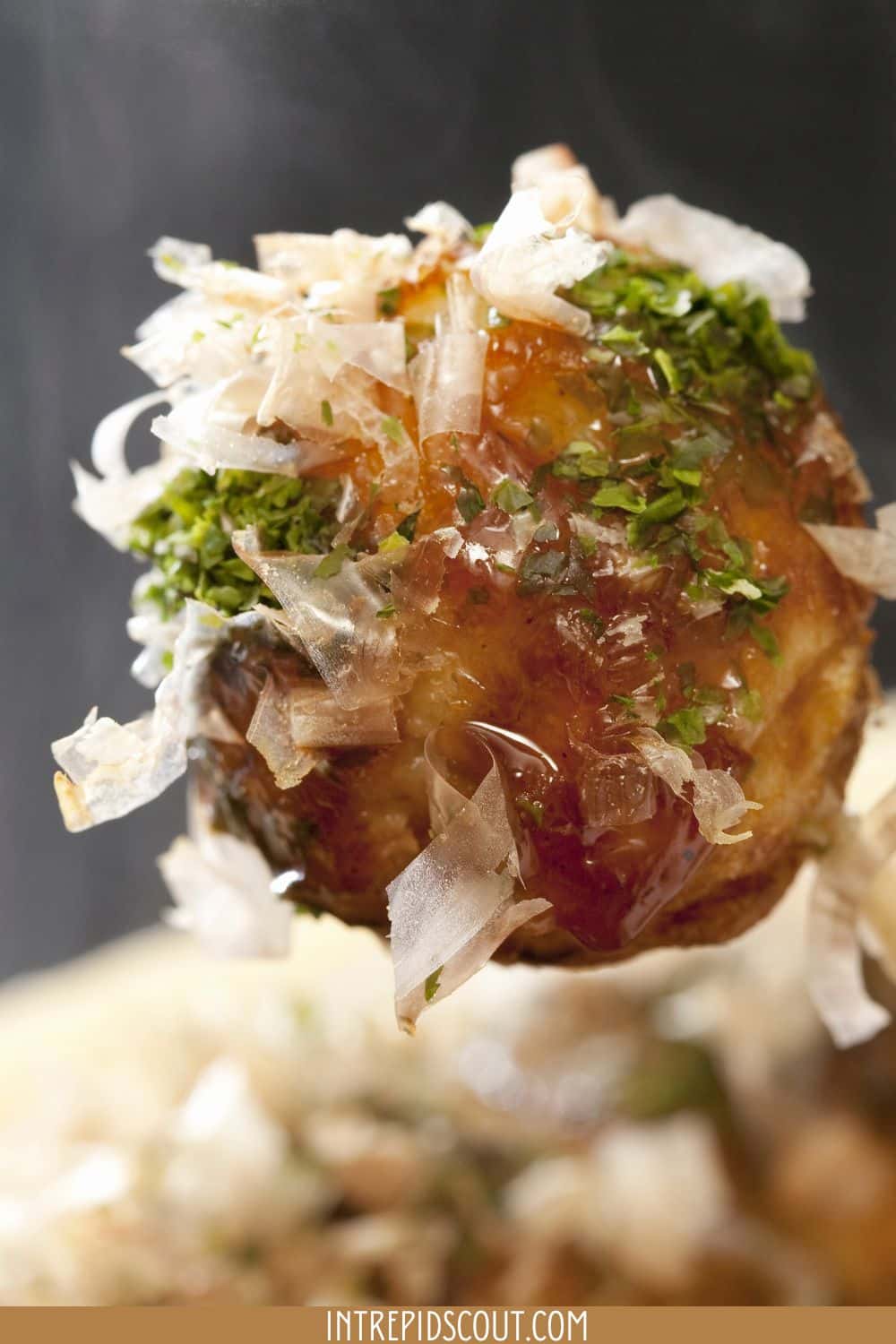
Tako-yaki at Kuromon Market in Osaka / You Might Like: WHAT to EAT at Osaka KUROMON MARKET – 10 Culinary Experiences You Can’t Miss / Quotes About Japan and Food
274. “The real game, as I soon discover, is donburi. Donburi, often shortened to don, means “bowl,” and the name encapsulates a vast array of rice bowls topped with delicious stuff: oyakodon (chicken and egg), unadon (grilled eel), tendon (tempura). As nice as meat and tempura and eel can be, the donburi of yours and mine and every sensible person’s dreams is topped with a rainbow bounty of raw fish. Warm rice, cool fish, a dab of wasabi, a splash of soy- sushi, without the pageantry and without the price tag.
At Kikuyo Shokudo Honten you will find more than three dozen varieties of seafood dons, including a kaleidoscopic combination of uni, salmon, ikura (salmon roe), quail eggs, and avocado. I opt for what I’ve come to call the Hokkaido Superhero’s Special: scallops, salmon roe, hairy crab, and uni. It’s ridiculous hyperbole to call a simple plate of food life changing, but as the tiny briny eggs pop and the sweet scallops dissolve and the uni melts like ocean Velveeta, I feel some tectonic shift taking place just below my surface.” — Matt Goulding
275. “Changing the way you eat is hard, but it can be done. Look at Japan.” — Bee Wilson
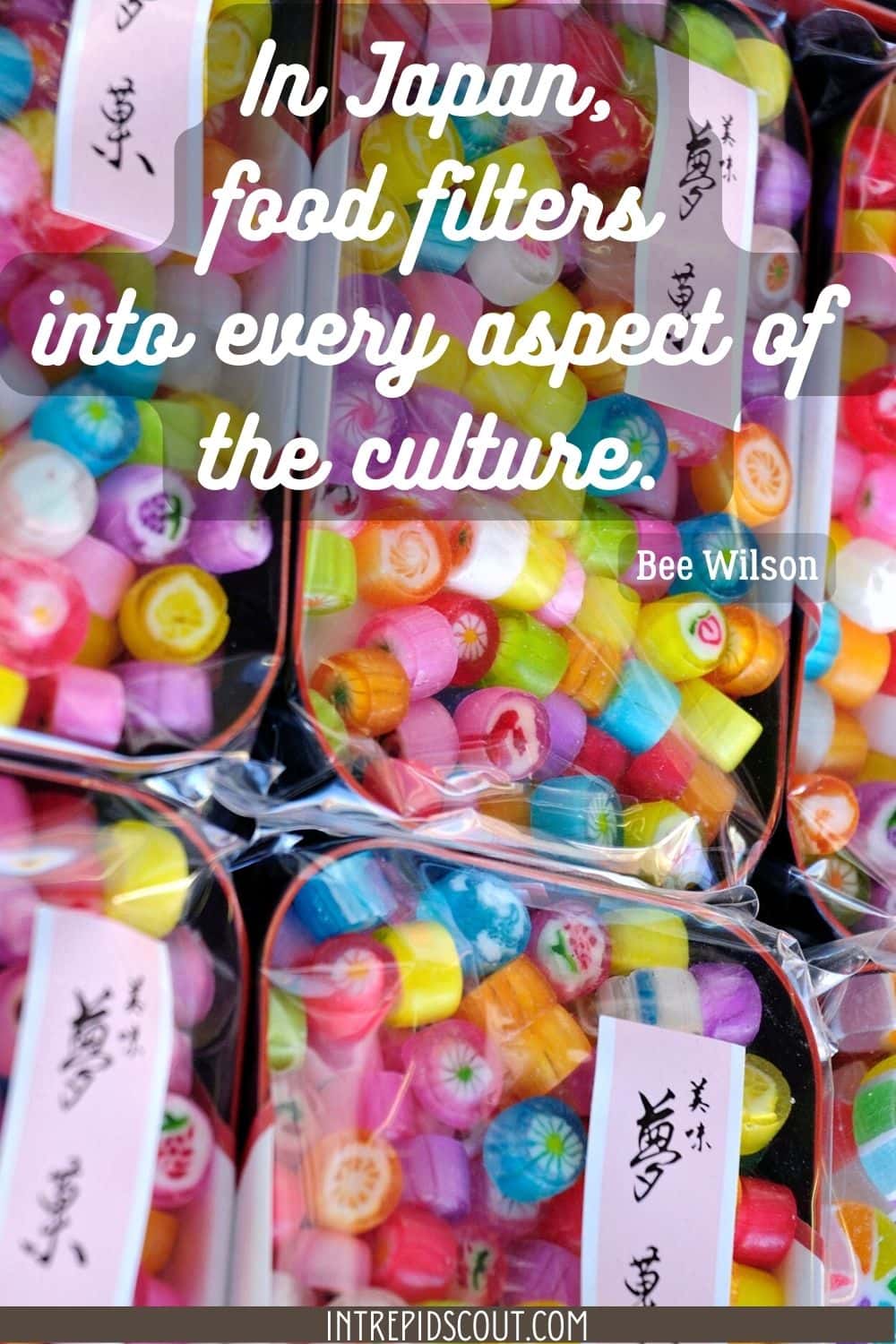
Intrepid Scout's Favorite Quotes and Captions About Japan
Hi! Here are my favorite quotes about Japan. Let me know which ones are your favorite!
- “Japan’s very interesting. Some people think it copies things. I don’t think that anymore. I think what they do is reinvent things. They will get something that’s already been invented and study it until they thoroughly understand it. In some cases, they understand it better than the original inventor.” — Steve Jobs
- “I love Japan. I love the collision of the modern and ancient worlds coming together in that place. It’s so high-tech and cool.” — John Lasseter
- “Experience nature, and in doing so learn about yourself.” — Japanese Proverb
- “The impact Japan has had on the modern world is enormous. It occupies less than 1/300 of the planet’s land area, yet at the height of its economic growth in the 1980s it wielded one-sixth of the planet’s economic might, and remains the third ranking economy in the world.” — Kenneth Henshall
- “In the 18th century Japan had the world’s largest city, and world’s most literate population.” — Kenneth Henshall
- “Tokyo may have more money and Kyoto more culture; Nara may have more history and Kobe more style. But Osaka has the biggest heart.” — Vikas Swarup
- “As my grandmother discovered long ago, the Japanese excel in cultivating nature. Their gardens come in numerous styles, including paradise gardens, dry-landscape gardens, stroll gardens, and tea gardens. Although each type has its own goal, tray all share the same principle: nature is manipulated to create a miniature symbolic landscape.
A paradise garden is meant to evoke the Buddhist paradise through the use of water dotted with stone “islands.” Dry-landscape gardens, usually tucked away in Zen temples, use dry pebbles and stones to create minimalist views for quiet contemplation. Stroll gardens offer changing scenes with every step, a pool of carp here, a mossy trail there, and a small bridge to link them both, while a tea garden provides a serene path to take you from the external world to the spiritual one of the teahouse.” — Victoria Abbott Riccard
- “You cannot call yourself a true geisha until you can stop a man in his tracks with a single look.” – Arthur Golden
- “Remember Chiyo, geisha are not courtesans, and we’re not wives. We sell our skills, not our bodies. We create another secret world, a place only of beauty. The very word “geisha” means artist, and to be a geisha is to be judged as a moving work of art.” — Arthur Golden
- “For me, creation can only come out of a certain kind of unhappiness. They say in Japan, this thing like the hungry spirit – the hungry mind – is what gets you going forward.” — Rei Kawakubo
More Posts with Quotes and Captions
235 Terrific Family Trip Captions and Quotes (Perfect for Vacation Photos)
299 Gorgeous Tropical Vacation Quotes and Captions (Dreaming About Summer)
247 Autumn Changing Leaves Captions and Quotes (Fall in Love with Autumn)
16 Poems About Travel to Inspire You to See the World
232 Jack-o’-lantern Pumpkin Captions and Quotes for Instagram
218 Ultimate Lake Captions and Quotes for Instagram (+Hashtags)
265 Magical Golden Hour Captions and Quotes
298 Adorable Dog Captions and Quotes (Paws-itively Howl-iday)
Did You Like Quotes About Japan?
Why Not Save It to Your Pinterest Board!
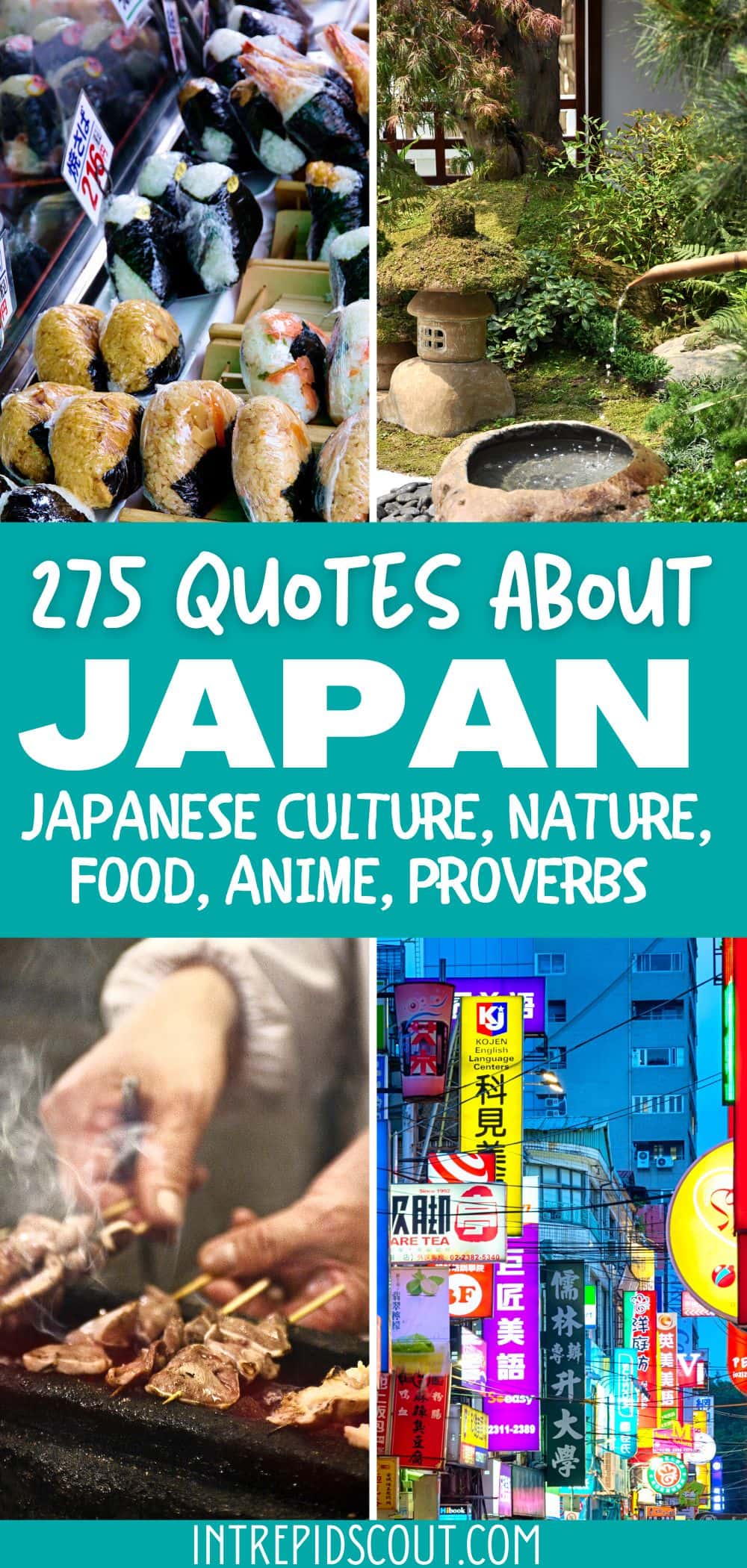
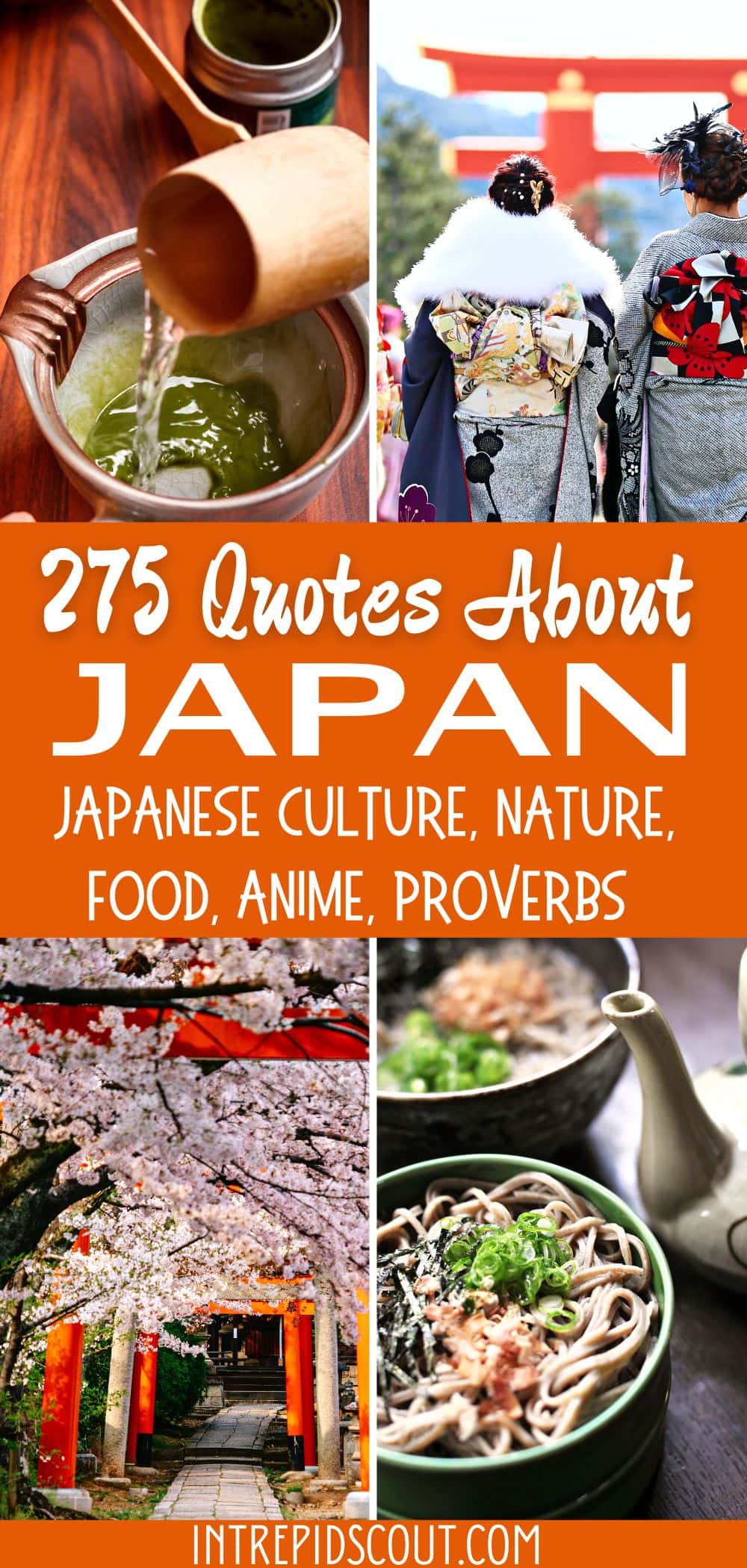
Now, It Is Your Turn, I Would Like to Hear Back from You!
What is your favorite caption or quote about Japan?
Please let me know and I will add it to the list!
